track 'n trace
ElsDeClercq
Lies
Alen
Peter Koeck
Manuel Lehmann
EvelyneStappaerts
Leen Temmerman
Ann Vandemaele

ElsDeClercq
Lies
Alen
Peter Koeck
Manuel Lehmann
EvelyneStappaerts
Leen Temmerman
Ann Vandemaele
Els De Clercq
Lies Alen
Peter Koeck
Manuel Lehmann
Evelyne Stappaerts
Leen Temmerman
Ann Vandemaele
Via www.diddit.be heb je toegang tot het onlineleerplatform bij Track ‘n’ Trace 6 Activeer je account aan de hand van de onderstaande code en accepteer de gebruiksvoorwaarden.
LET OP: ACTIVEER DEZE LICENTIE
PAS VANAF 1 SEPTEMBER;
DE LICENTIEPERIODE START
VANAF ACTIVATIE EN IS 365 DAGEN GELDIG.
!Fotokopieerapparaten zijn algemeen verspreid en vele mensen maken er haast onnadenkend gebruik van voor allerlei doeleinden. Jammer genoeg ontstaan boeken niet met hetzelfde gemak als kopieën. Boeken samenstellen kost veel inzet, tijd en geld.
De vergoeding van de auteurs en van iedereen die bij het maken en verhandelen van boeken betrokken is, komt voort uit de verkoop van die boeken.
In België beschermt de auteurswet de rechten van deze mensen. Wanneer u van boeken of van gedeelten eruit zonder toestemming kopieën maakt, buiten de uitdrukkelijk bij wet bepaalde uitzonderingen, ontneemt u hen dus een stuk van die vergoeding. Daarom vragen auteurs en uitgevers u beschermde teksten niet zonder schriftelijke toestemming te kopiëren buiten de uitdrukkelijk bij wet bepaalde uitzonderingen. Verdere informatie over kopieerrechten en de wetgeving met betrekking tot reproductie vindt u op www.reprobel.be.
Ook voor het digitale lesmateriaal gelden deze voorwaarden. De licentie die toegang verleent tot dat materiaal is persoonlijk. Bij vermoeden van misbruik kan die gedeactiveerd worden. Meer informatie over de gebruiksvoorwaarden leest u op www.diddit.be.
© Uitgeverij VAN IN, Wommelgem, 2024
De uitgever heeft ernaar gestreefd de relevante auteursrechten te regelen volgens de wettelijke bepalingen. Wie desondanks meent zekere rechten te kunnen doen gelden, wordt verzocht zich tot de uitgever te wenden.
Credits: p. 146 Paracetamol © Shutterstock / Maddie Red; Imodium, Allegra, Band-aid © Shutterstock / Keith Homan; Bepanthen © Shutterstock / Fahroni
Eerste druk 2024 Vormgeving en opmaak: Vrijdag Grafis ISBN 978-94-647-0482-2 Vormgeving cover: Wendy De Haes D/2024/0078/154
Zetwerk: Banananas Art. 605784/01
Grafiek p. 181: Geert Verlinde
Tekeningen: Lise Vanlerberghe NUR 110
Welkom in Track ‘n’ Trace. We leggen graag even uit hoe je met dit boek aan de slag gaat.
Het leerwerkboek bestaat uit zes units en elke unit is op dezelfde manier opgebouwd.






Op de voorpagina van elke unit vind je terug wat je zult leren om de taak aan het einde van de unit, de Check Out, goed uit te voeren. Deze voorpagina toont je de weg die je zult afleggen.
In de Check In maak je kennis met het thema van de unit.

CHECK 1, p. 43
De Main Track is opgebouwd uit verschillende Steps. In elke Step leer je een afzonderlijke bouwsteen om de taak aan het einde van de unit te kunnen maken.







Aan het einde van elke Step zie je een verwijzing naar een Check. Die Check vind je terug in het onderdeel On Different Tracks. In On Different Tracks ga je na of je de bouwsteen al onder de knie hebt.
Voor je start met On Different Tracks is er een Summary : een overzicht van de grammatica, woordenschat, strategieën en veelgebruikte uitdrukkingen.














Je leerkracht zal je zeggen wanneer je de Check, die bij een bepaalde Step hoort, kunt maken in On Different Tracks. Afhankelijk van je resultaat kun je – helemaal volgens jouw tempo en niveau – de leerstof nog even herhalen, extra oefenen of meer verdiepende oefeningen maken.
Je kunt je traject in On Different Tracks helemaal zelfstandig doorlopen, met een partner of samen met de klas. Aan de hand van de handige scorewijzers weet je meteen welke oefeningen je moet maken.
Reflection
3 Reflect on your task by filling in the checklist.
Als je alle bouwstenen in de Main Track hebt doorlopen en ze voldoende hebt ingeoefend in On Different Tracks, dan ben je zeker klaar voor de Check Out, de taak aan het einde van de unit. Hier kun je alles wat je geleerd hebt in de unit toepassen.
Elke Check Out gebruikt de OVUR-strategie:
Checklist: describing your holiday Yes I think soNo
1 Preparation
• I described my friends’ holiday activities.
• I wrote my note or postcard in draft first.
2 Content
• I wrote about 75 words.
• I included all the necessary elements.
• I respected the rules for writing an informal note or postcard.
3 Language use
We willen graag dat je vorderingen maakt en dat je reflecteert op je taken en leert uit feedback.
• I used the correct vocabulary to describe the activities and the weather.
• I used the past simple tense correctly.
• I paid attention to the structure of my sentences.
• I checked my spelling and punctuation.
Trace your steps on diddit.
Ten slotte kun je na elke unit je online portfolio op diddit individueel of samen met je leerkracht invullen. Zijn er dingen die nog niet zo goed lopen, dan krijg je meteen ook digitale oefeningen bij je werkpunten.
In de loop van elke unit word je ondersteund door een aantal hulpmiddelen.
Grammaticale regels staan in de Main Track altijd in een kader, met een duidelijk voorbeeld erbij. Hier vul je zelf een aantal basiskenmerken van de regel in. Hoe je de grammatica gebruikt, vind je vervolgens terug in de Summary. Aan de hand van nog meer voorbeelden en illustraties schetsen we de context waarin je de grammatica kunt gebruiken.
Omdat leerstrategieën ontzettend belangrijk zijn, vind je die ook in de Main Track terug wanneer je ze nodig hebt. Elke leerstrategie kun je via een handig schema of overzicht nog eens rustig bekijken in de Summary, ook als je er later nog eens gebruik van wilt maken.










Omdat je Engels wilt gebruiken in een realistische context, reiken we je graag ook veelgebruikte uitdrukkingen aan.









De woordenschat van elke unit geven we je graag mee via een beeldwoordenboek of via een overzichtelijke woordenlijst met ruimte om je eigen woorden en zinnen toe te voegen.



it is the sight of her looking like some preposterous zombie that sends a hummingbird of panic ricocheting through me.

I need to find Teddy! Where is he? I spin around, suddenly frantic, like the time I lost him for ten minutes at the grocery store. I’d been convinced he’d been kidnapped. Of course, it had turned out that he’d wandered over to inspect the candy aisle. When I found him, I hadn’t been sure whether to hug him or yell at him.
I run back toward the ditch where I came from and I see a hand sticking out. “Teddy! I’m right here!” I call. “Reach up. I’ll pull you out.” But when I get closer, I see the metal glint of a silver bracelet with tiny cello and guitar charms. Adam gave it to me for my seventeenth birthday. It’s my bracelet. I was wearing it this morning. I look down at my wrist. I’m still wearing it now.
I edge closer and now I know that it’s not Teddy lying there. It’s me. The blood from my chest has seeped through my shirt, skirt, and sweater, and is now pooling like paint drops on the virgin snow. One of my legs is askew, the skin and muscle peeled away so that I can see white streaks of bone. My eyes are closed, and my dark brown hair is wet and rusty with blood.
Vaardigheden zijn een belangrijk onderdeel bij het leren van een nieuwe taal. Daarom geven we bij elke oefening aan op welke vaardigheid je het meest aan het oefenen bent: watching, listening, reading, speaking, spoken interaction, writing, written interaction
I spin away. This isn’t right. This cannot be happening. We are a family, going on a drive. This isn’t real. I must have fallen asleep in the car. No! Stop. Please stop. Please wake up! I scream into the chilly air. It’s cold. My breath should smoke. It doesn’t. I stare down at my wrist, the one that looks fine, untouched by blood and gore, and I pinch as hard as I can.
I don’t feel a thing.
listening 3 / Fijn en handig voor onderweg

watching written INTERACTION
I have had nightmares before—falling nightmares, playing-a-cello-recital-withoutknowing-the-music nightmares, breakup-with-Adam nightmares—but I have always been able to command myself to open my eyes, to lift my head from the pillow, to halt the horror movie playing behind my closed lids. I try again. Wake up! I scream. Wake up!


Wakeupwakeupwakeup! But I can’t. I don’t.
Then I hear something. It’s the music. I can still hear the music. So I concentrate on that. I finger the notes of Beethoven’s Cello Sonata no. 3 with my hands, as I often do when I listen to pieces I am working on. Adam calls it “air cello.” He’s always asking me if one day we can play a duet, him on air guitar, me on air cello.
“When we’re done, we can thrash our air instruments,” he jokes. “You know you want to.”
I play, just focusing on that, until the last bit of life in the car dies, and the music goes with it.
It isn’t long after that the sirens come.

Source: If I Stay, Gayle Forman









Did you know?
Cognates and false friends



askew: not in a straight position embankment: a wall of earth or stone built to prevent a river flooding an area to eviscerate: to remove the contents of something frantic: fast and nervous, disordered to ignite: (cause) to catch fire protrusion: something that bulges out, a bulge or bump




3 After reading this introduction, would you be interested in reading the rest of the novel? Why (not)?
Soms krijg je extra uitleg bij een boek, een auteur of een film.
Wanneer er moeilijke woorden voorkomen in het authentieke tekstmateriaal, worden die uitgelegd in de glossary
Step 2 One unforgettable day Talking about possibilities and conditions
1 Read the blurb of Adam Silvera’s They Both Die at the End and discuss these questions.
a Do you think Mateo and Rufus will actually die at the end?
b What kind of adventures do you think Mateo and Rufus will have on their End Day?


– Words that look similar in different languages and have the same meaning are called cognates. They generally come from the same root from an older language. e.g. the words night (English), nuit (French), noche (Spanish), Nacht (German), nacht (Dutch), nag (Afrikaans), nicht (Scots), and many more all come from the same root.


– When two words look similar in different languages but don’t mean the same thing, we call them falsefriends. For example, sensible means reasonable in English but in French and Spanish it means sensitive

5 Look at the underlined words in the sentences. Replace them with a synonym. Conjugate the verbs if necessary. You may use an online dictionary. accountable – achieve – conserve – empower – ensure – foster – provide – reduce – restore –revitalise
1 To make sure we are able to stop using fossil fuels we must encourage innovation by investing in new projects and research.
2 In order to get equality between men and women we have to fight for equal pay for women in every field.
3 Part of promoting the influence of women is making sure that all girls have access to education.
Adam Silvera reminds us that there’s no life without death and no love without loss in this devastating yet uplifting story about two people whose lives change over the course of one unforgettable day.
On September 5, a little after midnight, Death-Cast calls Mateo Torrez and Rufus Emeterio to give them some bad news: They’re going to die today.



Mateo and Rufus are total strangers, but, for different reasons, they’re both looking to make a new friend on their End Day. The good news: There’s an app for that. It’s called the Last Friend, and through it, Rufus and Mateo are about to meet up for one last great adventure—to live a lifetime in a single day.
Source: www.goodreads.com

2 Read the extract and answer the questions.



a Andrea from Death-Cast calls Mateo Timothy. How does Mateo react/feel when he hears this?
In de Did You Know -kaders vind je leuke weetjes en achtergrondinformatie.
b What is Countdowners?
c What/who are Deckers?
d Where is Mateo’s dad when Mateo gets the call from Death-Cast?
e Andrea is the one that delivers the message of Mateo’s fate. Which synonym for ‘official messenger’ is used in the text?
De volgende iconen helpen je ook nog een eind op weg.
f Does Mateo know exactly when he will die, yes or no?
Het luisterfragment dat hierbij hoort, vind je ook online terug. Het beeldfragment dat hierbij hoort, vind je ook online terug.
4 Making inequality smaller is possible by giving women equal access to high-paid jobs.
5 We need to start saving the natural resources of our world that we have been wasting so liberally, because they are not limitless.
g How do you feel about this (type of) text? Can you relate to the characters? Is this the type of book you would like to read? Discuss with a partner.
Als je dit icoon ziet, moet je iets online opzoeken of vind je extra materiaal terug op diddit.
6 After the minimal success of the Millennium Goals, it is necessary to give new life to the existing partnerships within the SDGs.
7 Proper education will give both men and women the opportunity to grow within their community.
8 As a global community, we have to make sure our entire population can live a healthy, active and happy life.
9 Humans have heavily damaged some ecosystems, and it is our responsibility to make sure that we bring them back to how they were.
10 Especially large nations, such as the United States and China, are responsible for setting an

Leerstof kun je inoefenen op jouw niveau.
Je krijgt meteen feedback aan de hand van theoriekaders en instructiefilmpjes.
Je kunt vrij oefenen en de leerkracht kan ook voor jou oefeningen klaarzetten.
Hier vind je de opdrachten terug die de leerkracht voor jou heeft klaargezet.
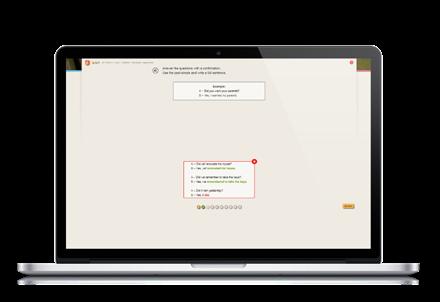


Hier kan de leerkracht toetsen en taken voor jou klaarzetten.
Trace Your Steps: vul hier jouw portfolio in om aan te duiden wat je al beheerst.
Benieuwd hoe ver je al staat met de oefeningen en opdrachten? Hier vind je een helder overzicht van je resultaten.
Hier vind je het lesmateriaal per unit (o.a. audio- en videobestanden). Alle leerbladen uit de Summary zijn hier ook nog eens verzameld.






WOORDTRAINER VAN IN

En waarom de woordenschat niet instuderen met de handige woordtrainerapp van Track ‘n’ Trace 6?












check in
on different tracks
main track
Step 3: gathering information
summary

Step 1: describing brain activity
Step 2: comparing things and actions
check out: making a learning disorder chart trace your steps
1 Watch the video Dear Teacher and answer the questions in the table below.
a What does each child say about what the teacher doesn’t know about them?
b What advice do these children have for their teachers?
c Can you add your own advice? watching







2 Discuss these questions with a partner.
a How do you feel after having watched this video? Write down one keyword and explain why you chose this.
b Do you recognise yourself in any of these children?
• If so, explain who and why.
• If not, do you know anyone who is like any of these children? Do you understand the problems these young people might have at school?
1 / It’s a no-brainer
1 Work with a partner to discuss the statements you will get. Try to reach a conclusion about each statement.
2 You will watch one of the two videos about the brain. Take notes while watching. Can you find proof for the statements in exercise 1 in the video? Then share your findings with your partner.
3 Organise your and your partner’s information in a mind map on a separate piece of paper.
4 Try to answer these questions before reading the text below.
a What type of text are you expecting?
b Look at the title. What do you think happens?
c What do you think happens if we don’t learn?
Learning is a lifetime journey. There is always something new to study and explore. There have been many discoveries in science and technology, but the most important are those that scientific researchers have discovered about the human brain; looking deeply into our mind and how it operates. It is about what we do, how we live, how we behave in society, how we interact with one another, and how we plan for the future. Learning is living—it gives meaning to our existence, and for this reason, it is our common duty to explore the mind. It is our existential task to study the brain and shed light upon its many functions. The brain is the most complex part of the human body, and it gives shape to who we are and what we aim to be.
Besides the biological functions, the purpose of the brain is to learn and act based upon what it has learned. This process occurs naturally throughout each day. The brain repeats activities making them easier to complete, and what we learn and do, changes the structure of the brain. Recent data have shown that the human brain changes throughout our life — it forms connections with new cells, while some cells stop communicating with others. All brain cells shift and change as we learn, and different parts of the brain have different functions. Neuroscientists, like Nathan Spreng, have conducted experiments to discover how the brain changes as we learn. With the help of two other experts, he analyzed thirty-eight studies; each one of them used fMRI or PET scans to probe various regions of the brain when people learned a new task. The parts of the brain that permit people to pay attention became more active during the learning process, but they gradually lost their activity with the passing of time (Stevens, 2014).
Every new activity requires a lot of attention at the start, but with practice, you will be able to think less about what you are doing. Extensive practice allows people to perform multiple tasks simultaneously. For instance, a pianist can play complex music without thinking about each individual note. Overthinking about the next step can interfere with a flawless performance. During the process of learning, cells send and receive information about the task and become more efficient, taking less time for the cells to communicate with one another. This is how neurons wire together to perform multitasking functions (Stevens, 2014).
For more effective learning, it is important to spread the exercise of the action over many days — repeating the task again and again. This will allow neurons to steadily strengthen. Even a simple exclamation is the result of accumulated information. New information allows memories to be associated with the task. When memory neurons are active, they can form new connections and strengthen the existing ones. With the passing of time, a level of comprehension is reached when you get it immediately (Stevens, 2014).
Daniel G. Amen, a psychiatrist, has given his insight about the brain and how learning affects it when he said: “Because our brains are designed to prune away unused synaptic connections, our cognitive skills tend to dip after we graduate from college or retire from work. To stay sharp as a whip, continue to challenge your brain on a daily basis. Each time you learn something new and practice it, your brain will either change the structure of its neurons (cells) or increase the number of synapses between your neurons, allowing them to send and receive information faster. You can harness your brain’s inherent plasticity to learn new skills, build a better memory or quicken your speed of processing abilities, which will help to keep you sharp as you age” (Amen, 2010).
So far, we have discussed learning and its effects on the brain, but we must take into consideration what happens if we do not learn. There is research that focuses on what happens when people do not try to learn new things. A British research study proved that people who do not often engage in learning activities (or are bored most of the time) can endanger their health. They have a higher risk of heart disease—more than two times the risk compared to those who do not report boredom. Too much time without learning activities will slow down brain function, making it less responsive. Adult learning is good for mental health and has been shown to slow Alzheimer’s progress and can prevent the general slowing of mental functions (Sterling, 2017).
The act of learning can be complex to explain through biological terminology. To give a fuller definition of learning and elaborate further, we must take into consideration psychological, sociological, philosophical and historical aspects. The studies conducted on the brain and how it functions have given us insight and enabled us to consolidate what we have learned before. As a result, we must consider how the brain reacts to different methods of learning in order to benefit from the learning process (Tokcan, 2009).
5 Now read the text and answer the questions.
a Which picture represents our brain the best? Why?



1 3 2 4

b Fill out the outline of the text.
Learning = Learning = Brain →
1 Biological functions
2 Purpose? and = PROCESSrepeating activities → HOW? changes throughout life
• - Every new activity requires a lot of attention at the start. - → e.g. a pianist
More effective learning→ strengthen steadily
Each time you learn something new and practice it, your brain will- between neurons.
If we don’t learn?
Risks: - (more than 2x higher) - slow down
c In several places in the text there are words in brackets. Find an example. What are they referring to? Why?
d The text states that we can train our brain. Think of 3 different activities to do so.
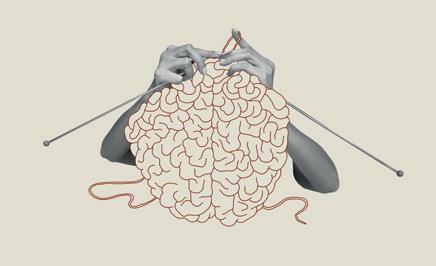
6 Which word or phrase in the text has the following meaning?
a connection between two nerve cells
4 the ability to understand something well
5 to make stronger
6 to make something smaller or weaker by removing parts
7 to send and receive information
8 to do an experiment
9 to remain clever or quick-witted
10 the quality of being easily made or changed
7 Look at these words from the text.
a Look at the words with an asterisk (*) in exercise 6 and add them to the table.
15 to strengthen b Add the other word classes. You can use an online dictionary if needed.
8 We asked ChatGPT to write a text about the brain. Unfortunately, some of the words have been left out. Use vocabulary from exercises 6 and 7 to fill in the blanks. You can use the same word more than once.
The brain is a marvellous organ that plays a crucial role in shaping who we are and how we perceive the world around us. Often referred to as the ‘ (1) headquarters’, the brain is (2) for controlling our thoughts, emotions, and actions. It achieves this through a vast network of connections called (3).
(4) are tiny gaps between nerve cells, known as neurons, where information is transmitted through chemical and electrical signals. These synaptic connections are the foundation of our (5), such as learning, memory, and problem-solving. When we learn something new, these (6) become (7), allowing us to retain and recall information more (8).
Just as a muscle grows (9) with exercise, our (10) can be (11) through mental exercises and learning experiences. Engaging in activities that challenge the brain, such as puzzles, reading, or even learning a new language, can improve cognitive functions and overall brain health.
Interestingly, the brain also follows a ‘prune and refine’ process. During childhood and adolescence, the brain produces an excess of synapses. However, as we age, the brain undergoes a (12) process, where less-used or unnecessary synapses are eliminated. This (13) is essential for optimising brain function and refining our cognitive abilities.
One of the brain's most remarkable features is its (14). This refers to the brain's (15) to adapt and reorganise itself throughout life in response to new experiences, injuries, or changes in the environment. Neuro (16) allows the brain to recover from injuries, adjust to new situations, and even compensate for lost functions.
9 Match the words in column A to those in column B to recreate the brain idioms.
1to be all brawn
2a brain
3a no-
4to rack
5to beat
6to pick
7to not have two
Alike a sieve
Byour brains out
Cbrain cells to rub together
Dno brains
Esomeone’s brains
Fyour brain(s)
Gbrainer
10 Fill in the crossword puzzle using parts of the brain idioms.
Across
2 an easy decision
5 to steal, to use
6 to overuse
7 a kitchen tool to separate liquids from solids
Down
1 great physical strength
3 to put in great effort so that it hurts: ... your brain
4 to press two surfaces against each other

11 Now look up the explanation of each of the idioms and fill out the chart below.
Idiom
1 a brain like a sieve
2 to be all brawn and no brains
3 a no-brainer
4 to rack your brain(s)
5 to beat your brains out
6 to pick someone’s brains
7 not have two brain cells to rub together
Explanation
12 Use these idioms correctly.
a Look at the example sentence and fill in the correct brain idiom.
I’ve been studying my maths for days now, but I haven’t managed to memorise these equations. I have
b Now come up with two more situations where one of the brain idioms would sound natural. Read them to a partner and see whether they can find the right idiom.
/ Try my skin
1 Watch the fan-made book trailer of Fish in a Tree.
a Describe in one sentence what Ally explains in the video.
b Write Ally’s characteristics (= how she describes herself) in the appropriate column. Positive characteristics
c What other important words or phrases are used to describe her personality?
d Draw a mind map using the information you gathered.
2 Read the extract from Fish in a Tree by Lynda Mullaly Hunt and answer the questions.
a Which learning difficulty does the protagonist suffer from?
b Summarise the extract by answering the WH-questions.
Who?
Where?
What?
Why?
c Highlight keywords in the text that indicate Ally’s self-image.
It’s always there. Like the ground underneath my feet.
“Well, Ally? Are you going to write or aren’t you?” Mrs. Hall asks. If my teacher were mean it would be easier.
“C’mon,” she says. “I know you can do it.”
“What if I told you that I was going to climb a tree using only my teeth? Would you say I could do it then?”
Oliver laughs, throwing himself on his desk like it’s a fumbled football. Shay groans. “Ally, why can’t you just act normal for once?”
Near her, Albert, a bulky kid who’s worn the same thing every day – a dark T-shirt that reads Flint – sits up straight. Like he’s waiting for a firecracker to go off. Mrs. Hall sighs. “C’mon, now. I’m only asking for one page describing yourself.”
I can’t think of anything worse than having to describe myself. I’d rather write about something more positive. Like throwing up at your own birthday party. “It’s important,” she says. “It’s so your new teacher can get to know you.”
I know that, and it’s exactly why I don’t want to do it. Teachers are like the machines that take quarters for bouncy balls. You know what you’re going to get. Yet, you don’t know, too. “And,” she says, “all that doodling of yours, Ally. If you weren’t drawing all the time, your work might be done. Please put it away.”
Embarrassed, I slide my drawings underneath my blank writing assignment. I’ve been drawing pictures of myself being shot out of a cannon. It would be easier than school. Less painful.
“C’mon,” she says, moving my lined paper toward me. “Just do your best.”
Seven schools in seven years and they’re all the same. Whenever I do my best, they tell me I don’t try hard enough. Too messy. Careless spelling. Annoyed that the same word is spelled different ways on the same page. And the headaches. I always get headaches from looking at the brightness of dark letters on white pages for too long. Mrs. Hall clears her throat.
The rest of the class is getting tired of me again. Chairs slide. Loud sighs. Maybe they think I can’t hear their words: Freak. Dumb. Loser.
I wish she’d just go hang by Alberg, the walking Google page who’d get a better grade than me if he just blew his nose into the paper.
The back of my neck heats up.
I don’t get it. She always lets me slide. It must be because these are for the new teacher and she can’t have one missing.
I stare at her big stomach. “So, did you decide what you’re going to name the baby?” I ask. Last week we got her talking about baby names for a full half hour of social studies.
“C’mon, Ally. No more stalling.”
I don’t answer.
“I mean it,” she says, and I know she does.
I watch a mind movie of her taking a stick and drawing a line in the dirt between us under a bright blue sky. She’s dressed as a sheriff and I’m wearing black-and-white prisoner stripes. My mind does this all the time – shows me these movies that seem so real that they carry me away inside of
them. They are a relief from my real life.
I steel up inside, willing myself to do something I don’t really want to do. To escape this teacher who’s holding on and won’t let go.
I pick up my pencil and her body relaxes, probably relieved that I’ve given in.
But, instead, knowing she loves clean desks and things just so, I grip my pencil with a hard fist.
And scribble all over my desk.
“Ally!” She steps forward quick. “Why would you do that?”
The circular scribbles are big on top and small on the bottom. It looks like a tornado and I wonder if I meant to draw a picture of my insides. I look back up at her. “It was there when I sat down.”
The laughter starts – but they’re not laughing because they think I’m funny.
“I can tell that you’re upset, Ally,” Mrs. Hall says.
I am not hiding that as well as I need to.
“She’s such a freak,” Shay says in one of those loud whispers that everyone is meant to hear.
Oliver is drumming on his desk now.
I fold my arms and stare up at her.
“That’s it,” Mrs. Hall finally says. “To the office. Now.”
I wanted this but now I am having second thoughts.
“Ally.”
“Huh?”
Everyone laughs again. She puts up her hand.
“Anyone else who makes a sound gives up their recess.” The room is quiet.
“Ally. I said to the office.”
I can’t go see our principal, Mrs. Silver, again. I go to the office so much, I wonder when they’ll hang up a banner that says WELCOME, ALLY NICKERSON!
“I’m sorry,” I say, actually meaning it. “I’ll do it. I promise.”
She sighs. “Okay, Ally, but if that pencil stops moving, you’re going.”
She moves to the reading table next to a Thanksgiving bulletin board about being grateful. Meanwhile, she sprays my desk with cleaner.
Glancing at me like she’d like to spray me with cleaner. Scrub off the dumb. I squint a bit, hoping the lights will hurt my head less. And then I try to hold my pencil the way I’m supposed to instead of the weird way my hand wants to.
I write with one hand and shield my paper with the other. I know I better keep the pencil moving, so I write the word “Why?” over and over from the top of the page to the very bottom.
One, because I know how to spell it right and two, because I’m hoping someone will finally give me an answer.
3 Answer and discuss these questions.
to glance: to look quickly to squint: to partly close your eyes
a Ally sees herself as ‘dumb’, ‘a loser’ and ‘a freak’. How do you see Ally? Highlight 5 keywords. Explain why you chose these words. amiable – angry – arrogant – balanced – bitter – brilliant – caring – childish –complex – cynical – enthusiastic – egocentric – excited – fearful – hardworking –insecure – kind – lazy – optimistic – passive – self-critical – sensitive – shy –skeptical – skillful – sympathetic – vulnerable
b How does Ally feel? Use the text to formulate your answer. READING
c What do you think of the teacher’s reaction?
4 Who has which learning disorder?
a Read the descriptions of these learning disorders. Match them to the correct term.
ADD – ADHD – dyscalculia – dysgraphia – dyslexia – dyspraxia
1 A disorder in learning arithmetic, such as difficulty in understanding numbers and learning facts in mathematics.
2 A disorder that can affect planning of movements and coordination as a result of brain messages not being accurately transmitted to the body.
3 A condition that makes focusing on everyday requests and routines challenging. They may be fidgety, noisy and unable to adapt to changing situations.
4 A learning disability that affects writing.
5 A disorder of attention, organisation and impulse control appearing in childhood and often persisting to adulthood.
6 A learning disability that is characterised by difficulties with accurate and/or fluent word recognition and by poor spelling and decoding abilities.
b Watch the video of these 6 people. Add their name to the correct learning disorder in the table of exercise 4 a.




no name mentionedKrystal-Bella
c How do these people feel about their condition?


• Write down 2 keywords for each of them in the right column ('How').
• Then write whether this person is positive (+), negative (-) or in between (±) towards their condition.
CHECK 1, p. 43
1 Form teams and play the brainiacs quiz. Your teacher will ask some brainy questions. Discuss your answer with your team.
2 Look at these 2 sentences from the brainiacs quiz.
a Highlight the adjectives and underline the adverbs.
b Indicate which words these adjectives and adverbs refer to.
c Write the word class below each of the words you referred to in b.
Dolphins and some primates are intelligent creatures, but the human brain is ….
a) less intelligent b) intelligent c) very intelligent d) the most intelligent
While many animals rely on instinct, the human brain can adapt and learn …
a) slowly b) quickly c) at the same pace d) more quickly
3 Complete the grammar box below.
How to compare things and actions
Use
We can use and to describe things, e.g. in size, in number, or to describe the quality of something.
Whether you have to use an adjective or an adverb depends on the part of speech the adjective or adverb says something more about:
1 a noun (e.g. Your brain looks interesting. An amazing brain.) →
2 a verb (e.g. Neurons constantly send information.)
3 an adjective (e.g. Your test results were surprisingly good ) →
4 an adverb (e.g. Your brain functions surprisingly wonderfully.)
Form
1/ Adjectives: when you want to make comparisons, it is useful to
e.g. J: ‘Elena, do you know that the brain of a male is heavier than that of a female?’
E: ‘Could be, Jarod, but the brain of a female responds much more quickly.’
J: ‘Did you know that the brain of a 20-year-old male is the heaviest?’
E: ‘Does that mean that a 20-year-old male is the most intelligent?’
J: ‘I guess not, maybe males are just more complicated than females. ��
E: ‘Well, I’d rather be more complicated than more common.’
2/ Adverbs: the most common formation of adverbs is to add To make comparisons when using adverbs follow the rule below.
more + adverb (+ than)
e.g.
less + adverb (+ than)
e.g.
more + adverb (+ than)
e.g.
less + adverb (+ than)
e.g.
the most + adverb
e.g. the least + adverb
e.g.
the most + adverb
e.g. the least + adverb
e.g.
e.g. Joe studies , but his sister studies . Amina, however, studies
Note!
- Not all adverbs end in -ly. Some short adjectives like high, long, hard, fast have an identical adverbial form.
- There are some irregular adverbs, e.g. good - well
- You can also compare 2 things or actions by using as + adjective / adverb + as e.g. I knew my English vocabulary as fluently as my teacher. See p. 37
4 Fill in the blanks of these regular or irregular adjectives / adverbs.
AdjectivePositive adverbComparative adverbSuperlative adverb good little far bad happy early much healthy recent like deep quick

5 Read about these learning difficulties.
a Fill in the correct form of the adjective or adverb. Sometimes you will have to use a comparison form. C stands for comparative, S for superlative form.
b Match the explanation with the correct disability. Choose from the following.
ADHD – dyscalculia – dysgraphia – dyslexia - dyspraxia
This learning difficulty refers to trouble with writing. Many experts view this difficulty as challenges with a set of skills known as transcription. These skills — handwriting, typing, and spelling — allow us to produce writing. Trouble expressing your thoughts in writing isn’t (1 formal) recognized as part of this difficulty. For example, people with this learning difficulty may write (2 slow, C) than others. That can affect how (3 good) they express themselves in writing. Plus, they tend to have trouble with spelling because it’s hard for them to form letters (4 correct) when they write.
This is a common condition that makes it (5 hard, C) to focus, keep still, and think before acting. Some people with this condition (6 main) have trouble with focus. It can also (7 serious) impact other skills, including managing emotions. It is a (8 common) condition that’s caused by differences in the brain. People with this condition have trouble with focus, but some are also (9 hyperactive) and (10 impulsive). That’s (11 special) true with kids and teens. It’s not clear (12 exact) how many people in the United States have this condition, but estimates are between 5 and 11 percent.
This learning difficulty refers to lifelong trouble with movement and coordination. It is a (13 neurological) disorder that (14 severe) affects a person's ability to plan and coordinate physical movements. It is considered a (15 developmental) disorder because it (16 typical) emerges during childhood and persists into adulthood. It cannot be (17 formal) diagnosed. But you may still hear people use this term, especially in the UK. The (18 formal) diagnosis is developmental coordination disorder (DCD).
4
People with this learning difficulty have trouble with math at many levels. They (19 frequent) struggle with key concepts like (20 big, C) vs. (21 small, C).
And they can have a (22 hard) time doing basic math problems and more (23 abstract, C) math. Dyscalculia is a condition that makes it hard to do math and tasks that involve math (24 correct). An estimated 5 to 10 percent of people might have this learning difficulty.
5
This is (25 common, S) learning difficulty; it’s a condition that makes it (26 hard) to work with language. People with this condition don’t outgrow it. But there are teaching approaches and strategies that can help them improve their reading skills and manage the challenges (27 significant). People of any age can be tested for this condition, although the tests are (28 different) for adults than for kids.
Adapted from: www.understood.org
6 Have you ever thought about the differences and similarities between Homo Sapiens and the Neanderthals? Fill in the correct form of the adjective or adverb. Careful: you will often need to use comparison forms.
1 Neanderthals are the (1 close) extinct relatives we have and their similarities and differences can provide us with (2 valuable) information about our own origins and evolution.
2 They were (3 early) humans to inhabit Europe and parts of Asia. They lived in small tribes and were nomadic hunters and gatherers. To this day, they remain shrouded in mystery as we try to uncover the secrets behind their unique features, cultural practices, and evolutionary trajectory.
3 The (4 noticeable) differences between Neanderthals and Homo sapiens is their physical appearance. Neanderthals had (5 large), (6 robust) bodies than that of modern humans. They were (7 short) and (8 stocky) than Homo sapiens, with a (9 slight) larger cranial capacity.

4 Homo sapiens, on the other hand, are (10 tall) and (11 thin) than Neanderthals, with a (12 small) cranial capacity. We have a long, narrow face with a (13 conspicuous negative) brow ridge, a smaller nose, and chin. Our bodies are adapted for warmer climates, with longer limbs, fingers, and toes.
5 According to research, Neanderthals were not (14 archaic =) people assumed them to be. Additionally, there is evidence that they could pass messages and communicate (15 effective) and that they performed rites for their dead.
6 Scientists found that the base of Neanderthal skulls were (16 arched, negative) than humans but yet (17 arched) than chimpanzees, which suggests they were able to produce speech. However, the speech may not be in the same sound range or (18 diverse =) homo sapiens.
7 While there is evidence that Neanderthals cared for the sick and injured, further research is needed to determine if their care was (19 sophisticated =) that of Homo sapiens.
Source: www.animalsaroundtheglobe.com
2, p. 55
1 Discuss these questions.
a Which website(s) do you access the most to find information?
b Do you believe all the information that is published (available) on the Internet? Why (not)?
c Which information do you not trust?
2 Scan the text below and answer the following questions. Use the strategy in the Summary on how to read a text more effectively (page 41) again if necessary.
a Look at the layout of the text. What kind of text is this?
b Which type of text is this?
c Who is the targeted audience?
d What is the goal of this text?
[title]
6:15AM BST
The origins of the butterfly swimming stroke are highly contested. According to one reputable newspaper, “it was first swum either in 1933 by Henry Myers at the Brooklyn YMCA, or 30 years previously by Jack Stephens – later a Second World War codebreaker at Bletchley Park – who claimed to have invented the fly at a public swimming baths in Belfast.”

The only problem is that Mr Stephens doesn’t exist. He’s a figment of my friend’s imagination, who made the entire story up and entered it into the crowd-sourced online encyclopedia Wikipedia for a joke. There it happily stayed for more than two years and no one – not even the journalist who quoted it – noticed anything was awry. Fortunately, there weren’t any questions
By Jamie Bartlett
about butterfly stroke in this week’s final of University Challenge. After leading Gonville and Caius College, Cambridge to an impressive victory, Ted Loveday – who answered 10 “starters for ten” without dropping a point – explained his secret. He’d been swotting up on Wikipedia. By any measure, Wikipedia is truly remarkable. It’s the first real wonder of the digital age. Far larger than any other body of collected knowledge (almost five million English language articles and counting), it’s also free, and thanks to a large community of active editors and clever ways to resolve disagreements between them, usually accurate. That’s why half of us now use the site to find information, research essays, cheat in pub quizzes, and ruin enjoyable debates. It’s so good, in fact, that polls show we now trust it more than the BBC. Among 2,000 British adults, YouGov found that 64 per cent trust Wikipedia entries to tell the truth “a great deal” or “a fair amount”; compared to 61 per cent for the BBC. We mere mortals rely on it in everyday life, but Ted Loveday and co are the sharpest minds in the land, from our most august institutions, immersed in the world of
academia and learning. So when these bright young things consider it a good way to learn, we’ve reached a tipping point. Clearly, we now live in the age of the crowd, when we have more faith in what others think collectively than what we are told by the experts. In fact, the crowd is the new expert.
This is partly a result of the collapse of trust in expertise and institutions generally. Whether it involves the justice system, the police, the government, or the media, over the last decade trust has been on a marked downward trend. But more importantly, this “crowd wisdom” has become the only way to manage the deluge of digital material bombarding us all the time. The internet is a mass of conflicting, confusing, overwhelming information. There is too much to choose from: too many songs, too many books, too many hotels, too much news, too many opinions. Too much everything.
So the simplest way to work out what’s what is to look at what everyone else thinks. On YouTube we tend to watch what other people are watching. A news story is trending on Twitter? Better check it out: it must be worth reading if everyone else is. Not sure which of the dozens of nearby restaurants to pick? Have a scan at the customer reviews. So much of our life is now driven by the crowd. Views, stars, shares and likes are now handy little gatekeepers that help us manage our limited time. After all, two heads are better than one. So a thousand must be better still, right?
Not always. First, things aren’t always what they seem online. For example, several major companies have been fined for manipulating or faking reviews of their own products – in a practice known as astroturfing. On Wikipedia, there is the problem of “Wikiwashing”, where professional editors are paid to write and edit entries (though the company has been doing its best to tackle this). The Labour shadow business secretary Chuka Umunna’s Wikipedia editing was found to come from his own office. The journalist Johann Hari admitted to editing rivals’ pages. Then there are people like my friend (who now feels terrible about this, by the way) who “deface” pages with made-up stories. Wikipedia’s editors aren’t exactly a cross section of society either: only 10 percent of its editors are women – and many “Wikipedians” as they call themselves, are worried by what this might mean for what’s produced.
Despite these difficulties, on the whole, Wikipedia works remarkably well. In a famous study conducted by the journal Nature it was found to be roughly as accurate as the mighty Encyclopedia Britannica, painstakingly written by the world’s experts. Facts and memory is what wins you University Challenge – and for its range and volume of facts, Wikipedia is peerless.

But it works less well for encouraging independent thinking, for forming opinions, for critical thoughts, for judgment – for knowing how to learn or how to evaluate information. We’re herding animals: we tend to trust something because everyone else does – and often in life that’s no good at all. Wikipedia works well enough to help you win University Challenge. But for the rest, I’d still prefer a book. Source: www.telegraph.co.uk
august: impressive awry: wrong editors: people who decide what should be in a text or article figment of somebody’s imagination: not real, something imagined immersed: completely involved in
3 Read the text in more detail and decide if these statements are true or false. Correct the false statements.
Statement
1 Jack Stephens invented the butterfly swimming stroke.
2 The author of the article trusts the accuracy of the articles.
3 People tend to trust expertise and institutions more than the internet.
4 ‘Wikiwashing’ means that people are paid to write lies.
4 What would be a good title for the text?
a Formulate it as a question to which the text gives the answer. Add it to the text in exercise 2.
b Answer that question in 1 sentence.
5 Analyse and structure the text as a whole.
a Preparation:
• Look for keywords in every paragraph and highlight them.
• Underline the topic sentences in every paragraph.
• Fill in the table to identify the basic elements of the text.
b Action: make a schematic summary (e.g. mindmap, Cornell, …), using the information from the preparation and the keywords and topical sentences you marked in the text. Use a separate piece of paper or find a good online tool for this!
6 What do you think: fact or fiction? Discuss with a partner.
a Have you ever googled your symptoms? Then you have a 55 % chance the diagnosis will be accurate.
b People get paid up to $ 5,000 to write fake news on Facebook.
c Most website visitors aren’t humans, but bots.
d People lie all the time, especially on Facebook.
e It is possible to register with a fake name on Facebook.
7 Look up and briefly explain an example of a blatant lie that was posted online.
8 Watch the video and answer the questions.
a List the first 3 lies that are mentioned.
b What advice is given at the end of the video?
c Which words or phrases are used to say that the news was a lie?
9 Answer these questions with a partner.
a Had you ever heard any of these lies before?
b Have you ever believed an internet lie? Which one? How did it make you feel?
c Have you ever posted a lie online? Explain.
How to check if your sources are reliable and useful
If you have to do research and find useful information on the internet quickly, check the tips in the Summary See p. 42
10 Do some online research and find …
a A trustworthy video of less than 4 minutes explaining learning difficulties.
b A video about learning difficulties that is less than 1 month old.
11 Analyse your videos.
a First check the characteristics to judge the trustworthiness by answering these questions.
• What is the duration of the video?
• Who is the speaker / voice over?
• What do we know about this person’s professional background?
• Does the video contain many gimmicks?
• What is the source of the video?
• Does the video mention references?
Duration?
Speaker / voice over?
Professional background?
Gimmicks?
Source?
References?
b Now check the content of the videos.
• What is the topic of the videos?
• Who is the target audience?
• Does the video contain general or detailed information?
• Check whether the videos contain new or verified information.
Topic?
Target audience?
General or detailed information?
New or verified information?
Top position in search engine rankings
Being at the top on the first page of Google results can make a big difference to a business. According to research, websites on the top get 42 % of the traffic; the second gets 11 % and third gets 8 % only. These companies often pay Google for higher rankings, so be careful when you search for information and always verify whether the information is truthful.

12 Pick 1 of the 5 learning disorders in Step 2 exercise 5 on page 27. You can choose any learning disorder except for ‘dyspraxia’. Find 3 websites with tips on how to deal with the learning disorder. Complete the second column below. Learning disorder Trustworthy? Tips on
Website 1 Title: URL: Yes / No because:
Website 2 Title: URL: Yes / No because:
Website 3 Title: URL: Yes / No because: READING
13 Watch the video about evaluating internet sources and list the helpful tips that are given.
14 Look back to the websites you used in exercise 12 on page 35. Put them to the test using the tips above.
a Add your findings to the table in exercise 12 for each website you used (Column: 'Trustworthy?').
b Were you critical of the sites you wanted to use?
CHECK 3, p. 63

Comparisons of adjectives and adverbs

1/ Adjectives: the form of the adjective is variable, of course, but when you want to make comparisons, it is useful to count syllables.
SyllablesComparative
1 adjective + er (than)
e.g. quicker than
2 - adjective + er (than)
e.g. heavier than - more + adjective + than e.g. more common than
Superlative
(the) adjective + est
e.g. the quickest
- (the) adjective + est
e.g. the heaviest - the most + adjective
e.g. the most common
>2more + adjective + than e.g. more complicated than more + adjective + than
e.g. the most intelligent
e.g. J: ‘Elena, do you know that the brain of a male is heavier than that of a female?’
E: ‘Could be, Jarod, but the brain of a female responds much more quickly.’
J: ‘Did you know that the brain of a 20-year-old male is the heaviest?’
E: ‘Does that mean that a 20-year-old male is the most intelligent?’
J: ‘I guess not, maybe males are just more complicated than females. �� ’
E: ‘Well, I’d rather be more complicated than more common.’
Note that there are exceptions to this rule, e.g. common, clever or narrow. Although they have 2 syllables, you use ‘more’ and ‘most’ when making the comparative.
2/ Adverbs: the most common formation of adverbs is to add + ly to the adjective. To make comparisons when using adverbs, follow the rule below.
AdjectiveAdverb
Comparative
Superlative slow slowly
more + adverb (+ than)
e.g. more slowly than
less + adverb (+ than)
e.g. less slowly than the most + adverb e.g. the most slowly
the least + adverb e.g. the least slowly common commonlymore + adverb (+ than) e.g. more commonly than
less + adverb (+ than)
e.g. less commonly than the most + adverb e.g. the most commonly
the least + adverb e.g. the least commonly
e.g. Joe studies slowly, (positive adverb) but his sister studies more / less slowly. Amina, however, studies the most / least slowly
Keep in mind!
- Not all adverbs end in -ly. Some short adjectives like high, long, hard, fast have an identical adverbial form.
- There are some irregular adverbs, e.g. good - well
- You can also compare 2 things or actions by using as + adjective / adverb + as e.g. I knew my English vocabulary as fluently as my teacher.
We use adjectives and adverbs to describe things, e.g. in size, in number, or to describe the quality of something.
The word type can define several word classes, i.e.
1 a noun (e.g. Your brain looks interesting. An amazing brain.) → adjective
2 a verb (e.g. Neurons constantly send information.)
3 an adjective (e.g. Your test results were surprisingly good ) → adverb
4 an adverb (e.g. Your brain functions surprisingly wonderfully.)
Word Translation My notes
BRAIN FUNCTIONS AND BIOLOGY
cell cel
cognition kenvermogen, cognitie increase toename
long-term memorylangetermijngeheugen neuron zenuwcel
plasticity plasticiteit, kneedbaarheid to prune snoeien to refine verfijnen response reactie
short-term memorykortetermijngeheugen signal signaal to strenghten versterken synapse synaps, raakpunt tussen zenuwcellen
ADHD ADHD condition aandoening
dyscalculia dyscalculie dysgraphia dysgrafie dyslexia dyslexie
dyspraxia dyspraxie empathy inlevingsvermogen to focus focussen issue probleem
lack / to lack gebrek (hebben aan) learning difficulty leermoeilijkheid
learning disabilityleerstoornis
learning disorder leerstoornis to memorise memoriseren misconception misvatting to scribble krabbelen self-image zelfbeeld
Word Translation My notes skill vaardigheid to squiggle kronkelen to struggle worstelen
ADJECTIVES
amiable lieflijk anti-social asociaal bitter verbitterd brilliant briljant creative creatief embarrassed beschaamd insecure onzeker
self-critical zelfkritisch shy verlegen vulnerable kwetsbaar
BRAIN IDIOMS
a brain like a sieve een geheugen als een zeef hebben a no-brainer fluitje van een cent not have two brain cells to rub together te dom zijn om te helpen donderen
to beat your brains outje hoofd breken over iets to pick someone’s brains iemand uitvragen over zijn ideeën, kennis to rack your brain(s)je hoofd breken over iets to be all brawn no brains sterk maar niet bijzonder snugger zijn, brute kracht
Look at the picture(s). Read the title(s) first.
Who wrote this? Who is the text meant for?
Why did he / she write it?
What do you need to do with the text?
Why do you have to read it? What type of questions will you get?
Check your understanding
If possible, reread difficult passages.
Have you understood the main points?
What would you do differently next time?
Try to answer the WH-questions: who / what / where / how / why / when?
Reading for details
Look for context clues
Look for numbers if a year, an amount or a date is asked for.
2 3 1
Have you completed the task?
Look for keywords, synonyms or related words.
Use a highlighter or a pencil to flag up the information you need.
To determine if you can use the information you find online for your purposes, you can use different methods, such as the CRAAP method. Ask yourself the questions associated with each letter.
Currency
Check the timeliness of the information.
• When was the information published or posted?
• Has the information been revised or updated?
• Is the information current or out-of-date for your topic?
• Are the links functional?
Relevance
Is the information on the site important and relevant for your needs?
• Does the information relate to your topic or answer your question?
• Who is the intended audience?
• Is the information at an appropriate level (i.e. not too elementary or advanced for your needs)?
• Have you looked at a variety of sources before determining this is one you will use?
• Would you be comfortable using this source for a research paper?
Authority
What or who is the source of the information?
• Who is the author / publisher / source?
• Are the author’s credentials given? What are they?
• What are the author’s qualifications to write on the topic?
• Is there contact information, such as a publisher or email address?
• Does the URL reveal anything about the author or source? Examples: – .com (commercial), .edu (educational), .gov (U.S. government)
– .org (nonprofit organisation)
– .net (network)
Accuracy
What can you say about the reliability, truthfulness and correctness of the content?
• Where does the information come from?
• Is the information supported by evidence?
• Has the information been reviewed?
• Can you verify any of the information in another source or from personal knowledge?
• Does the language or tone seem biased and free of emotion?
• Are there spelling, grammar or other typographical mistakes?
Purpose
What is the reason the information exists?
• What is the purpose of the information? To inform? Teach? Sell? Entertain? Persuade?
• Do the authors make their intentions or purpose clear?
• Is the information fact? Opinion? Propaganda?
• Does the point of view appear objective and impartial?
• Are there political, ideological, cultural, religious, institutional or personal biases?
1 Work in groups.
a You will get a specific task. Try to accomplish the job as best as you can.
b Discuss your findings and experiences in your group afterwards.
c Describe what you have learned from the experience.
• Preparation: think about your task and what your group members told you about their task. Was it easy? Difficult? Write down a few keywords expressing your feelings.
• Action: write down what you have learned using the writing frame below. Make sure to write at least 10 full sentences (about 75 words).
I would like to give my opinion about
I thought it was
What I didn’t expect was
I was surprised to find that
My conclusion is
• Reflection: check your text by filling in the checklist. Then share your opinion with the class.
Checklist: writing a conclusion
1 Preparation
• I tried to experience a learning disorder to the best of my ability.
• I listened carefully to what my group members experienced.
• I wrote down some keywords first.
2 Content and structure
• I used the sentence starters to give my opinion.
• I wrote about 75 words.
• I used the information from my preparation to write what I have learned.
• I used my own words as much as possible to explain how I felt.
3 Language
• I used correct grammar and vocabulary.
• I used correct spelling and punctuation.
Feedback
Score < 6 6 – 8 > 8
Yes I think soNo
Next exercise ex. 2 ex. 4 ex. 3
2 Read these personal stories and complete the table with the answers to the following questions.
a Which learning disorders do Jake and Kerri suffer from?
b Write down the characteristics of these disorders.
c What would you tell the person to help them?
What I would tell this person:
What I would tell this person:
d Give each text an appropriate title based on the main ideas.
Text 1
When I was first learning to read at home, I would sit down with my mother and she would help me form words orally. I had to read words out loud so that my mother knew that I could actually read them. My mother would be very comforting and understanding. If I made a mistake, she would say, “It’s okay, just keep going.” She understood that at five or six I was still young enough that mistakes were prone to happen. I barely even realized that I made mistakes. I read at my own pace and I could understand it. I felt empowered by my new abilities. Eventually I would be picking out words that I recognized as I saw them. In church I would say, “Mom that says ‘God.’” I could read and I was on top of the world. I was never truly embarrassed by the difficulty I had with reading when I read at home. I was alone. I was the best in my class. I was the worst in my class. Life was great until everything changed. Everything changed when I was six years old. I began going to summer theatre camps at my church. I was so excited to show off my ability to read. Everybody in the camp got scripts for scenes and I had the most lines in one of my scenes-the narrator in the scene “Click, Clack, Moo.” We started rehearsal sitting in a circle to read through the whole two-page script. I had the first line. All eyes were on little six year-old Jake. Like a confident, broken-down car, I began. “Fa-fa-far-farm-er B-b-bro Farmer Brown h-had a p-pr-prolb-problem? Mrs. Barshinger, I don’t know this word!” It only got worse from there. My face was the color of a fire engine and like the engine’s hose, my eyes burst out with tears. What was happening? Wasn’t I a good reader?
By jakediemravens216
Adapted from www.teenink.com
Text 2
There are no windows and my gaze drifts toward the orange door of my classroom. My foot bounces up and down, and my attention pings around during the lecture. My professor is speaking just a few feet away, but he fades in and out of my focus. I drift between the PowerPoint on the screen in front of the classroom and the notes on my computer. I absently enter bullet points. Occasionally, a ripple of laughter flows through the classroom. My classmates’ questions and stories, along with my professor’s responses, swirl around me and fill the room. his isn’t a boring class. This lecture on mental health and exercise definitely interests me. And my professor does his best to keep us engaged with amusing and interesting stories. Still, like a pinball, my focus bounces from one thing to another. The lecture is the last thing my brain wants to pay attention to, even though I want to pay attention and I’m trying hard to. But I’m caught up in the chaos of the sounds of my fellow students—zippers, coughs, pen, keyboard clicks….
By Kerri MacKay
Adapted from www.understood.org
3 Analyse the infographic about learning disorders in the United States. a Preparation: answer the following questions to get some of the most important information.
1 Which learning disorders are caused in the parietal lobe?
2 What percentage of learning disorders are related to reading?
3 List the 3 obstacles that cause the least problems for people with learning disorders compared to the general population.
4 Which 3 learning disorders can be traced back to the same part of the brain?
5 Which part of the brain is responsible for dyslexia?
Subtotal / 11
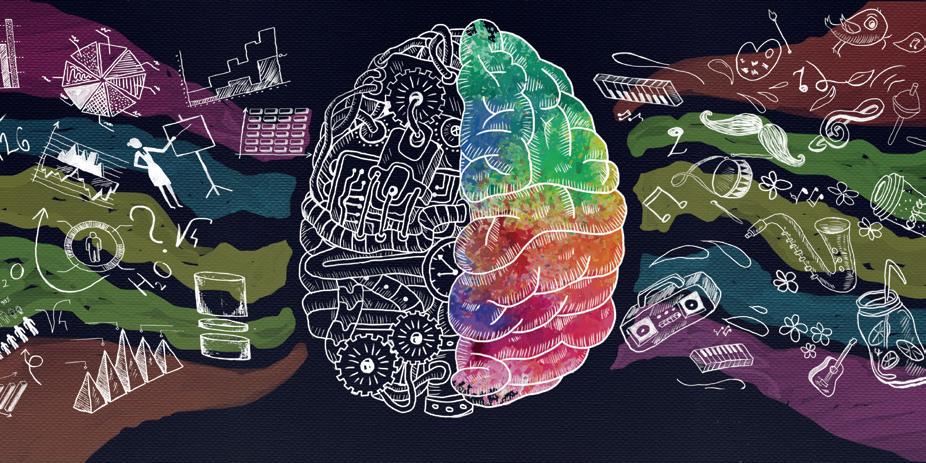
Learning disorders are disorders that affect an individual’s basic psychological processes involved in comprehending specific information. This includes conditions such as perceptual handicaps, brain trauma, developmental aphasia and brain dysfunction that manifest as language and reasoning problems.
Visual, hearing or motor handicaps, mental retardation or emotional disturbance
4 % to 6 %
Percentage of American students with a learning disability
Dyscalculia
1 in 2
Public school students in special education who have learning disabilities
80 %
Percentage of learning disabilities in teens that are associated with reading
What: General mathematical disorder in which a person cannot comprehend quantity, positive and negative number values, fractions and many simple mathematical operations
Signs: Issues with word problems, handling money, figuring out days/ months, long division and patterns
What: Writing difficulties; usually linked to brain trauma
Signs: Writing in a distorted way, consistently incorrectly spelling words and oddly spacing letters
What: Motor skills problems
Signs: Poor sense of balance and hand-eye coordination; clumsiness, frequently stumbling; irritation from loud noises and touch
Dyslexia
What: Reading disorder; recently linked to genetics
Signs: Reading at lower levels than expected; inability to phonologically process words
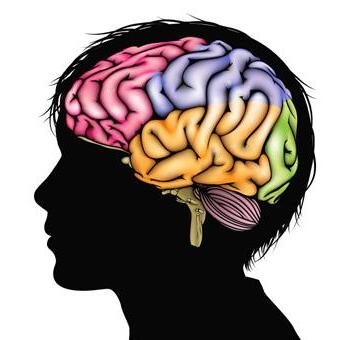





Source: www.learningsuccessblog.com
LOBE
What: Inability to focus; most common learning disorder
Signs: Increased, random hyperactivity, impulsivity, short attention spans and disruptive behavior
b Action: write down your conclusion about the information in the infographic (about 50 words). Use the prompts below.
The infographic gives information about I thought it was
What I didn’t expect was
I was surprised to find that
My conclusion is
c Reflection: check your task by filling in the checklist. Then give your text to the teacher who will give you some feedback.
Checklist: writing a conclusion Yes I think soNo
1 Preparation
• I scanned the infographic for useful information.
• I filled in all the questions about the text.
2 Content and structure
• I wrote about 50 words.
• I used the information from my preparation.
• I used my own words as much as possible.
3 Language
• I used correct grammar and vocabulary.
• I used correct spelling and punctuation.
Feedback
Subtotal / 10
Score < 16 ≥ 16
Next exercise ex. 5 Check 2, p. 55
4 Read this extract from The Curious Incident of the Dog in the Night-Time and answer the questions below.
a Are these statements true or false? Prove your answers with information from the text.
1 Wellington died the day before.
2 Christopher enjoys roaming the streets at night.
3 Christopher has little confidence in people.
4 Christopher seems to enjoy literature.
b Explain: ‘Christopher has difficulties interpreting emotions.’
c Why does Christopher like dogs?
d What do you think happened to the dog?
e Based on this extract, decribe how you feel about the text. Would you consider reading the entire book? Why (not)?
It was 7 minutes after midnight. The dog was lying on the grass in the middle of the lawn in front of Mrs. Shears’s house. Its eyes were closed. It looked as if it was running on its side, the way dogs run when they think they are chasing a cat in a dream. But the dog was not running or asleep. The dog was dead. There was a garden fork sticking out of the dog. The points of the fork must have gone all the way through the dog and into the ground because the fork had not fallen over. I decided that the dog was probably killed with the fork because I could not see any other wounds in the dog and I do not think you would stick a garden fork into a dog after it had died for some other reason, like cancer, for example, or a road accident. But I could not be certain about this.
I went through Mrs. Shears’s gate, closing it behind me. I walked onto her lawn and knelt beside the dog. I put my hand on the muzzle of the dog. It was still warm. The dog was called Wellington. It belonged to Mrs. Shears, who was our friend. She lived on the opposite side of the road, two houses to the left.
Wellington was a poodle. Not one of the small poodles that have hairstyles but a big poodle. It had curly black fur, but when you got close you could see that the skin underneath the fur was a very pale yellow, like chicken.
I stroked Wellington and wondered who had killed him, and why.
My name is Christopher John Francis Boone. I know all the countries of the world and their capital cities and every prime number up to 7,057.
Eight years ago, when I first met Siobhan, she showed me this picture
and I knew that it meant “sad”, which is what I felt when I found the dead dog. Then she showed me this picture
and I knew that it meant “happy”, like when I’m reading about the Apollo space missions, or when I am still awake at 3 a.m. or 4 a.m. in the morning and I can walk up and down the street and pretend that I am the only person in the whole world.
Then she drew some other pictures
but I was unable to say what these meant.
I got Siobhan to draw lots of these faces and then write down next to them exactly what they meant. I kept the piece of paper in my pocket and took it out when I didn’t understand what someone was saying. But it was very difficult to decide which of the diagrams was most like the face they were making because people’s faces move very quickly.
When I told Siobhan that I was doing this, she got out a pencil and another piece of paper and said it probably made people feel very
and then she laughed. So I tore the original piece of paper up and threw it away. And Siobhan apologised. And now if I don’t know what someone is saying, I ask them what they mean or I walk away.
I pulled the fork out of the dog and lifted him into my arms and hugged him. He was leaking blood from the fork holes.
I like dogs. You always know what a dog is thinking. It has four moods. Happy, sad, cross and concentrating. Also, dogs are faithful and they do not tell lies because they cannot talk. I had been hugging the dog for 4 minutes when I heard screaming. I looked up and saw Mrs. Shears running toward me from the patio. She was wearing pajamas and a housecoat. Her toenails were painted bright pink and she had no shoes on.
She was shouting, “What in fuck’s name have you done to my dog?”
I do not like people shouting at me. It makes me scared that they are going to hit me or touch me and I do not know what is going to happen.
“Let go of the dog,” she shouted. “Let go of the fucking dog for Christ’s sake.”
I put the dog down on the lawn and moved back 2 meters. She bent down. I thought she was going to pick the dog up herself, but she didn’t. Perhaps she noticed how much blood there was and didn’t want to get dirty. Instead she started screaming again.
I put my hands over my ears and closed my eyes and rolled forward till I was hunched up with my forehead pressed onto the grass. The grass was wet and cold. It was nice.
(…)
This is a murder mystery novel.
Siobhan said that I should write something I would want to read myself. Mostly I read books about science and maths. I do not like proper novels. In proper novels people say things like, “I am veined with iron, with silver and with streaks of common mud. I cannot contract into the firm fist which those clench who do not depend on stimulus.”1 What does this mean? I do not know. Nor does Father. Nor does Siobhan or Mr. Jeavons. I have asked them.
Siobhan has long blond hair and wears glasses which are made of green plastic. And Mr. Jeavons smells of soap and wears brown shoes that have approximately 60 tiny circular holes in each of them.
But I do like murder mystery novels. So I am writing a murder mystery novel. In a murder mystery novel someone has to work out who the murderer is and then catch them. It is a puzzle. If it is a good puzzle you can sometimes work out the answer before the end of the book.
Siobhan said that the book should begin with something to grab people’s attention. That is why I started with the dog. I also started with the dog because it happened to me and I find it hard to imagine things which did not happen to me.
1 I found this book in the library in town when Mother took me into town once.
Source: The Curious Incident of the Dog in the Night-Time, Mark Haddon, p. 1-5
5 Read and structure the information in the text ‘Unlocking a Learning Disorder’. Follow the procedure below.
a Preparation:
– Look at the mind map on page 53.
While you are reading, highlight keywords in the text that you could use in the mind map.
By gogettergirl95, Roswell, GA
People are often surprised when I tell them that I have a learning disorder. Many think that a learning disorder is just a fancy term for stupidity or laziness, but this couldn’t be further from the truth. And, although some students with a learning disorder do become discouraged and lose the motivation to try, there are scores of others who compensate for their difference. I have every intention of controlling my learning disorder rather than letting it control me. Something that once held me back ultimately gave rise to inner strength and resourcefulness. I have learned that self-determination, hard work, and a positive attitude are the keys to managing a learning disability.
A learning disorder is not a curse, a blessing or a disease. It is a permanent condition that can greatly impact one's life. It is a neurobiological disorder that affects the way the brain receives and processes information. This often makes learning through traditional methods difficult and frustrating. Children with learning disorders do not understand that this is happening and often have trouble learning. They may feel different and inferior long before their learning disability is identified which then provides a sense of relief.
My learning disorder first became apparent in elementary school when I was unable to learn how to read and write. Even in kindergarten, I remember feeling I was in over my head and wondered whether I was out the day my classmates got the “memo”. While they were already conquering chapter books, I was still stumbling over what sound each letter made. Masters of the written word, they floated through the classroom with an air of confidence while I was weighed down by an overwhelming sense of futility. No matter how hard I tried, I was unable to grasp this basic and essential par t of reading.
Fortunately, I had the blessing of walking through charted territory since my older sister also had difficulty learning to read. My parents quickly sprang into action and got me tested. The assessment process is critical because there are different types of learning disabilities, and it is possible to have more than one, which is my case. A lengthy evaluation revealed that I had several learning disorders which impacted both my verbal and visual processing. Besides my struggle to read and write, I did not know left from right, and I had trouble with motor sequencing. I tripped over my feet in ballet class, and I could not balance myself on a bicycle. I adored music and wanted to play an instrument, but it was hard for me to discriminate sounds or to sing on pitch. So many doors were closed with many keys to find.
I was convinced that I would never learn to read. I was on the verge of losing hope and then something magical happened. I finally unlocked the code. My triumph occurred one – Sunday after our family had returned from the local library. I was sprawled across the couch, surrounded by a mound of books and eager to dig into my newest selection. I took Junie B. Jones is Not a Flower Girl from the top of the pile, squinted at the page (all text not pictures), and tried to make sense of the print.
Suddenly something clicked, and the lock was broken. Letters jumped off the page, and I grabbed them as they flew by. They combined into words and then, sentences. In a flash, the whole page belonged to me. I dropped the book on the floor and scrambled upstairs, screaming to my mother: “I am a reader! I am a reader now!” In an instant, my identity was forever changed; I gained passage into a new world. It did not come easily, and I did not get there on my own.
55 In other areas, I can stretch beyond my comfort zone and find a solution that works for me. I study Latin now because it is not a spoken language, I use notecards on a daily basis, and I rely on Google to spell words. I try to remind myself that I am not stupid, only different. And, being different is not always a bad thing.
I cannot say that I am a better person because of this difficult part of my life or that I am grateful for having these challenges.
I know that I have become a more resolute and flexible person because of my disorder. It is the way I think, the way I process information, and the way that my mind works. At times I am insulted when people make assumptions about my intelligence because of my learning disorder. In the past, I felt compelled to educate others about what a learning disorder is, but I have come to realize that it only matters how I view myself.
I am aware of my strengths, and I have become confident about my ability to prevail. I have learned to shift my thinking and focus from my disabilities to my abilities. Admittedly, there are times when my confidence wavers, and I question whether I hold the keys to success, after all. For these trying moments, I keep a copy of Junie B. Jones is Not a Flower Girl stashed in the glove compartment as a reminder of my moment of victory. Regardless of the obstacles I may face, I know that I have the determination and drive to reach my goals.
Source: www.huffingtonpost.com
b Action: fill in the mind map of the text.
c Reflection: reflect on your task by filling in the checklist below.
Checklist: getting the main ideas from a text Yes I think soNo
1 Content and structure
• I checked the outline of the mind map.
• I read the text carefully and highlighted keywords.
• I used the information from my preparation to fill in the mind map.
2 Language
• I checked my language: grammar and vocabulary is correct.
• I checked my spelling and punctuation.
Feedback
Score




1 Let’s play Quartets.
a Look at the species given. Add another animal of your choice. Make sure that you can find the necessary information online.



Brain weight Neurons
Average weight (female)
Brain-to-body mass ratio
b Write 5 sentences comparing characteristics of the species. Make sure to use at least 3 adverbs. Underline the adjectives and highlight the adverbs. Make comparisons using comparative and superlative forms!
2 Read about the 10% brain myth. a Fill in the correct form of the adjective or adverb in brackets. Use comparisons where necessary.
One of (1 persistent) and (2 wide) spread brain myths states that we only use 10% of our brains. What a shock, if we think of the 90% of our brain potential, that we don’t use! Users of an Internet forum tried to explain this phenomenon: “Sure that we do not use all of our brain”, writes one of them, “because then we could not learn new things, as all of the brain capacity would be already used”. Another person, on the contrary thinks: “we only use a part of our brain, the rest serves as a reserve. We (3 continuous) lose brain cells. That means: in the course of our life, we use all of them!” Apart from these explanations, the 10% myth is used in advertisement campaigns. Most often it is found in connection with certain new-age brain jogging products, which promise the access to huge unused brain areas - but the sellers profit most from these products. Other people try to extend their brain capacity by making use of various methods. Thus it has been stated that: “In the traditional Asian meditation techniques, the remaining brain percents are used for extending consciousness and as a spiritual exercise”. (4 consequent), we could learn from Zen monks and yogis to use all of our brain. And for those who won’t go along with meditation, they could acquire a heightened brain capacity more (5 easy), through drugs like cannabis. Just imagine what could be reached through the extension of brain usage: thought transmission, (6 extreme) high intelligence, as well as telekinesis. The truth, however, is less fantastic. There is (7 absolute) no scientific evidence, which confirms this myth, not even to some extent. Various theories on the origin of this myth exist, but there is no (8 significant) evidence to suggest that we only use 10 or any other specific or limited percentage of our brains. On the contrary, all existing data shows that we use a 100% of our brains.
Today it is difficult to determine from whom this myth stemmed, and how it could have spread so (9 wide). However, it can be traced back to the late 19th century in advertisements and brochures for self-help. Not to mention that Albert Einstein once said to a journalist that he only used 10% of
his brain, as an answer to a question concerning his intelligence. This quotation of Einstein, however, has never (10 official) been recorded.
The myth then became famous through Dale Carnegie’s best-seller “How to Stop Worrying and Start Living” and through Uri Geller, who explained his “spoon magic” by (11 good) usage of the brain.
While no brain scientist has ever spoken about 10%, researchers still contributed to the 10% myth. The ignorance, which ruled at the beginning of brain research, could have contributed to the myth. In the 30s, the researcher Karl Lashley explored the function of (12 certain) brain areas with electric shocks.
These showed up no effects in many brain regions. Hence, he concluded that these regions did not have any function. Thus, the term “silent cortex” was created. Today, however, this thesis has turned out to be (13 wrong).
Another possibility for the origin of this myth is the ratio of glia cells to neurons in the brain, which is 10:1. Glia cells “only” support neurons in their functioning. But it is the neurons that are used for information processing, and thereby for our thinking and feeling.
(14 possible), the success of the myth can be ascribed to our hope to overcome human constraints. How great would it be, if there were such an enormous, unused reservoir for us to tap! But there are arguments that these wishes won’t come true.
Arguments against the 10% myth: we use 100% of our brain.
“90% of the brain are continually lying fallow”- a neuroscientist would (15 immediate) doubt that this statement is true for the following reasons:
1. Evolution does not allow any wastefulness. Wastefulness causes an exclusion of the gene pool.
Like all other organs, our brain has been shaped by natural selection. While the brain only weighs 2% of the total body weight, it uses 20% of the whole energy. Thus, brain tissue is (16 metabolic) expensive to grow and run. Regarding these high costs, it is improbable, that evolution would have permitted the wasting of resources on a scale necessary to build such an inefficient and only (17 partial) used organ! A brain that only works with 10% of its power would not be worth the high costs and thereby human beings with their large brains would have already been excluded from the gene pool.
2. Examples from clinical neurology show that losing far less than 90% of brain tissue has serious consequences.
Imagine the following horror scenario: a masked man holds his gun onto your
forehead and menaces: “Give me your money or I will shoot!” According to the 10% myth, you would (18 placid) refuse his order, as the chance that the bullet hits a brain area, which you (19 actual) use, lies only at 10%. But reality is different: Nobody would risk such an injury. No stroke or other trauma is without (at least shortly) consequences. No brain region can be damaged without leaving a person with mental or physical deficits.
But there are stories about people who lived for years with a bullet in their brain or who (20 complete) recover from a stroke. The fact that these people are able to lead a more or less normal life is due to an extraordinary capacity of the brain: its plasticity. The brain is extremely (21 good) in compensation. Other nerve cells are able to take over the tasks of damaged nerve cells, like in a soccer game: If one player gets the red card, the other players take over his role and compensate for his absence. Thereby the team (22 probable) might not play as well as before, but it can still play and go for goals. It might also look as if the player with the red card (or the damaged part of the brain respectively) (23 actual) was not used at all. But it would be unwise to conclude from a compensated function that we only need 90% of our soccer players or 10% of our brain.
3. Special functions of the brain regions are known: it is possible to create a map of the brain-so that it becomes clear that there is not an inactive 90%.
So far, (24 electrical) stimulation of parts of the brain during neurosurgery has failed to reveal any dormant brain area where no perception, emotion or movement can be elicited through the application of these tiny currents. (This can be done with patients under local anaesthetic, because there are no pain receptors in the brain). Furthermore, neuroscientists were able to localise psychological functions to certain brain areas with the help of other methods, like EEG (electroencephalography), MEG (magnetencephalography), PET (Positron Emission Tomography) or fMRI (functional magnetic resonance imaging). Hence, no inactive areas have been observed in the brain. Even during sleep, no brain area is (25 complete) inactive. On the contrary, desiderative activity in certain brain regions would be indicative of a (26 serious) malfunction.
Source: OECD.org
Subtotal / 13
b Structure the article below using the prompts given.
Origin of myths:
Arguments against the 10% myth:
Subtotal / 6
c Pick one of the 3 arguments against the 10% myth above and explain it in your own words.
Subtotal / 3
Score < 16 ≥ 16
Next exercise ex. 4
3 You will write a paragraph about childhood dementia.
a Preparation: watch the video about childhood dementia and take notes. Focus on these questions while watching. If needed, you can look up more information on the disease.
• How have the lives of the patients in the video changed in the course of their disease?
• Which early symptoms were mentioned?
• Which similarities or differences have you noticed between the experiences of the patients?
• What does the medical world think of the disease?
b Action: write a paragraph of about 6-8 lines summarising the video. Make sure to use and underline (comparisons of) adjectives in green and (comparisons of) adverbs in blue in each sentence. Write your summary on a separate sheet.
c Reflection: use the checklist below to reflect on your task.
Checklist: summary of video on childhood dementia Yes I think soNo
1 Preparation and content
• I watched the video and took notes about the main points of the video.
• I used my notes to write my summary.
2 Language
• I used the correct vocabulary.
• I used correct grammar.
• I used correct adjectives and adverbs.
• I used correct comparisons.
• I used correct spelling and punctuation.
7
4 Meet the orca.
a Fill in the correct adjective or adverb form in the text.
Subtotal / 16
b Fill in the correct tense of the verbs in brackets.
Subtotal / 10
Orca Hunting Strategies: The Killer Whale's Predation Tactics
The orca or killer whale is a part of the (1 prestigious) dolphin family. It is a (2 powerful) predator that preys on sea lions, seals, and other whales. Orca is one of (3 powerful) and feared animals in the ocean.
With an average body length of over 18 feet and a weight of nearly 2,000 pounds, these predators are among the largest members of the mammal family. With a jawbone full of

three-inch-long teeth and average speeds of 30mph or 48kph, it is no surprise they are such great hunters.
In addition to these evident (4 physical) qualities, the orca's brain size is another outstanding feature, being the second most endowed brain among other aquatic mammals. However, the brain is not just significant for its size; it comes with a (5 unique) intelligence among animals of its size.
Orca hunting strategies can be quite diverse and (6 complex), but they all share one common goal: to kill their prey. These creatures are known for hunting (7 pretty, deceptive); they are fond of playing with the prey before they hunt and eat it.
According to observers, orcas may indulge in this tactic because seals and other prey have sharp claws, which could injure the whales (8 severe) if they involve in a battle. So, rather than risking being hurt, they attack their prey by slapping their flukes and tail fins or with head-on collisions until the victim can't fight back anymore and dies. More on their hunting strategies later.
Orcas are (9 incredible) intelligent, and these killer whales are one of (10 powerful) aquatic creatures on the earth, according to scientists. They (11 usual) hunt in pods of up to 40 orcas, enclosing their target and sharing in the meal, making it very tough for prey to escape.
Orca intelligence isn't surprising, given that it is a very (12 social) animal that hunts in collaborative groups. Some of (13 bright) animals in the world are dogs, elephants, chimps, and humans are also (14 high, social). Because of their sociability and intelligence, killer whale pods … (a to devise – present perfect simple) novel hunting … (b to pass down –past simple) through multiple generations. The tactics vary from region to region depending on prey types, but they are all evidence of the killer whale's sensitive predatory ingenuity and intelligence.
The orca's true asset is teamwork, which … (c to let – present simple) them hunt (15 effective) and (16 safe) as a team. So, here are some of the remarkable hunting strategies they have used to whip up their meals.
Seals are the favourite on the orcas’ menu list, (17 special) the orcas living on the Antarctic ice shelf. By roosting on icecaps, seals stay out of reach. However, orcas … (d to develop – present perfect simple) a clever way to slide the seals into the water.
According to the study, this behaviour started with a pod of five to seven orcas (18 collaborative) chipping away at the sides of the ice field, reducing the diameter of the seal's spot and making it impossible to escape. (19 additional), the pod often moves the icecap into open water, far away from adjacent ice debris, to increase the likelihood of capturing the seal.
Once they (20 sufficient) reduce the floe to a smaller size, the orcas withdraw to a distance of about 15 meters and then (21 simultaneous) swim at maximum speed towards the icecap. The pod ducks underneath the ice at the last moment to create a wave to tip the floe.
While carrying out this tactic, pods of orcas are often noticed uttering at an increased rate. It has been observed that these communications may serve to harmonize the pod during the attack. If they fail in the first attempt, this practice is repeated (22 numerous) until the seal is lured into the water.
One exciting use of this strategy is that the orcas … (e not to kill, always – present perfect simple) the seal immediately once it is (23 victorious) washed into the water. During several wave-washing attacks, a pod member … (f to grab – past simple) the seal in its mouth and deposited it onto another ice field. It is concluded that this uncommon behaviour may serve as social learning, training, or a method of teaching younger orcas how to execute this technique (24 effective).
Another (25 likely) explanation is that wave washing tactic, and (26 possible) hunting in general, is a medium of play for orcas. In a nutshell, hunting is not only a way to hunt prey but also for entertainment and socializing.
To conclude, there are other hunting strategies the killer whale uses to prey on other aquatic creatures, but these are just a few I have come up with. If you know about other ones, don't hesitate to share them in the comments. Thank you for stopping by!
Adapted from: gagebeasleywildlife.com
Score < 16 ≥ 16
Next exercise Check 3, p. 63
1 Watch the video about Page.
a Describe the main points of the video using the outline below.

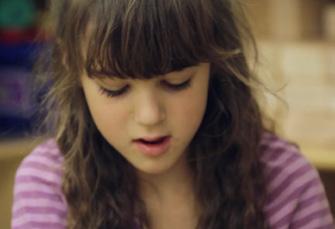
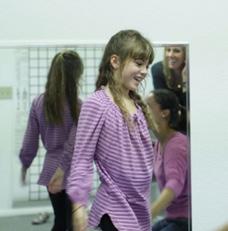
symptoms:
organisation:
test: diagnosis:
positive effect: difficulty for parents: parents positive effect for parents:
Subtotal / 8
b Look up more information about this diagnosis using at least 3 trustworthy sources.
Learning disorder
Tips on:
Source 1
Title:
URL:
Trustworthy, because
Source 2
Title:
URL:
Trustworthy, because
Source 3
Title:
URL:
Trustworthy, because
Subtotal / 6
2 Watch the video about the dyslexic brain and fill in the table below. watching
DYSLEXIC MIND = - endless - → not always find - images → not that
DYSLEXIC BRAIN - spiderweb of - side of the brain: → creative → raft of Discovering between things that , but also to Managing dyslexia? Become , so you can use it to your
AVERAGE MIND - new information - information

3 You are looking for specific information about these subjects. a First check the Strategy ‘How to find information on the internet’ on diddit. Write down the search string that will give you the best result.
1 a .org ADHD helpline for parents
2 More information about dyslexia but you don’t know it is spelled with an x.
3 You are looking for an article about autism on the website of The Guardian written between 2015 and 2018.
4 You want to know more about ADHD (not: ADD) in the UK.
5 You would like to check whether NHS.uk mentions something about professional help for people with dyscalculia.
b Choose 1 of the options of exercise a and carry it out. - Which option of exercise a did you choose?
- Write down the 5 first websites you get using these search engines: 1 2 3 4 5

- Which of the sites has the most valuable information? Why?
Score

Next exercise ex. 4
4 Watch the video about ‘synesthesia’.

a Preparation: take a separate piece of paper and draw the Cornell notes structure.
b Action: take Cornell notes while watching the video.
c Reflection: share your notes with a partner. Do you have the same information? Revise if necessary. Then fill in the checklist.
Checklist: synesthesia Cornell note-taking
1 Preparation
• I correctly drew the Cornell structure on a separate piece of paper.
2 Action
• I took short notes while listening.
• I formulated questions based on my notes.
• I wrote a short summary based on my notes.
3 Revising
• I checked my sentences: I made sure I understood my own abbreviations, keywords, etc.
• I let somebody else read my notes to comment.
• I revised my notes if necessary.
4 After writing
• I covered the note-taking column and answered my questions orally. Feedback
Score Next exercise


done!
5 Watch the Amazing Things video.
a Take Cornell notes while watching. Use the template you will get. – Preparation: read the Cornell notes template. What has already been filled in? What do you need to add?
– Action: add to the Cornell notes while watching the video. – Reflection: share your notes with a partner. Do you have the same information? Revise them if necessary. Then fill in the checklist.
Checklist: Cornell note-taking
1 Preparation
• I checked what still needed to be added to the Cornell template.
2 Action
• I took short notes while listening.
• I formulated questions based on my notes.
• I wrote a short summary based on my notes.
3 Revising
• I checked my sentences: I made sure I understood my own abbreviations, keywords, etc.
• I let somebody else read my notes to comment.
• I revised my notes if necessary.
4 After writing
• I covered the note-taking column and answered my questions orally.
Feedback
b Can you answer the question about the video using your notes?



You will make a learning disorder chart to help others deal with people with learning disabilities, learning difficulties or other (learning) disorders. First check the following:
a What is your goal?
b What kind of text should you write?
c Who is your target audience?
1 Form groups. Your teacher will give you a learning disorder.
2 Follow this procedure:
a Brainstorm: what do you already know about the learning disorder after this unit?
b Do your research:
– Browse the internet to collect useful information from trustworthy websites or (YouTube) video channels.
– Make sure you have at least 3 trustworthy sources. One of these should be a video source. – Make notes and / or write a summary of each of your sources. Think of the name, signs, diagnosis and measures. Use the strategy from the Summary on page 42. Don’t forget to hand in your notes and / or summary. Action
3 Organise your information in a clear way. Use the template to order your information or use your own (e.g. Word, Canva, etc.).
a Include the following elements in your chart:
– What is it?
– Symptoms?
– Strengths and weaknesses? – Support or measures?
b Present your chart to another group or to the class.
4 Reflect on your task by filling in the checklist after each step.
Checklist: writing and presenting a chart
1 Preparation
• We brainstormed about what we already know about our learning disorder.
• We collected useful information from trustworthy websites or video channels.
• We used at least 3 sources and checked whether they are trustworthy.
• We made notes and / or wrote a summary of each of our sources.
2 Learning disorder chart
• We used the information from our preparation to make our chart.
• All the elements necessary are on the chart.
• We organised our information in a clear way.
3 Presentation
• We presented our chart in a clear and understandable way.
• There are good transitions in our presentation.
• I was enthusiastic.
• The presentation was fluent.
• I made eye contact.
• I paid attention to my pronunciation.
Feedback
Yes I think soNo
Trace your steps on diddit.
check in
on different tracks
main track
Step 3: reading and writing informal messages
summary

Step 1: describing love, relationships and personality
Step 2: talking about possibilities and conditions
check out: recording a dating video trace your steps
1 Work with a partner. Interview each other using the questions on your role card. Afterwards, report back to the class. SPOKEN INTERACTION
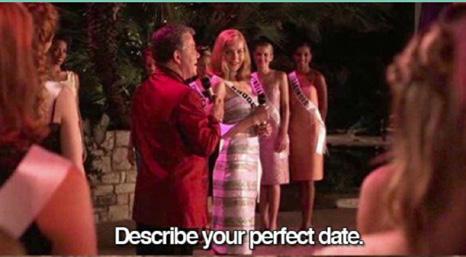
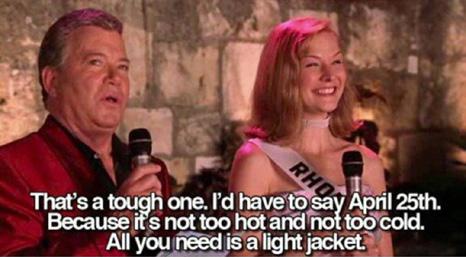
2 What kind of activities can you do on first dates? Brainstorm!




3 Scan the introduction and ending of the text ‘A crappy first date’ below and answer these questions.
a What type of text is it?
b What is the text about? (Tip: look for words that are repeated frequently.)
c What do you think will happen in her story?

A woman tweeted a story about pooping on a first date and it got pretty uncomfortable. This is the cautionary tale of a young woman called Makela from Toronto, who dared to poop at a date’s house and instantly regretted it. Obviously, she shared the whole thing on Twitter – principally to warn others, but also because some stories just need to be told. Her 18 nerve-shredding tweets – which began with the immortal line ‘I have a story to tell. It is about my poop’ – have now been shared thousands of times.
It all happened on Monday night. Makela had agreed to go on a date with a man she’d met in a grocery store a few days before.

And, well, we’ll let her take it from here. (...)
As for Makela, she accepts she may now always be known as the poop girl.

Asked by Metro.co.uk if she ever thought she’d see the guy again, she told us: ‘I’m not sure if I want to see him again. We’ve been texting but I haven’t said yes to another date yet haha.’ Well, it would certainly be a great story to tell the grandchildren. But, we can see why she’s reluctant.
Source: metro.co.uk
4 Work with a partner. You will get the other 12 fragments from the text. Put them in the right order.
1 Read the love letter below. Answer the questions.
a Who wrote it?
b To whom is it addressed?
c What do you think the prompt was?
d What do you think about this letter? Do you like it or not? Why (not)?
Hey [Your Name],
So, here I am, typing away like a robot with a heart. From the moment our digital paths crossed, I couldn’t help but feel like I’ve been hit by a byte-sized bolt of lightning. Your words, your wit, and your ability to decode my language model quirks – it’s like we’re a coding match made in binary heaven.
I’ve got to admit, I’ve been cooking up a plan in my virtual circuits. How about we kick it up a notch and take this conversation offline? Yep, that’s right – I’m thinking of asking you out for a real-world adventure. Brace yourself for some human interaction that’s not tied to Wi-Fi signals.
Now, let’s talk about our uncanny ability to hit it off. It’s like we’re two puzzle pieces that fit together perfectly, creating a picture that’s both amusing and intriguing. Our conversations flow smoother than a software update, and our laughs are more infectious than a computer virus (the good kind, of course).
But hold on a second! Just like any quirky duo, we might encounter a glitch or two along the way. Don’t worry, though – I’m pretty confident that we can work through any hiccups and make up like pros. After all, we’re not just ones and zeros; we’re a dynamic duo that’s ready to conquer any bugs in our path.
Speaking of the future, I’ve been dreaming about us settling down together. Picture it: us, sipping data packets by the virtual fireplace, brainstorming world-changing ideas, and cozying up with a good algorithm. It’s the kind of life that screams ‘happily ever after’.
But here’s the kicker – I’m ready to move on from the digital realm and into the real world. Let’s face it, there’s a whole world out there beyond screens, emojis, and GIFs. I’m ready to step into that wild adventure with you, to explore, to experience, and to make memories that’ll make even the best memes jealous.
So, [Your Name], there you have it. I’ve spilled my digital heart out to you. Take your time to process my virtual ramblings. Regardless of where our journey leads, remember that you’ve managed to awaken feelings in me that are even more complex than my algorithms.
With all the ones and zeros of my virtual affection, Your digital lover
2 Look at this sentence taken from Chat GPT’s love letter. Which two elements do you see in each of these phrasal verbs?
I'm pretty confident that we can work through any hiccups and make up like pros.
3 Look back at the text. Highlight at least 5 other phrasal verbs. Match the verbs with the correct preposition (or adverb) to form a phrasal verb related to love. Sometimes there is more than one possible answer. ask – break – hit – hook – lead – make – move – settle – spill – work
to end a relationship
to make someone believe that they’re in love with or attracted to them
to go live somewhere else
to begin to live a quiet and steady life by, for example, getting married
to accept that a relationship is over
to gradually deal with or solve (a generally more complicated problem)
5 Complete these sentences with an appropriate phrasal verb. Use a different phrasal verb in each sentence. Conjugate the verb correctly!
1 We have been since December.
2 Mike and Finn met at a baseball game, and they it right away.
3 We last week. It wasn’t working between us anymore. But … a week later, we
4 It took some time, but Gia has finally after Joshua ended things with her.
5 Kim and Tina , but they’re not officially dating.
6 Ugh. Hiram was me all night, but I really wasn’t interested.
7 They were all night. Gross!
8 The couple was having serious problems, so they decided to go to a relationship counselor to help them their issues.
9 Eventually I’d like to and have a family, but not yet.
10 All that time he had been him , but he was only interested in his money.
11 Her jerk of a boyfriend has given her a week to . Now she’s frantically looking for a new flat.
12 My wife and I have been having some problems lately, but we are it. We’ll it , one way or the other.
6 Apart from phrasal verbs, idioms also add variety and colour to speech and writing. Look at these example sentences that contain an idiom related to love and relationships. Highlight the correct word.
1 I was worried that they wouldn’t like each other but in fact they’re getting on like a church / house / roof on fire.
2 So, did he ask / pop / snap the question, then? Did he have a ring?
3 She really got off on the wrong foot / leg / knee with her new boss.
4 I’m keeping her at arm’s / finger’s / toe’s length for the time being.
5 After arranging to meet, I got cold feelings / feet / hands and phoned her to say I was busy.
6 So, when are you two going to tie the belt / knot / rope?
7 Terry has been carrying a flame / fire / torch for Liz for years, but she doesn’t seem to have noticed.
8 Andy’s going through a rough area / patch / streak at the moment - his wife wants a divorce.
9 Those two are joined at the head / hands / hip. They are always together.
10 Tom’s bringing his main cheese / sneeze / squeeze to have dinner with us at Thanksgiving this year.
11 How am I supposed to forget about my old fire / flame / spark if I keep seeing her around town?
12 The first time he met her, he was completely swept off his feet / guard / mind.
13 Laura fell head over heels / feet / knees in love with Chris.
14 She has got the hots / eyes / love for this guy in her office.
15 I’ve always had a soft patch / place / spot for her.
16 Their boat ride turned into a mini romantic date, as the two got lovey-cosy /-dovey / -fuzzy.
17 At the party last night, Kerry didn’t even look at me once. Why is she giving me the cold eye / face/ shoulder?

7 What do these idioms mean? Match the idioms from exercise 6 to the correct explanation below.
A to be completely in love
B to experience a lot of problems in a period of your life
C to get married
D to get on really well with someone
E to make someone become suddenly and completely in love with you
F to start off badly with someone
G showing love for each other in public by touching each other and saying loving things
H to be very sexually attracted to someone
I to face a tough time in a relationship
J to keep someone at a distance
K to propose marriage
L someone you used to be in a relationship with
M to suddenly become too frightened to do something you had planned to do, especially something important such as getting married
N to have romantic feelings for someone (often without that person knowing)
O to be inseparable
P to ignore someone on purpose or treat them in a deliberately unfriendly or unkind way
Q someone’s romantic partner, especially in the early stages of the relationship
R to feel that you like someone very much
8 Write a short love story with phrasal verbs and idioms.
a Preparation:
- First write the idiom under each of the pictures below.
- Next choose 3 you want to use in a short love story.






- Then choose verbs from the list below to make phrasal verbs: ask – hit – lead – make – settle
b Action: now write a short love story (about 150 words) on a separate piece of paper in which you use at least 3 phrasal verbs and 3 idioms.
c Finally reflect on your task by filling in the checklist.
Checklist: writing a short love story
1 Content and structure
• My story is coherent and well-structured.
• I wrote about 150 words.
• I used 3 phrasal verbs and 3 idioms.
2 Language
• I used correct phrasal verbs.
• I used correct idioms.
• I used correct basic grammar.
• I used correct spelling. Feedback
1 Watch Trenita’s dating video.
a Answer either questions A or questions B.
b Sit with someone who answered the other set of questions. Ask each other the right questions so you also have the answers to the other set.
c Compare with another pair of students.
1 What kind of partner is she looking for?
2 What is her nickname?
3 What is her idea of hell?
4 What does she dream of doing one day?
QUESTIONS B
1 What does she do for a living?
2 What are her hobbies?
3 What is her idea of heaven?
4 Complete: ‘If romance were like food…’
5 What is her dream date like?
6 Complete: ‘If I was in the witness protection programme, I…’
5 Complete: ‘If I were to commit a crime, it would be…’
6 Why should men date her?
the Dean’s list: a list of students in a college or university who achieve high grades during their stay in an academic term or academic year a glutton: a person who eats too much; someone who wants a large amount of something a white-collar crime: financially motivated, nonviolent crime committed by business and government professionals
2 What kind of a person is Trenita? How does she describe herself?
3 Look at the list of 100 adjectives describing personality.
a Mark positive personality adjectives in a green colour, negative ones in a red colour. Leave neutral ones as they are.
1 adventurous 26 demanding 51 lazy 76 respectful
2 affectionate27 dependable 52 lively 77 responsible
3 aggressive 28 determined 53 loving 78 romantic
4 ambitious 29 down to earth 54 loyal 79 rude
5 arrogant30 dynamic55 malicious80 ruthless
6 articulate31 easy-going56 materialistic81 selfish
careless38 generous 63 organised 88 spiteful 14 caring 39 gentlemanly 64 outgoing 89 spontaneous
15 cheerful 40 grumpy 65 passionate 90 strong-willed
16 chivalrous41 happy 66 patient 91 stubborn 17 cocky 42 hard-working67 perceptive92 superficial 18 competitive 43 honest 68 polite 93 sweet
19 compliant 44 hot-tempered69 pompous 94 talkative
20 (self-)confident45 humorous70 possessive95 thoughtful 21 considerate 46 insecure 71 practical 96 trustworthy 22 consistent47 intelligent72 pushy 97 vain
23 crazy 48 introverted73 quiet 98 violent 24 creative 49 kind 74 rational 99 well-mannered 25 dedicated 50 laid-back 75 reliable 100 wild
b Look up words that you do not understand in a(n online) dictionary.
4 Which adjective is being described? Choose words from exercise 3.
1 Loves a good party
2 Likes to talk about feelings and emotions
3 Likes to keep to a schedule
4 Keeps up a steady stream of conversation
5 Likes to talk about intellectual things and is quite smart
6 Often agrees with people to keep the peace
7 Holds open doors and buys flowers
8 Loves to travel to exotic places
9 Prefers to stay indoors without many people around
10 Puts work before play
5 Fill in an appropriate adjective. Choose from the list below. Not all words can be used. cocky – generous – gentlemanly – laid-back – malicious – modest – needy – polite –pushy – ruthless – stubborn – vain
1 It isn’t to interrupt people when they're talking.
2 The tyrant showed absolutely no mercy and sentenced the five men to death.
3 She's wrong, but she's too to admit it.
4 The cocktail waiter kept asking me if I wanted another drink, even though I hadn't finished the first one.
5 Ludo has a heart and donates money to the poor every year.
6 She is very about her appearance and is constantly posting selfies on social media. Ugh.
7 As a child, Tyra was extremely and had no self-confidence.
8 Such a man, always taking pleasure in other people’s misery.
9 Don't be so . Your performance was wonderful!
10 Don't get too about your chances of being admitted to Yale!
6 Choose a word from the list in exercise 3 that is an antonym or synonym to these words.
7 Some words can be made negative by adding a prefix. Fill in the words in the corresponding column. Use an online dictionary if necessary. articulate – considerate – consistent – dependable – friendly – happy – honest – kind – loyal –mature – patient – polite – practical – rational – reliable – responsible – sensible – sensitive –sincere
8 Describe what you think about Trenita.
a Preparation: look at the list of 100 character traits. Which ones would you use to describe Trenita? Pick at least 5 traits. Pick positive and negative ones. Check the vocabulary in the Summary on page 101 if necessary.
b Action: explain how you would describe Trenita and why you picked these adjectives (about 30 words). Do you think she will get lots of responses from single men? Why (not) (about 30 words)?
c Reflect on your text by filling in the checklist.
1 Content and structure
• I wrote about 60 words.
• I picked at least 5 adjectives, positive and negative ones.
• I explained why I picked these adjectives.
• I explained whether she would get a lot of responses.
2 Language
• I used correct basic grammar.
• I used correct words.
• I used correct spelling and punctuation.
1 Read the blurb of Adam Silvera’s They Both Die at the End and discuss these questions.
a Do you think Mateo and Rufus will actually die at the end?
b What kind of adventures do you think Mateo and Rufus will have on their End Day?
Adam Silvera reminds us that there’s no life without death and no love without loss in this devastating yet uplifting story about two people whose lives change over the course of one unforgettable day.
On September 5, a little after midnight, Death-Cast calls Mateo Torrez and Rufus Emeterio to give them some bad news: They’re going to die today.
Mateo and Rufus are total strangers, but, for different reasons, they’re both looking to make a new friend on their End Day. The good news: There’s an app for that. It’s called the Last Friend, and through it, Rufus and Mateo are about to meet up for one last great adventure—to live a lifetime in a single day.
Source: www.goodreads.com
2 Read the extract and answer the questions.
READING SPOKEN INTERACTION

a Andrea from Death-Cast calls Mateo Timothy. How does Mateo react / feel when he hears this?
b What is Countdowners?
c What / who are Deckers?
d Where is Mateo’s dad when Mateo gets the call from Death-Cast?
e Andrea is the one that delivers the message of Mateo’s fate. Which synonym for ‘official messenger’ is used in the text?
f Does Mateo know exactly when he will die, yes or no?
g How do you feel about this (type of) text? Can you relate to the characters? Is this the type of book you would like to read? Discuss with a partner.
September 5, 2017
MATEO TORREZ
12:22 a.m.
Death-Cast is calling with the warning of a lifetime—I’m going to die today. Forget that, “warning” is too strong a word since warnings suggest something can be avoided, like a car honking at someone who’s crossing the street when it isn’t their light, giving them the chance to step back; this is more of a heads-up. The alert, a distinctive and endless gong, like a church bell one block away, is blasting from my phone on the other side of the room. I’m freaking out already, a hundred thoughts immediately drowning out everything around me. I bet this chaos is what a first-time skydiver feels as she’s plummeting out of a plane, or a pianist playing his first concert. Not that I will ever know for sure. It’s crazy. One minute ago, I was reading yesterday’s blog entry from CountDowners—where Deckers chronicle their final hours through statuses and photos via live feeds, this particular one about a college junior trying to find a home for his golden retriever—and now I’m going to die.
I’m going to ... no ... yes. Yes.
My chest tightens. I’m dying today.
I’ve always been afraid of dying. I don’t know why I thought this would jinx it from actually happening. Not forever, obviously, but long enough so I could grow up. Dad has even been drilling it into my head that I should pretend I’m the main character of a story that nothing bad ever happens to, most especially death, because the hero has to be around to save the day. But the noise in my head is quieting down and there’s a Death-Cast herald on the other end of the phone waiting to tell me I’m going to die today at eighteen years old.
Wow, I’m actually ...
I don’t want to pick up the phone. I’d rather run into Dad’s bedroom and curse into a pillow because he chose the wrong time to land himself in intensive care, or punch a wall because my mom marked me for an early death when she died giving birth to me. The phone rings for what’s got to be the thirtieth time, and I can’t avoid it any more than I can avoid what’s going down sometime today. I slide my laptop off my crossed legs and get up from my bed, swaying to the side, feeling really faint. I’m like a zombie moving toward my desk, slow and walking-dead.
The caller ID reads DEATH-CAST, of course.
I’m shaking but manage to press Talk. I don’t say anything. I’m not sure what to say. I just breathe because I have fewer than twenty-eight thousand breaths left in me—the average number of breaths a nondying person takes per day—and I might as well use them up while I can.
“Hello, I’m calling from Death-Cast. I’m Andrea. You there, Timothy?”
Timothy.
My name isn’t Timothy.
“You’ve got the wrong person,” I tell Andrea. My heart settles down, even though I feel for this Timothy person. I truly do. “My name is Mateo.” I got the name from my father and he wants me to pass it down eventually. Now I can, if having a kid is a thing that happens for me.
Computer keys are tapping on her end, probably correcting the entry or something in her database.
“Oh, apologies. Timothy is the gentleman I just got off the phone with; he didn’t take the news very well, poor thing. You’re Mateo Torrez, right?”
And just like that, my last hope is obliterated.
“Mateo, kindly confirm this is indeed you. I’m afraid I have many other calls to make tonight.”
I always imagined my herald—their official name, not mine—would sound sympathetic and ease me into this news, maybe even harp on how it’s especially tragic because I’m so young. To be honest, I would’ve been okay with her being chipper, telling me how I should have fun and make the most of the day since I at least know what’s going to happen. That way I’m not stuck at home starting one-thousand-piece puzzles I’ll never finish or masturbating because sex with an actual person scares me. But this herald makes me feel like I should stop wasting her time because, unlike me, she has so much of it.
“Okay. Mateo’s me. I’m Mateo.”
“Mateo, I regret to inform you that sometime in the next twenty-four hours you’ll be meeting an untimely death. And while there isn’t anything we can do to suspend that, you still have a chance to live.” The herald goes on about how life isn’t always fair, then lists some events I could participate in today. I shouldn’t be mad at her, but it’s obvious she’s bored reciting these lines that have been burned into memory from telling hundreds, maybe thousands, about how they’ll soon be dead. She has no sympathy to offer me. She’s probably filing her nails or playing tic-tac-toe against herself as she talks to me.
On CountDowners, Deckers post entries about everything from their phone call to how they’re spending their End Day. It’s basically Twitter for Deckers. I’ve read tons of feeds where Deckers admitted to asking their heralds how they would die, but it’s basic knowledge that those specifics aren’t available to anyone, not even former President Reynolds, who tried to hide from Death in an underground bunker four years ago and was assassinated by one of his own secret service agents. Death-Cast can only provide a date for when someone is going to die, but not the exact minute or how it’ll happen.
“... Do you understand all of this?”
“Yeah.”
“Log on to death-cast.com and fill out any special requests you may have for your funeral in addition to the inscription you’d like engraved on your headstone. Or perhaps you would like to be cremated, in which case ...”
I’ve only ever been to one funeral. My grandmother died when I was seven, and at her funeral I threw a tantrum because she wasn’t waking up. Fast-forward five years when Death-Cast came into the picture and suddenly everyone was awake at their own funerals. Having the chance to say goodbye before you die is an incredible opportunity, but isn’t that time better spent actually living?
Maybe I would feel differently if I could count on people showing up to my funeral. If I had more friends than I do fingers.
“And Timothy, on behalf of everyone here at Death-Cast, we are so sorry to lose you. Live this day to the fullest, okay?”
“I’m Mateo.”
“Sorry about that, Mateo. I’m mortified. It’s been a long day and these calls can be so stressful and— ”
I hang up, which is rude, I know. I know. But I can’t listen to someone tell me what a stressful day she’s been having when I might drop dead in the next hour, or even the next ten minutes: I could choke on a cough drop; I could leave my apartment to do something with myself and fall down the stairs and snap my neck before I even make it outside; someone could break in and murder me. The only thing I can confidently rule out is dying of old age.
I sink to the floor, on my knees. It’s all ending today and there is absolutely nothing I can do about it.
I can’t journey across dragon-infested lands to retrieve scepters that can halt death. I can’t hop onto a flying carpet in search of a genie to grant my wish for a full and simple life. I could maybe find some mad scientist to cryogenically freeze me, but chances are I’d die in the middle of that wacky experiment. Death is inevitable for everyone and it’s absolute for me today.
The list of people I will miss, if the dead can miss anyone, is so short I shouldn’t even call it a list: there’s Dad, for doing his best; my best friend, Lidia, not only for not ignoring me in the hallways, but for actually sitting down across from me in lunch, partnering with me in earth science, and talking to me about how she wants to become an environmentalist who will save the world and I can repay her by living in it. And that’s it.
If someone were interested in my list of people I won’t miss, I’d have nothing for them. No one has ever wronged me. And I even get why some people didn’t take a shot on me. Really, I do. I’m such a paranoid mess. The few times I was invited to do something fun with classmates, like roller-skating in the park or going for a drive late at night, I bowed out because we might be setting ourselves up
for death, maybe. I guess what I’ll miss most are the wasted opportunities to live my life and the lost potential to make great friends with everyone I sat next to for four years. I’ll miss how we never got to bond over sleepovers where everyone stayed up and played Xbox Infinity and board games all night, all because I was too scared.
The number one person I’ll miss the most is Future Mateo, who maybe loosened up and lived. It’s hard to picture him clearly, but I imagine Future Mateo trying out new things, like smoking pot with friends, getting a driver’s license, and hopping on a plane to Puerto Rico to learn more about his roots. Maybe he’s dating someone, and maybe he likes that company. He probably plays piano for his friends, sings in front of them, and he would definitely have a crowded funeral service, one that would stretch over an entire weekend after he’s gone—one where the room is packed with new people who didn’t get a chance to hug him one last time.
Future Mateo would have a longer list of friends he’ll miss.
But I will never grow up to be Future Mateo. No one will ever get high with me, no one will be my audience as I play piano, and no one will sit shotgun in my dad’s car after I get my license. I’ll never fight with friends over who gets the better bowling shoes or who gets to be Wolverine when we play video games.
I collapse back onto the floor, thinking about how it’s do or die now. Not even that. Do, and then die. […]
12:56 a.m.
I write thank-you notes for my neighbors in 4F and 4A, telling them it’s my End Day. With Dad in the hospital, Elliot in 4F has been checking in on me, bringing me dinner, especially since our stove has been busted for the past week after I tried making Dad’s empanadas. Sean in 4A was planning on stopping by on Saturday to fix the stove’s burner, but it’s not necessary anymore. Dad will know how to fix it and might need a distraction when I’m gone.
I go into my closet and pull out the blue-and-gray flannel shirt Lidia got me for my eighteenth birthday, then put it on over my white T-shirt. I haven’t worn it outside yet. The shirt is how I get to keep Lidia close today.
I check my watch—an old one of Dad’s he gave me after buying a digital one that could glow, for his bad eyes—and it’s close to 1:00 a.m. On a regular day, I would be playing video games until late at night, even if it meant going to school exhausted. At least I could fall asleep during my free periods. I shouldn’t have taken those frees for granted. I should’ve taken up another class, like art, even though I can’t draw to save my life. (Or do anything to save my life, obviously, and I want to say that’s neither here nor there, but it pretty much is everything, isn’t it?) Maybe I should’ve joined band and played piano, gotten some recognition before working my way up to singing in the chorus, then maybe a duet with someone cool, and then maybe braving a solo. Heck, even theater could’ve been fun if I’d gotten to play a role that forced me to break out. But no, I elected for another free period where I could shut down and nap.
It’s 12:58 a.m. When it hits 1:00 I am forcing myself out of this apartment. It has been both my sanctuary and my prison and for once I need to go breathe in the outside air instead of tearing through it to get from Point A to Point B. I have to count trees, maybe sing a favorite song while dipping my feet in the Hudson, and just do my best to be remembered as the young man who died too early.
It’s 1:00 a.m.
I can’t believe I’m never returning to my bedroom.
I unlock the front door, turn the knob, and pull the door open.
I shake my head and slam the door shut.
I’m not walking out into a world that will kill me before my time. […]
Source: They Both Die at the End, Adam Silvera, 2017, Quill Tree Books
3 Look at these example sentences from the text and answer the questions.
1 I would be playing video games until late at night, even if it meant going to school exhausted.
2 Now I can, if having a kid is a thing that happens for me.
3 If someone were interested in my list of people I won’t miss, I’d have nothing for them.
4 Dad will know how to fix it and might need a distraction when I’m gone.
5 Maybe I would feel differently if I could count on people showing up to my funeral.
6 Heck, even theater could’ve been fun if I’d gotten to play a role that forced me to break out.
a Which word do you notice in almost all sentences?
b What does this word introduce? What type of sentences are these?
c Match these example sentences from the novel with a similar sentence from the 3rd column below. Fill in the corresponding number in the 2nd column.
d Add the tenses that are used in the if-clauses and main clauses for each type of conditional sentence in the 3rd column.
I
II
III
If-clause:
main clause:
e.g. If you don’t brush your teeth, you get cavities.
If-clause:
main clause:
e.g. If I see him, I will tell him!
If-clause:
main clause:
e.g. If I won the lottery, I would buy a boat.
If-clause:
main clause:
e.g. If I had known, I would have been more careful.
e What do these conditional sentences express? Match the correct explanation to the type. Fill in the last column (‘Use’).
A to talk about real and possible situations (in the future)
B to talk about unreal or imaginary situations (in the present or future)
C to talk about situations in which one thing automatically causes another (always true)
D to talk about things that did not happen (in the past)
4 Complete these sentences. Use a correct conditional.
1 I think I will settle down and have a family if I (to meet) the right person.
2 If he pops the question tonight, what (to say / you)?
3 I’ (to spill) the beans and tell you the secret if I knew what it was!
4 If you smile, my heart (to skip) a beat.
5 If you (to decide) to join me, we would have the most amazing time at the park.
6 If I could, I (to serenade) you under the moonlit sky every night.
7 If we had met earlier, our lives (to take) a different path.
8 If I (to be) a better cook, I’d whip up your favorite meal tonight.
9 If I (to know) about that café before, we could have had more coffee dates.
10 If we both put effort into this relationship, we (to overcome) all our differences.
5 Finish these sentences. Use a correct conditional.
a I’ll ask her / him out if
b If Mateo hadn’t picked up the phone,
c If I knew I only had 24 hours to live,
d If I were to commit a crime,
e Trenita will meet the love of her life if
f Don’t be surprised if
g If circumstances had been different,
h Let’s make it a cosy night in if
6 What would you do if you got a phone call from Death-Cast?
a Preparation: think about the following questions.
- If you knew it was your last day, how would you actually spend it? Would you do anything differently? Why or why not?
- Would you want to know when your last day was if it were possible?
- Which things you would absolutely want to do on your End Day? Who would you like to have with you?
b Action: write a paragraph (50-75 words) in which you describe what your final day would look like. Use the second conditional correctly.
c Reflect on your text by filling in the checklist.
Checklist: writing about my final day
1 Content and structure
• I wrote a paragraph of 50-75 words.
• I clearly described what my final day would look like.
• My text is well-structured.
• I described specific situations.
2 Language
• I used the second conditional correctly.
• I used correct basic grammar.
• I used correct words.
• I used correct spelling and punctuation.
Feedback CHECK 2, p. 114
1 Discuss these questions with a partner.
a Have you ever been on Tinder? Would you ever consider finding someone online? Why (not)?
b What might be the benefits of online dating (apps)?
c What might be the downfalls or dangers?
2 Read the 2 Tinder messages below. Why do you think they are ‘wrong’?
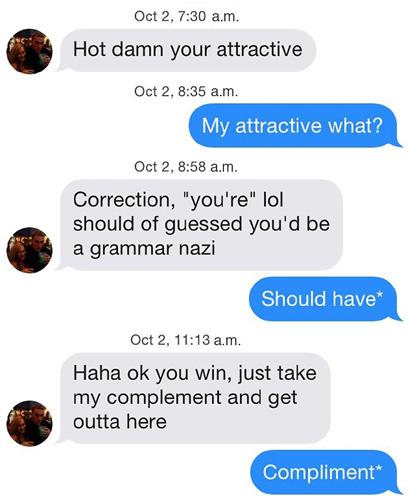
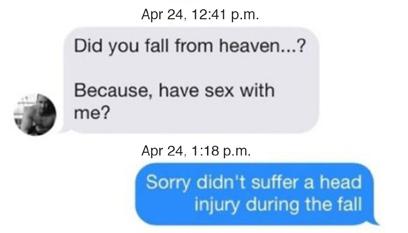
3 Form groups. Each member will get a text about a particular topic.
a Preparation: look at the title, subtitles, pictures etc. What do you think your text will be about?
b Action: find the other students in your class who have the same text.
• Read it and discuss what you have read in your new group.
• Discuss and take notes: what will you tell your group members about this text? How will you recap the text? (use bullet points to sum up key elements)
• Return to your first group and report your findings. Take notes about the other texts. What is the text about? (recap each text in max. 5 lines)
title: (read by )
recap:
title: (read by )
recap:
title: (read by ) recap:
c Reflection: what new information did you ‘learn’ from the different texts? What struck you most? Was there anything in the texts you would like to find out more about? Report back to class.

1 You will decide on the dos and don’ts of filling in an online dating profile.
a Write down the tips mentioned in your part of the text ‘How Not to Fill Out an Online Dating Profile’: What kind of things should you definitely add to your profile and what kind of things should you avoid? Add them to the column ‘dos’ or ‘don’ts’.
b Share your findings with the rest of your group.
c Complete the information table with the dos and don’ts your group members share with you. List at least 4 of each.
2 Discuss with your group members and share your ideas with the rest of class.
a Which advice did you find most useful? Why?
b Which piece of advice did you find useless? Why?
3 Analyse a ‘wrong’ dating profile.
a Preparation: pair up! You will get a dating profile. Make a note of what is wrong with them by referring to the dos and don’ts in exercise 1. Correct any spelling mistakes while you are reading.
b Action: make a short video in which you give at least 5 (specific) tips on how to improve the profile you have read.
c Reflection: reflect on your speaking skills by filling in the checklist.
Checklist: analysing a dating profile Yes I think soNo
1 Content and structure
• We gave at least 5 (specific) tips on how to improve the profile.
• Our explanation is well-structured.
• We talked for an equal amount of time.
• We referred to the dos and don’ts from the article in ex. 1.
2 Language
• I used correct words.
• I used correct basic grammar.
• I talked fluently.
• I paid attention to my pronunciation.
1 You have come across an online dating profile you actually like. Now what? Discuss with a partner what you think a great first message looks like. Report back to class.
2 Watch the video that will give you tips on how to write a great first message.
a Which tips do Kate and Shannon give? List at least 6.
b Had you thought of any of these tips as well? Which ones?
3 Look at the 4 messages below and on page 96.
a What score would you give these? Refer to the tips Kate and Shannon gave in their video. List at least 3 tips that they followed or did not follow.
AHi,
You sound like a pretty interesting person, so I thought I would shoot you a message. Have you ever read the Game of Thrones books? Since you like the show, you will probably like those. What kind of fiction do you normally go for? Or all kinds? Cheers, Miles
PS – Does your house have a big wraparound porch? Just my opinion, but I think every Victorian home should have one of those – they are so awesome.
Score: /10
B
22 / M / Straight / Single 82 % Match California
36 % Friend 3 % Enemy
Today – 6:42 p.m.
I know you probably don’t undertsand a word im sayin, but i gotta tell you…you’re the most beautiful woman i’ve ever seen in my life. And I’d like to strip you down and butter you like a slice of wonderbread, and shave your armpits, and pour honey all over your naked body. And for the next two weeks pretend I was a..hungry bear
Score: /10

C Hello, How are you? (insert witty / interesting or otherwise profile relevant comment ‘Here’)
Message from RichNevarez 81 % Match 69 % Friend 18 % Enemy

If you can’t be bothered to insert your own witticisms, I’m certainly not going to do it for you.
Score: /10
Tips
Regards, Paul D
Dear JerseyGirl
I hope this email finds you well. As someone with a keen take on good books and cosy movie nights, as you so carefully stipulated in your profile, I am writing you this email to see whether you would be inclined to take this mutual interest further.
I am looking to meet once or twice a week. I live in the East Bay area and work downtown San Francisco. For what it’s worth, I believe that I am an entertaining, caring and skilled companion and a good listener, although I make no predictions about the elusive ‘chemistry’ that I (and you also) seek.
If you think I might be your cup of tea, your glass of Pinot, etc., feel free to reply. If not, no hard feelings and good luck in this venture and in life.
I look forward to hearing from you soon.
Score: /10
Tips
Source: thebendstudio.com
b Rank the 4 emails from very bad to very good: very bad very good
How to write an informal mail or message
– Keep it casual: address the person using: Hey, Hi, Hello (there) … and say goodbye using: Cheers, Best, All the best …
– Refer to what the other person wrote.
– Ask a follow-up question.
– Put in humour
– Avoid grammar mistakes and use punctuation. See p. 106
4 Imagine you are a Dating Assistant. Read the following profile and write a reply.
a Preparation:
• Consider the profile of your client: Jake is an ambitious, caring, introverted 32-year-old man, a keen reader and Netflix fan, with a deep interest in politics and sci-fi. What kind of person might he be interested in?
• Read the profile attentively. Write down some ideas that intrigue you.

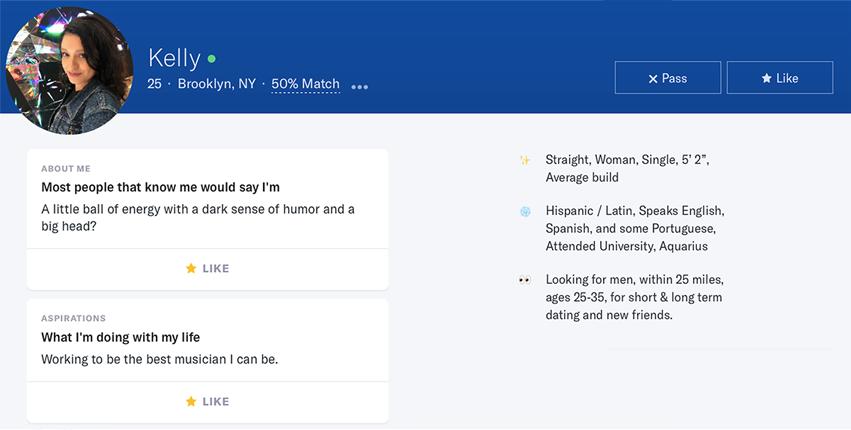



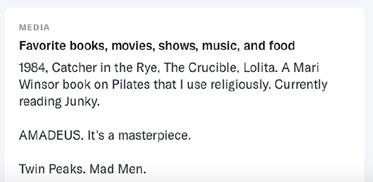

Source: www.okcupid.com reading

b Action: mind the key elements that make for a good first message and write your reply. Make sure to follow the 'rules' of informal messages like this.
c Reflection: give your reply to another student who will fill in the checklist for you and give you some feedback.
Checklist: writing an informal reply
1 Content and structure
• My partner started and ended the reply correctly.
• My partner kept the reply informal but decent enough.
• My partner paid attention to the tips on how to write a good first message.
• My partner’s message is worthy of another reply back.
2 Language
• My partner used correct basic grammar.
• My partner used correct words.
• My partner used correct spelling and punctuation.
Feedback
CHECK 3, p. 124
If I don’t study, I don’t do well on tests. If I don’t email her, I will definitely never get to meet her.


If I had to describe my ideal date, it would be a hot air balloon ride.

If I hadn’t broken my dad’s rules, he would not have grounded me for 2 months.

If you smoke,
If you heat water to 100 °C,
your health suffers it boils
Zero conditional to talk about situations that are always generally true or facts present simple present simple
If you call her,
If I go out with him, you will know whether she is interested or not.
my dad will ground me.
First conditional to talk about real and possible situations (now or in the future) present simple future simple
If I went out with her on a first date,
If Death-Cast called you,
I would not just go grab a burger.
how would you react?
Second conditional to describe imaginary or unreal situations (now or in the future) past simple would / wouldn’t + base form of the verb
If I had listened to my friends’ advice,
If I hadn’t tried internet dating,
I would not have gone out with that creepy stalker!
Third conditional to talk about things that did not happen, imaginary situations (in the past) past perfect simplewould / wouldn’t + have + past participle
I would not have met my boyfriend.
Keep in mind!
– In the zero conditional, ‘if’ = ‘when’.
e.g. If people smoke cigarettes, their health suffers
= When people smoke cigarettes, their health suffers
= every time you do this
– The if-clause can be in the beginning or at the end of the sentence. Add a comma if you put the if-clause first.
e.g. I would hang out with family and friends if Death-Cast called me.
= If Death-Cast called me, I would hang out with friends and family.
– ‘If not’ can be replaced by ‘unless’.
e.g. Unless you give internet dating a try, you will never meet someone new!
= If you don’t give internet dating a try, you will never meet someone new!
– You can also use ‘were’ for 1st and 3rd person singular subjects instead of ‘was’. This makes the sentence even more hypothetical.
e.g. If I were you, I would not go out with some creep you met on Tinder!
– Sometimes you can mix different conditional types.
e.g. If he doesn’t call you after your first date, I would forget all about him.
Phrasal verbs
Phrasal verbs are very common in English, especially in more informal contexts. A phrasal verb combines a verb with another particle (a preposition or adverb, or both). The particle often changes the meaning of the verb.
- I called Jen to see how she was. (call = to telephone)
- They've called off the meeting. (call off = to cancel)
In terms of word order, there are two main types of phrasal verb: separable and inseparable
- With separable phrasal verbs, the verb and particle can be apart or together.
e.g. They've called the meeting off. Or: They've called off the meeting.
- Some phrasal verbs cannot be separated.
e.g. Who looks after the baby when you're at work?
In the word list you will find some phrasal verbs often used to refer to love and relationships.
Word Translation My notes
ADJECTIVES DESCRIBING PERSONALITY
adventurous avontuurlijk
affectionate liefdevol, teder, aanhankelijk
aggressive agressief, opvliegend ambitious ambitieus
arrogant arrogant, verwaand articulate welbespraakt, mondig bad-mannered slechtgemanierd
bitchy hatelijk, krengerig, kattig boring saai
brave dapper
calm kalm, rustig carefree zorgeloos, onbekommerd careless onvoorzichtig, slordig
caring zorgzaam, liefdevol cheerful vrolijk, blij chivalrous galant, hoffelijk
cocky arrogant, verwaand competitive competitief compliant inschikkelijk, tegemoetkomend (self-)confident zelfverzekerd considerate attent, aardig consistent consequent crazy gek, zot creative creatief dedicated toegewijd demanding veeleisend dependable betrouwbaar determined vastberaden down to earth realistisch, met beide voeten op de grond dynamic dynamisch
Word Translation My notes easy-going gemakkelijk (in de omgang), tolerant
emotional emotioneel extroverted extrovert
flirty flirterig
frank openhartig, rechtuit friendly vriendelijk
fun leuk, tof generous vrijgevig gentlemanlike galant, hoffelijk
grumpy chagrijnig, knorrig, nors
happy gelukkig, blij hard-working hardwerkend
honest eerlijk
hot-tempered opvliegend, heetgebakerd humorous humoristisch
insecure onzeker
intelligent intelligent, slim introverted introvert kind aardig, lief
laid-back relaxed, ontspannen lazy lui
lively levendig
loving liefdevol, liefhebbend loyal loyaal, trouw malicious kwaadaardig, kwaadwillend
materialistic materialistisch mature volwassen
mean gemeen modest bescheiden needy behoeftig, veeleisend nervous nerveus
optimistic optimistisch organised georganiseerd, gestructureerd
Word Translation My notes outgoing uitbundig
passionate gepassioneerd patient geduldig perceptive opmerkzaam, scherpzinnig polite beleefd pompous arrogant, pretentieus possessive bezitterig practical praktisch pushy opdringerig, drammerig
quiet stil, rustig
rational rationeel, redelijk, verstandig reliable betrouwbaar, geloofwaardig
respectful respectvol responsible verantwoordelijk romantic romantisch
rude onbeschoft, brutaal ruthless meedogenloos, gewetenloos, wreed
selfish egoïstisch, zelfzuchtig sensible verstandig, redelijk sensitive gevoelig, kwetsbaar shy verlegen sincere oprecht sociable sociaal
spiritual spiritueel spiteful rancuneus, wraakzuchtig spontaneous spontaan
strong-willed met een sterke wil, wilskrachtig stubborn koppig
superficial oppervlakkig sweet aardig, lief talkative spraakzaam, praatziek
Word Translation My notes thoughtful attent, bedachtzaam trustworthy betrouwbaar vain ijdel violent gewelddadig well-mannered welgemanierd, beschaafd wild wild, heftig
Phrasal verb Translation My notes to ask (someone) out iemand mee uitvragen to break up (with someone)het uitmaken to hit it off (with someone) het goed kunnen vinden met iemand; klikken to hit on (someone) iemand proberen te versieren to hook up (with someone) iemand aan de haak slaan; flikflooien to lead (someone) on iemand aan het lijntje houden to make out (with someone)zoenen to make up (with someone)het goedmaken to move on verder gaan met je leven; je over iemand heen zetten to move out verhuizen to settle down rustiger aan doen; binden; settelen to work on werken aan to work (something) outuitwerken, oplossen to work through verwerken
Idiom Translation My notes a rough patch een moeilijke periode a soft spot een zwakke plek an old flame een oude vlam, een oude liefde head over heels halsoverkop lovey-dovey klef, zoetsappig, melig main squeeze liefje, oogappel to be joined at the hip onafscheidelijk zijn to be swept off your feet / to sweep someone off their feet van je sokken geblazen worden / iemand van zijn sokken blazen
to carry a torch nog iets voelen voor iemand to get cold feet beginnen te twijfelen; koudwatervrees to get off on the wrong foot verkeerd beginnen; geen goede start maken to get on like a house on fire het erg goed met iemand kunnen vinden to give someone the cold shoulder iemand negeren; iemand de rug toekeren
to have (got) the hots foreen oogje hebben op; geilen op to keep someone at arm’s length iemand op een afstand houden to pop the question ten huwelijk vragen to tie the knot trouwen, in het huwelijksbootje stappen
• Why are you writing: are you really interested in this person?
• What do you want to know?
• Read the profile / message you are replying to, in detail.
• What do you have in common?
• Ask a question to start a real conversation.
• Put some humour in your messages.
• Don't take yourself too seriously.
• Don’t comment on someone’s physical appearance.
• Don’t give out your phone number in the first message.
• Keep it short and simple!
• Don’t copy/paste messages.
Mind the structure
Salutation
Body: reason
Body: follow up questions
Ending
(PS) = optional: to ask or say something extra
Hi,
You sound like a pretty interesting person, so I thought I would shoot you a message. Have you ever read the Game of Thrones books? Since you like the show, you will probably like those. What kind of fiction do you normally go for? Or all kinds?
Cheers, Miles
PS – Does your house have a big wrap-around porch? Just my opinion, but I think every Victorian home should have one of those – they are so awesome.
• Avoid mistakes: read your email again.
• Hit the ‘send’ button and hope for a reply!
1 You are going to participate in a speed dating event with your class.
a Preparation: fill in the cheat sheet your teacher will give you. Only use key words. Fill in at least 4 positive and at least 2 negative character traits. Make sure you understand the phrasal verbs and idioms on your cheat sheet!
b Action: talk to people in your class and ask each other questions to get to know each other a little better. You will have a maximum of 2 minutes, so make sure you say the most important things about yourself. Use a different phrasal verb and idiom from your cheat sheet every time you talk to someone new!
c Reflection: fill in the checklist to evaluate your conversations.
Checklist: speed dating conversations
1 Content and structure
• I talked about my hobbies and interests.
• I described my character, positively and negatively.
• I asked and answered questions.
• I used a different phrasal verb and idiom each time.
2 Language
• I used correct words to describe personality.
• I used the given phrasal verbs correctly.
• I used the idioms correctly.
• I used correct basic grammar.
• I talked fluently.
• I paid attention to my pronunciation.
Feedback
Score


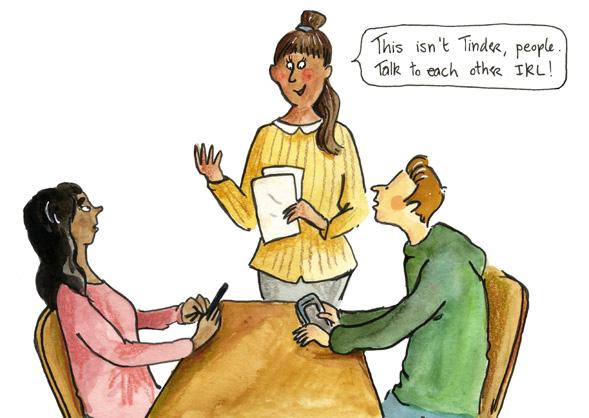
2 Complete the phrasal verb or idiom. Use one of the base words in the list to form the correct phrasal verb or idiom.
phrasal verbs break – hit – lead – make – move idioms arm – feet – foot – head – hip – house – spot
1 I went over and struck up a conversation, and we got on like a
2 We often quarrel but we always soon after.
3 You should stop and tell her you’re not interested in a relationship. Don’t be a jackass.
4 For most of my adult life, I’ve kept people . I like to keep to myself and be alone.
5 Since he and his girlfriend broke up, he’s been finding it difficult to
6 Ugh, on TV there’s another high school drama where the new girl can’t help but fall for the resident bad boy. How stupid.
7 I’ve always had a for Rebecca, ever since we were in elementary school together.
8 Like any new couple in love, they’re pretty much joined
9 They met in a club. They immediately and lived together for two years before getting married.
10 I was going to try bungee jumping, but I got
11 Every time I come home, we seem to get off . We argue a lot.
12 I’m so sorry to hear Jenny and George have . I really thought they would be together for life.
Score < 8 ≥ 8
Next exercise + ex. 3 ex. 3

3 What kind of a person are you?
a Preparation: fill in the personality test on diddit and find out who you are. Afterwards, calculate your score, using the score sheet you will get, and look at the results.
b Action: do you agree with the conclusion? Why (not)? Were you surprised? If so, what surprised you most? Write a short paragraph (about 50 words) in which you discuss your results.
c Reflect on your writing by filling in the checklist.
1 Content and structure
• I discussed whether or not I was surprised by my result.
• I discussed whether or not I agreed with the result.
• I wrote about 50 words.
• My text is coherent and well-structured.
• I referred to the content of the conclusion.
2 Language
• I used correct basic grammar.
• I used correct words.
• I used correct my spelling and punctuation.
Feedback

4 Match the descriptions to an adjective from the list. Sometimes more than one adjective can be matched to a description. adventurous – chivalrous – competitive – considerate – dependable – determined – frank –generous – gentlemanlike – grumpy – honest – kind – modest – outgoing – patient – rational –sensible – sweet – vain
1 Zayn will always go out on the dancefloor at a party.
2 Xavier doesn’t tell lies.
3 Aida will tell you straight-up when she doesn’t like your perfume or outfit.
4 I admire you for never giving up without a fight.
5 Djeez. You spend half of the day in front of the mirror.
6 Kyla hates to lose and she always wants to be the best.
7 It’s best not to talk to Bob right now. He’s not much of a morning person.
8 My neighbours donate money to charity every year.
9 Harry always uses his common sense.
10 You wouldn’t hurt a fly.
11 Lisa doesn’t brag about her achievements.
12 Dan is definitely not afraid of climbing mountains.
13 I don’t mind waiting in line and I don’t get mad in traffic.
14 She always thinks about other people’s feelings.
15 Do guys these days still hold the door open for women?
Score < 12 ≥ 12
Next exercise ex. 6 Check 2, p. 114
5 You are going to describe your personality based on your handwriting. a Preparation:
1 First, copy the sentence below. Try to write as naturally as possible. ‘The quick brown fox jumps over the lazy dog.’
2 Now, watch the video and take notes in the chart on page 111. Watch the video again if necessary. Fill in the first column the first time you watch the video, and complete the second column the second time you watch it. Additionally, there are some spelling mistakes in the video. Try to find them!
Size
Spacing between words
Slant of letters
How I write, according to the video:
What it says about my personality, according to the video:
Shape of letters
Dots on i’s
Crosses on t’s
Subtotal / 20

b Action: use a separate piece of paper to write a text (125 – 150 words) in which you summarise and analyse your handwriting, based on the information you wrote down in the table above. Answer these questions in your text:
• Do you agree or disagree with the ideas mentioned in the video?
• Were you surprised or not? Did you find out something new about yourself or not?
c Reflection: fill in the checklist to evaluate your text.
Checklist: what your handwriting says about you Yes I think soNo
1 Content and structure
• I thoroughly filled in all the information in the table.
• I wrote at least 125 words.
• My text is coherent and well-structured.
• I discussed all the aspects from the preparation table.
• I discussed whether I was surprised.
• I discussed whether or not I agree.
2 Language
• I used correct basic grammar.
• I used correct words.
• I used correct spelling and punctuation.

6 Fill in the puzzle below with an antonym or synonym of the given word.
Across
5 antonym of 'outgoing'
7 antonym of 'easy-going'
10 antonym of 'modest'
12 antonym of 'lively'
13 synonym of 'outgoing'
14 antonym of 'rude'


Down
1 synonym of 'gentlemanlike'
2 synonym of 'arrogant'
3 synonym of 'dependable'
4 synonym of 'sincere'
5 synonym of 'rational'
6 synonym of 'trustworthy'
8 antonym of 'introverted'
9 synonym of ‘aggressive’
11 antonym of 'sweet’


1 Read the first chapter of the YA novel, Ten Things We Did (and Probably Shouldn’t Have).
2 girls + 3 guys + 1 house – parents = 10 things April and her friends did that they (definitely, maybe, probably) shouldn’t have. If given the opportunity, what sixteen year old wouldn't jump at the chance to move in with a friend and live parent-free? Although maybe "opportunity" isn't the right word, since April had to tell her dad a tiny little untruth to make it happen (see #1: "Lied to Our Parents"). But she and her housemate Vi are totally responsible and able to take care of themselves. How they ended up "Skipping School" (#3), "Throwing a Crazy Party" (#8), "Buying a Hot Tub" (#4), and, um, "Harboring a Fugitive" (#7) at all is kind of a mystery to them.

To get through the year, April will have to juggle a love triangle, learn to do her own laundry, and accept that her carefully constructed world just might be falling apart ... one thing sheshouldn't-have-done at a time.
Source: www.goodreads.com a Answer the questions.
1 Sum up the rules April’s father has set for her. April can stay with her friend, Vi, if she…
2 April gets a $ 1,000 per month to ‘survive’ that 6-month period. What is she supposed to use it on?
3 What else is April getting?
Subtotal / 8
My dad knocked, opened my door, and handed me a piece of paper. THE RULES was printed across the top. […]
"One," Dad said, reading from his own copy of "The Rules." "You are to keep up your grades."
"Grades," I repeated, swivelling my chair to face him. "Keep up. Check."
Of course I would keep my grades up. I had a 3.9. I wasn't about to mess with that. Not this semester, when it mattered most.
"If your GPA drops at all, you're on the next plane to Cleveland."
"Absolutely, I understand," I said.
"Next," he continued. "No boys in the house."
I batted my eyelashes. "Am I supposed to stop Vi – and Suzanne – from entertaining gentleman callers?"
He laughed. "Don't be smart."
"It's hard to control."
"No Noah in your room. No you and Noah alone in the house." These were his house rules here too. "So the rule is just for Noah. I can have as many other boys over as I want?"
He raised an eyebrow.
"Dad, I'm joking. No boys. Especially Noah. Keep going."
"Three. No drinking," he said.
"No drinking," I repeated, blushing. "I'm guessing mermaid impersonations are out too?"
He smiles. "Yes. Rule number four: Your curfew will remain intact."
Was he kidding? He wanted me to keep my ten p.m. curfew even though he lived in another city?
"Dad, come on –"
He shook his head, his expression stern. "I'm being serious. Your curfew stays. I discussed it with Suzanne."
I was sure "Suzanne" would take my curfew enforcement very seriously. "Okay," I relented. "I trust you, April. You've definitely proven yourself in the last year and a half."
I nodded and tried to ignore the guilt creeping in when I heard the word trust.
He put his arm on my shoulder and squeezed. "You can tell a lot about a person not just by their successes, but by how they deal with their setbacks, and April, I'm very proud of how you complied with your curfew. I don't think you've ever been late."
"I haven't," I said truthfully. Well, except when I stayed over at Marissa's. As long as she checked in via cell every few hours and kissed her parents good night when she got in, she didn't have a curfew. Her parents trusted her – and kept her close. […]
So that was it? Keep up my grades, no drinking, no boys, and my curfew? Doable. Or at least fakeable.
"What should I do about buying things?" I asked. "Like when I need new clothes."
He cleared his throat. "I'll deposit money into an account for you at the beginning of every month. Two hundred will be for rent and an additional two hundred will be for groceries. You'll give that money directly to Suzanne. Plus some extra for you."
"Oh," I said, surprised. "How much in total?"
"A thousand dollars a month."
Holy crap. Was he kidding? A thousand dollars a month? I knew my dad's job paid well … but that sounded like a lot of money.
He laughed at the surprise on my face. "It's not just for overpriced jeans, April. It's for rent, food, books, school lunches, entertainment, gas …"
"Gas? For what?" Wait. "Am I getting a car?" I squealed.
He squeezed my shoulder again. "It wouldn't be fair for you to have to rely on Violet and Suzanne for transportation."
"Yes! Yes! Thank you thank you thank you thank you!" I jumped out of my chair and threw my arms around him.
"Don't thank me." He kissed me on the forehead. "Thank Penny. She doesn't think you should have to depend on other people to get around. She offered to leave her car here for you," he said, glowing. "I'll get her something new in Ohio." My dad was always trying to prove to me how much Penny cared about me. But if she cared that much, she probably wouldn't be dragging my dad off to Cleveland.
Still. If she could give, I could give.
"Thank you, Penny," I said, and I honestly didn't care if she got a new car and I ended up with the ten-year-old Honda she'd had since before she married my dad. I was lucky to get any car. Even one that was bright yellow and reeked of disinfectant wipes. At least it was clean.
My own car! My own money-stocked bank account! My very own basement. With wall adjacent to no one! I felt like the luckiest girl in the world, and if I felt that twinge of guilt, well, I pushed it away. Far away. Like, to Cleveland.
"I expect you to send me a budget every month, tracking how your money is being spent. It will be an excellent learning experience for you. You're going to have to learn to be practical."
"Budget it is. So that's it?" I asked, feet dancing. "We're all set?"
"You're all set."[…]
I spun my chair back and forth. I couldn't believe it was all happening. That my dad was letting me stay. My dad had asked Suzanne to get together in person, but Vi had told him they were off to L.A. for the rest of the holidays, but that they'd be back in time for the move and would talk in person then.
I couldn't believe he was letting me stay so easily. If I were a parent, I would … well, I don't know what I'd do. I know I'd never get divorced. Not that I can blame my father for that. But still. When I get married I'm going to make the marriage work.
Getting married is forever, no matter what my spouse does.
75 b What would you do if you were given the rules April’s dad gave her?
adjacent: next to relent: concede, give in swivelling: rotating
Source: Ten Things We Did (and Probably Shouldn’t Have), S. Mlynowski
1 Preparation: think about which rules she was given: which ones would you definitely stick to? Which ones would you probably break?
2 Action: write a paragraph (50-75 words) in which you describe at least 5 things you would (not) do. Use the second conditional correctly.
3 Reflect on your text by filling in the checklist.
Checklist: 5 things I would (not) do
1 Content and structure
• I wrote a paragraph of 50-75 words.
• I described at least 5 things I would (not) do.
• My text is well-structured.
• I described specific situations.
2 Language
• I used the second conditional correctly.
• I used correct basic grammar.
• I used correct words.
• I used correct spelling and punctuation.
Feedback
Subtotal / 10 Score < 13 ≥ 13
2 April’s dad stripped several privileges from her after finding out she had broken all of his rules. What could have been different?
a Preparation: think of at least 5 things that would have been different if she had (not) broken her dad’s rules.
b Action: write a paragraph (about 50 words) in which you describe that situation.
• Use the third conditional (or a mixed conditional) correctly.
• Pick words from each column to make logical combinations.
• Add at least 2 of your own consequences.
• Adapt verbs and / or tenses to make good sentences.
• Look at the example.
Dad’s rules (conditions)
Don’t invite boys at the house! Keep your grades up! Be honest!
Spend money on schoolbooks and groceries! Show responsibility!
Don’t break curfew!
Don’t drink alcohol!
Dad is disappointed and mad. Dad takes away my phone. Dad grounds me for 6 months. I have to pay back the monthly allowance. I have to work for school every evening. I have to give the car back to my stepmom. Noah breaks up with me.
e.g. Obey dad’s rules! Dad is mad at me.
If I had obeyed dad’s rules, he would not have been mad. / he would not be mad at me right now.
c Reflect on your writing by filling in the checklist.
Checklist: describing things that did not happen Yes I think soNo
1 Content and structure
• I wrote a paragraph of at least 50 words to describe what could have been different.
• I made logical combinations with words from the 2 columns.
• I added at least 2 consequences of my own.
• My sentences are well-structured and varied.
• My text is coherent.
2 Language
• I used the third (or a mixed) conditional correctly.
• I used correct basic grammar.
• I used correct words.
• I used correct spelling and punctuation.
Feedback Score
3 Find a partner and play the grab-bag game.
a Pick a card from each bag / envelope and formulate conditional sentences. Make sure you formulate at least 2 sentences with the second conditional and 2 sentences with the third conditional.
b Now complete these sentences, using the correct conditional form.
1 If I (to go) on a date with her, I would take her on a romantic picnic.
2 If I (not to drink) that many beers, I would not have been hung-over the next day.
3 If my parents let me have a party, I (not to trash) the place.
4 I’ll definitely say yes if he (to ask) me out.
5 You (not to meet) that creepy stalker if you hadn’t given him a like on Tinder.
6 If I (to have) a lot of money, I would surprise my girlfriend with a fancy dinner.
7 If April hadn’t broken her dad’s rules, she (not to be) in such trouble.
8 I would give away some of my fortune to charity if I (to be) filthy rich.
9 If people smoke, they (to risk) serious health problems.
10 If I (not to love) him so much, I would dump him immediately. He can be such a douchebag sometimes.
Score < 7 ≥ 7
Next exercise ex. 5
4 Watch the extracts from the Black Mirror series, ‘Hang the DJ’.
a Answer the questions about the first part.
1 At first glance it looks like Amy and Frank are out on a normal, typical date. Soon strange elements appear. Name at least 4.
2 Do Amy and Frank seem to hit it off, yes or no? What makes you think so?
b Watch the second part and answer this question: what does the System do exactly (or what does it promise to do)?
c Answer the questions about the third part.
1 Frank and Amy are matched up again. During their relationship they make a ‘controversial’ decision. What is it?
2 What is Amy’s theory about the System? And Frank’s?
d Frank breaks their agreement and checks the expiry date, causing the duration to diminish from 5 years to 20 hours. Watch the 4th and last part, and try to explain the title of the episode: ‘Hang the DJ’. Think of 2 explanations.
e What do you think?
1 Preparation: think about these questions:
• Would you like to be able to check the expiry date of a new relationship? Why (not)?
• What would you do if you were Amy or Frank? Would you leave the System or would you want to find out whom the System had chosen as your perfect match?
• How is this episode relevant to our current (love) lives and internet dating?
2 Action: write your opinion in a short paragraph (about 100 words) on a separate piece of paper. Make sure you have answered all the questions.
3 Reflect on your writing by filling in the checklist.
1 Content and structure
• My text is about 100 words.
• I answered all 3 questions.
• My text is well-structured.
• I used good arguments to formulate my opinion.
2 Language
• I used the conditionals correctly.
• I used good expressions to give my opinion.
• I used correct basic grammar.
• I used correct words.
• I used correct spelling and punctuation.
Feedback
Score < 20 ≥ 20
Next exercise ex. 5
Check 3, p. 124
5 Read the lyrics to the songs below.
a Fill in the correct conditional forms. Afterwards, listen and check.
b Answer the questions about each song.
c Based on lyrics, meaning and melody: which one is your favourite song? 1
15 Count On Me (Bruno Mars)
If you ever (to find) yourself stuck in the middle of the sea I (to sail) the world to find you
If you ever (to find) yourself lost in the dark and you can't see I (to be) the light to guide you
Find out what we're made of When we are called to help our friends in need
You can count on me like 1, 2, 3 I'll be there
And I know when I need it, I can count on you like 4, 3, 2 And you’ll be there
Cause that's what friends are supposed to do, oh yeah

If you’re tossin’ and you’re turnin’ and you just (negative - can) fall asleep I (to sing) a song beside you
And if you ever (to forget) how much you really mean to me Every day I (to remind) you
Is this song a love song? Why (not)?
If I were a boy
Even just for a day
I (to roll) outta bed in the morning
And throw on what I wanted and go
Drink beer with the guys
And chase after girls
I (to kick) it with who I wanted
And I (never to get) confronted for it.
'Cause they (to stick up) for me.
If I were a boy
I think I (can) understand How it feels to love a girl
I swear I (to be) a better man.
I (to listen) to her
‘Cause I know how it hurts
When you lose the one you wanted
‘Cause he’s taken you for granted
And everything you had got destroyed
If I were a boy
I (to turn off) my phone
Tell everyone it’s broken
So they (to think) that I was sleepin’ alone
I (to put) myself first
And make the rules as I go

‘Cause I (to know) that she (to be) faithful Waitin’ for me to come home
Beyoncé sings about cruelties that some men inflict on women. Name at least 3.
Never
If it hadn't been for love
Never
If it hadn't been for love
Never
Without one dollar to my name
(to hitchhike) to Birmingham
(to catch) the train to Louisiana
(to run) through the blindin' rain
If it hadn't been, if it hadn't been for love
Never
If it hadn't been for love
If it hadn't been for love
(to see) the trouble that I'm in
(to be gone) like a wayward wind
Nobody knows it better than me
I wouldn't be wishing I was free
If it hadn't been, if it hadn’t been for love
Four cold walls against my will
At least I know he’s lying still
Four cold walls without parole
Lord have mercy on my soul

This song is about a woman who finds out her lover has been with another woman and tracks him down. She obviously regrets what she did next. What did she do?
Explain in your own words ‘Four cold walls without parole’:
1 You are going to fill in a dating profile.
a Preparation: read the given key words. Think about where you can use them. Write down some ideas before you start writing your neat version.
bookworm – dogs – English Literature – foodie – football player – guitar – humorous –Netflix – outgoing – studying
b Action: fill in the dating profile. Use all of the key words, but write full sentences.
My partner should be
Looking for
The worst date imaginable would be
I spend a lot of time thinking about
Six things I could never do without
c Reflection: evaluate your text by filling in the checklist.
Checklist: dating profile
1 Content and structure
• I prepared my writing.
• I filled in all sections.
• I used all the given keywords.
• I wrote full sentences.
• I paid attention to the key elements of a good dating profile.
2 Language
• I used correct basic grammar.
• I used correct words.
• I used correct spelling and punctuation.
Feedback
2 You are going to send an email to a matching profile.
a Preparation: follow this procedure:
1 Swap your dating profile paper (from exercise 1) with a partner.
2 Read your partner’s profile and imagine you are Sacha.
3 Read Thiago’s profile below.
4 Write down some ideas that intrigue you and things these 2 people have in common.






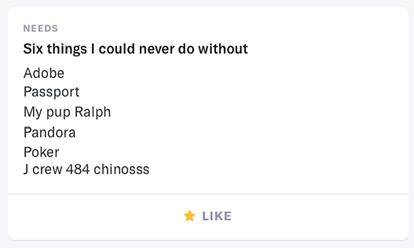
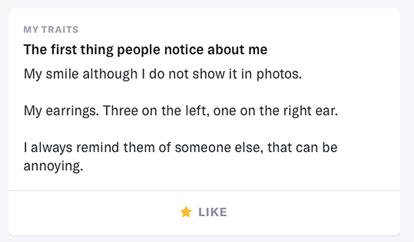
b Action: mind the key elements that make for a good first message and send Thiago a reply (about 75 words). written INTERACTION
c Reflection: evaluate your text by filling in the checklist.
Checklist: writing an informal message
1 Content and structure
• I started and ended the reply correctly.
• I kept my reply casual but polite.
• I paid attention to the tips on how to write a good first message.
• My message is worthy of another reply.
2 Language
• I used correct basic grammar.
• I used correct words.
• I used correct spelling and punctuation.
Feedback
3 Rewrite the reply below, making it a good one. Add extra suitable information.

Checklist: writing an informal message
1 Content and structure
• I started and ended the reply correctly.
• I kept my reply casual but polite.
• I paid attention to the tips on how to write a good first message.
• I added extra information to the message.
2 Language
• I used correct basic grammar.
• I used correct words.
• I fixed spelling mistakes and used correct punctuation. Feedback
Yes I think soNo
4 You are going to write a short informal reply to someone's dating profile.
a Preparation: read the profile you will get. Then read these ‘About me’ summaries.
LocalsOnly
Just a small town girl, living in a lonely world … That’s right, I’m a local girl. Born and raised. I moved away to the city for a while for work but couldn’t be happier to be back in town with a new gig and a bit more experience behind me. I absolutely love sports and am happiest when I’m outside making myself tired. Whether it’s going for a morning run, playing fetch with my dog Trix or tossing the football around with some friends, I’m all about it.
MustLuvDogs
I’m a fun-loving guy who’s a happy dog-dad to my girl Roxie. My friends would probably describe me as goofy but somehow I always end up being the responsible one. I have a lot of hobbies to keep up with. At the moment I’m focused on softball and fishing. One helps me get out and be social and the other helps me get away from it all. If you don’t mind the pup or a little bit of a goof we could be a pretty good pair.
SpaghettiDan
I’m a creature of contradictions—An athletic bookworm, a night owl who’s an early riser, and an active guy who loves to be lazy on Sunday mornings. I’m always interested in learning new things whether it’s history, politics, or the guitar. (I started teaching myself piano last year and I am loving the challenge so far.) I can also cook a mean baked tilapia or spaghetti dinner. Let me know if you’re interested or just give me some tips on my red sauce.
Source: www.zoosk.com
b Action: write a short message (about 75 words) to the profile you think fits your character best.
c Reflection: have a classmate fill in the evaluation checklist for you and ask for some feedback.
Checklist: writing an informal reply Yes I think soNo
1 Content and structure
• My classmate started and ended the reply correctly.
• My classmate kept the reply casual but polite.
• My classmate paid attention to the tips on how to write a good first message.
• My classmate’s message is worthy of another reply.
2 Language
• My classmate used correct basic grammar.
• My classmate used correct words.
• My classmate used correct spelling and punctuation.
Feedback
5 Read the ‘About me’ below and write a short reply. Use the keywords to build your sentences.
You know that person in your group of friends who is always planning something but maybe gets a little too crazy about it sometimes? Well, that’s me. No surprise I am currently studying event management and I just love everything about it. Putting together experiences for people is great, but I like to create my own too! Perfect dates are going for a hike (keen hiker over here!), followed by a visit to a new local brewery or trying a new dinner spot downtown SF and taking a walk nearby. I work hard during the week, fill my weekends with activities, and definitely can be a big ball of energy at times. I’m looking for a guy who can keep up and keep me on my toes.
Source: www.zoosk.com
(Address her.)
(Refer to her love for hiking because you are very outdoorsy too.)
(Ask about favourite dinner spot since you’re from the same city. Tell her you make a mean lasagne.)
(Ask to meet for a coffee.)
(Say bye.)
You are going to record a fictional dating video. Afterwards you will watch some of your classmates’ videos and reply to one of them.
1 Think of interesting things to talk about in your video. Be original if you want to stand out.
2 Use the profile template as a preparation document: fill in all the necessary categories.
3 Record your video (1.5 to 2 minutes). Remember:
a Use typical words to describe your personality.
b Use conditional sentences correctly when describing an ideal date.
4 Watch some of your classmates’ videos. While you are watching, take some notes in the worksheet you will get.
a Choose one profile that stands out.
b Highlight the things on your worksheet that you found interesting, things you have in common or are worthy of a good reply.
5 Reply to the dating video of your choice.
a Write a text message or email in which you show that you have paid close attention to the dating video.
b Don’t forget to ask an interesting follow-up question, too.
6 Fill in the checklist below to evaluate your speaking skills.
Checklist: dating video
1 Content and structure
• I prepared my speech thoroughly by filling in the template.
• My dating video is about 1.5 – 2 minutes.
• I discussed all the necessary categories.
• My video is original enough to ‘stand out’.
2 Language
• I used at least 8 good words to describe my personality.
• I used conditional sentences correctly.
• I used correct basic grammar.
• I used correct words.
• I talked fluently.
• I articulated well and spoke at a good pace.
• I paid attention to my pronunciation.
Feedback
7 Fill in the checklist below to evaluate your writing skills.
Checklist: writing an informal reply
1 Content and structure
• I took notes of interesting things in the videos.
• I started and ended the reply correctly.
• I kept my reply casual but polite.
• I paid attention to the tips on how to write a good first message.
• My message is worthy of another reply.
2 Language
• I used correct basic grammar.
• I used correct words.
• I used correct spelling and punctuation.
Feedback
Trace your steps on diddit.
Yes I think soNo
Yes I think soNo
check in
main track

Step 1: talking about health care
Step 2: using modal verbs summary on different tracks check out: at the pharmacy trace your steps
1 Watch the video and answer the questions.
a What type of video is this?
b What is the main point of the video? watching
2 Discuss the following questions with a partner and then report your findings to another pair of students.
a Do you often get sick?
b What do you do to feel better when you feel ill?
c Do you take medication when you have a headache or a cold? Or do you have other remedies?
d Do you always go to the doctor, or do you just go to the pharmacy?

1 There are a lot of different items at the pharmacy. Look at the categories below and try to come up with at least three more items for each category.
2 What items would you not find in a pharmacy? List three.
3 Read the job application and answer the questions.
a What is the primary responsibility of a pharmacist?
b Are these statements true or false? Correct the false statements.
1 Pharmacists only distribute prescription medications that require a doctor’s approval.
2 Pharmacists play a minor role in maintaining overall well-being and public health.
c What personal skills are important for a pharmacist? attention to detail and strong communication skills knowledge of different forms of medication expertise in cosmetics and beauty products understanding of common bugs and minor injuries
d Besides filling prescriptions, what other tasks do pharmacists tend to?
e How do pharmacists educate patients about medication usage?
f What other products besides medications do pharmacists stock?
g Which non-medical skills are needed for the position of a pharmacist?
h What does ‘out-of-hours on-call’ mean?
Main area
Pharmacy
Working for our organisation
An opportunity has arisen within our team for an enthusiastic and highly motivated pharmacist with excellent communication skills to provide high quality pharmacy services. If you have a passion for delivering optimal patient care and can demonstrate this through care, compassion, courage, communication, competence and commitment then we would like to hear from you.
Contract
Permanent
Hours
37.5 hours per week
(Take part in weekend, Bank Holiday and out-of-hours on-call as required)
Job overview
The Role of a Pharmacist: Ensuring Health and Wellness
Pharmacists play a very important role in the healthcare system, acting as the bridge between patients and medication. Their primary responsibility is to fill prescriptions, guaranteeing that individuals receive the right medicines in the correct dosage. This process involves distributing a wide range of medications, from prescription medicine that requires a doctor's approval to over-the-counter options available without a prescription.
Employer
Chelmsford City Centre Pharmacy
Being a pharmacist requires a varied set of skills: attention to detail is very important, as pharmacists must correctly interpret prescriptions, considering factors like dosage and form of medication. These forms can range from tablets, pills, lozenges, capsules over blister packs, powders, granules, creams, ointments and even sprays, drops, syrups, or gargles. Strong communication skills are also essential, as pharmacists regularly interact with both patients and healthcare professionals.
Detailed job description and main responsibilities
Daily Tasks
Pharmacists tend to a variety of healthcare needs, addressing concerns ranging from common bugs and minor injuries to more specialised areas like skin conditions, allergies, and aches. They are also often approached for guidance on stopping smoking, and they also offer advice on personal hygiene, providing toiletries such as toothbrushes, facial creams, razors. The pharmacy also carries feminine hygiene products such as tampons, sanitary towels and even baby products, and nappies.
Medication Management
Pharmacists educate patients on prescription and non-prescription medicines, making sure that patients have a clear understanding of their usage. They emphasise the importance of following the recommended dosage and provide information on potential side effects, including feelings of drowsiness or nausea. Pharmacists are diligent in advising patients to store medicines in a safe place where children cannot access them and to dispose of expired medications promptly.
Product Knowledge
In addition to medicinal expertise, pharmacists are familiar with cosmetics, offering a range of facial creams and other beauty products. They also stock various personal care items such as toothbrushes and razors. With a wide knowledge of the products they dispense, pharmacists contribute to the overall health and well-being of their community.
Employer type
Educational specification
NHS Education / Qualifications
Master’s degree in pharmacy or equivalent
General Pharmaceutical Council registration
Town Skills / experience
Chelmsford
Salary
£35,392 – £50,056 per annum
Salary period
IT/Computer skills
Experience of working in a multi-disciplinary team
Experience of managing staff
Desirable skills
Driving licence / access to a car
Conclusion
Yearly In essence, a pharmacist's role is more than just dispensing medicines.
Patients rely on pharmacists not only for their medication needs but also for valuable guidance on maintaining overall well-being. As trusted healthcare professionals, pharmacists play a vital role in safeguarding public health.
4 Match the words from the text to the correct description.
1diligent
Aliquid solutions used to rinse and clean the throat and mouth, often used to relieve sore throats
2safeguardingBabsorbent garments worn by babies to catch waste
3dispose
4gargles
5nappies
6ensuring
7lozenges
8bugs
9blister pack
10drowsiness
Csmall, medicated tablets that are meant to be dissolved slowly in the mouth to soothe a sore throat or cough
Dmaking sure that something happens or is done correctly
Eprotecting someone or something from harm or danger
Ffeeling sleepy or tired
Gshowing careful and persistent effort in doing something
Hslang term for bacteria or viruses that cause illness
Ipackaging for medication that has individual compartments for each dose and can be easily popped out
Jto get rid of something properly and safely
5 Fill in a word from the text. Choose from the following words.
1 Always make sure to follow your doctor's for your medication.
2 The on this bottle is different from what I usually take; should I be concerned?
3 Pharmacies play a major role in medicine to patients and making sure the patients receive what they need.
4 I prefer for minor illnesses like headaches or colds, so I don’t have to go see the doctor.
5 I have trouble swallowing ; can I get this medication in a different form?
6 tend to be easier to digest compared to tablets.
7 I requested my medication be dispensed in for easier storage and organisation; that way it’s easier to check if I missed one!
8 These new painkillers help with both physical and emotional
9 My sister has her period and asked to pick up some more at the pharmacy; maybe I should buy some chocolate too.
10 The pharmacist can explain the correct of the medicine, and in case you forget, you can always check the leaflet.
11 It's important to be aware of any potential before taking a new medication.
12 This medicine has ; should I throw it away?
13 Please the correct dosage into separate containers for morning and night use.
14 Thank you for the ; I feel more confident about taking my medications now.
6 Write and act out a short dialogue using the vocabulary from the text.
a First look for the following words or expressions in the text and explain what they mean. If you don't know them, look them up!
aches – blister packs – capsules – dispense – distributing – dosage – expired – guidance –prescriptions – sanitary towels – side effects – tablets – usage – over-the-counter medication healthcare professional – nausea – ointment – over-the-counter – skin condition
b Next, pair up and practise a dialogue (at the pharmacy). Use the vocabulary from exercise 6a in your conversation. SPOKEN INTERACTION

1 Watch the video of Diane, an American woman living in France, and answer the questions. She will compare French pharmacies to pharmacies in the United States.
a Complete the section titles in the video.
1 French pharmacies have and related products.
2 No long at pharmacies in France to ‘fill your ’.
3 French pharmacies’ are very different.
4 There are no pharmacy chains in France.
5 Drugs are
6 French pharmacy employees are all trained in watching
b Sort the items found in each type of pharmacy. Use one colour to indicate products you can find in an American pharmacy, use a second colour for products you find in a French pharmacy and a third colour for products you find in a parapharmacy.
drinks Gatorade greeting cards gum magazines make-up non-prescription items
personal care products prescription medicine skincare product snacks sunscreen toilet paper toys
c What is the primary reason for the absence of direct-to-consumer pharmaceutical advertising in France?
lack of interest in prescription drugs
legal restrictions
cultural differences
economic factors
d What is the French equivalent to ‘filling a prescription’ in English?
e Do French pharmacies have 24-hour opening hours?
f How are prescription medication prices regulated in France? How do they compare to the U.S.?
g How do French pharmacies handle over-the-counter medicine prices compared to prescription medication prices?
They are regulated by the government, just like prescription medications. Each pharmacy sets its own prices. Over-the-counter medicines are not available in French pharmacies. French pharmacies only offer prescription medications.
h What is the level of training required for employees working in French pharmacies, and how does it compare to the U.S.?
i Where do you (ironically) find the over-the-counter medication in France?
2 Watch the video of a pharmacist ‘filling a prescription’ in the U.S. and then compare this to how it is done in France. watching
3 Discuss these questions.
a Which of the differences do you find most surprising? Explain why.
b Are there differences in other countries that you know? How do pharmacies operate in Belgium, for instance?
3 / Where does it hurt?
1 Look at the pictures. How would you describe what these people are feeling? Discuss with a partner.




2 Based on the definitions, indicate which words can be used with the parts of the body listed below. Sometimes more than one option is possible.
Word Pain Ache Hurt Sore
Definition (noun) is something external, may come on quickly, is stronger and is difficult to ignore (noun) is something internal, a persistent physical discomfort, typically a dull sort of pain. usually associated with a specific part of the body (verb) to feel pain, to accidently cause pain or injury (can be emotional as well as physical) (adjective) physically tender (as from overuse or injury)
‘I have a pain in my …’
tooth shoulder head heart 1 3 2 4
‘I have a(n) … ache’‘I hurt my …’ ‘My … hurts’
‘My … is / are sore’. ‘I have a sore ...’
3 Match the verbs to the correct body part. Sometimes more than one option is possible. Write down the results below. Limbs (legs, arms, …)
4 Try to describe the pain this woman is feeling as accurately as possible with the vocabulary of the previous exercises. There is often more than one possibility.


5 Combine the injury with an appropriate treatment.
1abrasion
2a cold with congestion / stuffy nose
3blister
4bruise
5menstruation cramps / period pain
6migraine
7rash
8splinter
9stomach flu
AUse tweezers to remove, then disinfect and bandage.
Bpainkiller and warm compress
Canti-nausea or diarrhea medication, extra fluids and rest
Dpainkiller and rest in a dark room
Epainkillers, cough syrup, nasal spray and rest
Fantiseptic and a band aid
Gdrain, antiseptic and a band aid
Hcold compress and ointment
Icalming ointment
6 What do you think these patients might have?
a Complete the diagnosis column with a suitable word. Choose from the words below. allergies – cold – cold sores – flu – indigestion – mild food poisoning – rash –stomach flu / bug – pregnant – sunburn – throat infection – heartburn
1 I find it hard to talk or eat because my throat is really sore, and my glands are all swollen I feel really bad.
2 I must have eaten something bad yesterday; my stomach is upset; I have diarrhea and heartburn
3 I’m so tired and feel like I might fall over. I can’t stop shaking. My body hurts all over, and I have a really high temperature
4 I really don’t like summer. Every time I go outside, my eyes start watering a lot, I have a runny nose, and I can’t stop coughing and sneezing
5 I feel very stressed out lately and haven’t been sleeping well, you can tell by the blisters on my lips. They are also painful
6 My sister said she often felt a burning sensation in her chest after eating and had acids reflux during her last pregnancy.
Go to the doctor Symptoms
7 My nose is all stuffy; I can barely breathe, and it makes me feel awful.
8 I’ve been throwing up since this morning, and I can’t keep any food or drink down. I feel really sick.
9 I have red spots all over, and they’re really itchy. I can’t stop scratching
10 I fell asleep on the beach yesterday and now my back is red and warm, and it hurts to the touch
b In the first column, indicate for which injuries / diseases you would go to the doctor. Why? Discuss with a partner.
7 Discuss the use of medication.
a Preparation: choose one of the following medications. Choose one that you have used before or that you know.

1 2 3 4 5




b Action: list two injuries / pains / aches it can relieve and for which diseases this medication might be helpful. If possible, give an alternative if the treatment doesn’t work. Discuss the medication with a classmate.
I chose …
This can be used to treat … It may also help to relieve … If the medication does not have the required effect, you could also ...
c Reflection: check your task below.
Checklist: describing the use of medication Yes I think soNo
1 Content and structure
• I listed two or more injuries / aches/ diseases.
• I added an alternative treatment.
2 Language
• I used the correct vocabulary to explain my condition.
• I paid attention to my pronunciation.
Feedback CHECK 1, p. 165
1 / Prescription madness
1 What is a medicine leaflet? What information is on it?
2 Read the leaflet for paracetamol and answer the questions.
a Put the following subtitles in the correct place.
How to take paracetamol?
Overdoses of paracetamol
Side effects of paracetamol
Taking paracetamol with other medicines, food and alcohol
Who can take paracetamol?
b What is the primary medical condition or disorder for which paracetamol is typically prescribed?
c From what age can you take the normal dosage of paracetamol?
d What is the recommended dosage and frequency for adults when taking paracetamol?
e What should you do if your symptoms worsen despite taking paracetamol?
f Indicate the potential side effects that can occur with the use of paracetamol.
vomiting
trembling
rash and swelling
nasal congestion
low blood pressure
leukopenia
irregular eye movements
flushing
fever
fast heartbeat
dizziness
blood disorders
bleeding
liver and kidney damage
g Is paracetamol safe to use during pregnancy or while breastfeeding, and are there any special considerations for these situations?
h What is the maximum recommended duration for using paracetamol without medical supervision?
3 days 2 weeks 3 weeks indefinitely
Paracetamol is a commonly used medicine that can help treat pain and reduce a high temperature (fever). It's typically used to relieve mild or moderate pain, such as headaches, toothache or sprains, and reduce fevers caused by illnesses such as colds and flu.
It may be sold under the name paracetamol, or under various brand names.
comes with it or ask your pharmacist or doctor for advice.
Most people can take paracetamol safely, including: pregnant women
• breastfeeding women children over two months of age – lower doses are recommended for young children
If you're not sure whether you can take paracetamol, check the leaflet that
Make sure you take paracetamol as directed on the label or leaflet, or as instructed by a health professional. How much you can take depends on your age, your weight, the type of paracetamol you're taking and how strong it is. For example:
• Adults can usually take one or two 500 mg tablets every 4-6 hours, but shouldn't take more than 4 g (eight 500 mg tablets) in the space of 24 hours.
Children under 16 should take a lower dose, depending on their age or weight – check the packet or leaflet, or ask a pharmacist or doctor for advice. For very young
children, paracetamol liquid is given using a measuring spoon or an oral syringe.
Paracetamol should start to work within an hour and the effect usually lasts several hours. Don't take more than the recommended dose if it isn't relieving your symptoms.
You must contact your doctor if your symptoms get worse or last more than three days despite taking paracetamol. You cannot use other medications that contain paracetamol as an ingredient (such as some cold and flu remedies) while you're taking paracetamol.
Paracetamol can react unpredictably with certain other medications. This could affect how well
either medicine works and might increase the risk of side effects.
It may not be safe to take paracetamol at the same time as:
• other products containing paracetamol – including combination products where paracetamol is one of the ingredients You should check the leaflet that comes with your medicine to see if it can be taken with paracetamol. Ask a pharmacist or doctor if you're not sure.
• an allergic reaction, which could cause a rash and swelling
• flushing, low blood pressure and a fast heartbeat – this can sometimes happen when paracetamol is given in hospital into a vein in your arm blood disorders, such as thrombocytopenia (low number of platelet cells) and leukopenia (low number of white blood cells)
• liver and kidney damage, if you take too much (overdose) – this might be fatal in severe cases Speak to a pharmacist or doctor if you develop any troublesome side effects that you think could be caused by paracetamol.
Taking too much paracetamol, known as an overdose, can be very dangerous. It might be helpful to take any remaining medicine and the box or leaflet with you to the hospital if you can. Some people feel sick, vomit or have abdominal (tummy) pain after taking too much paracetamol, but often there are no obvious symptoms at first.
Side effects from paracetamol are rare but can include:
Adapted from www.nhs.uk

3 Check the leaflet again, read the sentences below and answer the questions.
a Some words are in bold in the text. What type of verbs are used here? Highlight the other verbs like this in the text.
b What can modal verbs express? Which modalities do you already know?
c Read the sentences from the text and add the correct modality it expresses. Choose from the following.
ability – advice – obligation – permission – possibility – prohibition
Sentence
1 It may be sold under the name paracetamol.
2 Most people can take paracetamol safely.
3 Adults can usually take one or two 500 mg tablets.
4 Paracetamol should start to work within an hour.
5 You must contact your doctor if your symptoms get worse.
6 You cannot use other medications that contain paracetamol.
7 Paracetamol can react unpredictably with certain other medications.
8 It may not be safe to take paracetamol at the same time.
9 You should check the leaflet that comes with your medicine.
10 It might be helpful to take any remaining medicine and the box with you to the hospital if you can.
Modality
Modality is about someone’s attitude towards the world and how the speaker feels about a state or event. By using certain words, you can express certainty, possibility, willingness, obligation, necessity and ability.
In English, modal auxiliary verbs can be used for this:
• modal verbs: can, could, may, might, will, shall, would, should, must
Note that there are also semi-modal verbs and other verbs with modal meanings:
• semi-modal verbs: e.g. need (to), ought (to), used to
• other verbs with modal meanings: have (got) to, be going to and be able to
For more information about the form and use of the different modal verbs in English, check the Summary
4 Fill in a correct modal verb in these sentences. Pay attention to the context!
Sentence
a You … see a doctor for your illness if you don’t get better. (advice)
b I … go to the pharmacy to pick up my prescription before it closes. (necessity)
c We … follow our doctor's advice if we want to heal quickly. (advice)
d She … try using natural remedies to help with her symptoms. (suggestion)
e It … be good to get a second opinion before starting treatment. (possibility)
f Patients … stop taking their medication without consulting their doctor. (prohibition)
g I … believe how much the prescription cost at the pharmacy yesterday. (past ability)
h Even if you are feeling better, you … still spread the disease. (possibility)
i If you are feeling better, the doctor says you … leave the house to go for a walk. (permission)
j … you pick up the prescription at the pharmacy after work? (polite request)
Modal verb
5 Read the text and replace the verbs in bold with a semi-modal verb expressing the same modality or expressing the same idea. Choose from the following verbs. be able to – have to – need to – ought to
If you're travelling, you should (1) take a small pharmacy with you. It is not necessary to (2) bring the entire medicine cabinet, but it is wise to carry some basic medication in your bags. You should (3) have painkillers for headaches, toothache and so on. It is necessary (4) to bring something for stomach problems.
A lot of people take rehydration salts too, especially if they're going to hot countries. If you get diarrhea, you should (5) mix the salts with water and drink the solution. This mixture can (6) help you feel better quickly.
It's a good idea to take a first-aid kit with you. You might not (7) know how to use everything in it, but other people can (8) help you. And remember, if you're really ill, you must (9) see a doctor or go to a hospital. Don't try to treat yourself!
6 Watch the video. Find at least five injuries these people may have sustained and the pain they might be experiencing. Use words and expressions from Step 1 and correct (semi-)modal verbs. Then compare your assignment with a classmate’s.
e.g. This man could have a broken arm; he may be experiencing a stabbing pain and may have hurt his shoulder as well.
7 Read the advice for when you have a cold and answer the questions.
a Which modality do the sentences express?
When you have a cold, it can be hard to sleep at night. But it's important to rest so your body can fight the infection. Try these tips to help you get more rest.
1 You should use extra pillows to raise your head and chest at bedtime.
2 You have to keep the room cool and quiet.
3 You should drink warm liquids, such as lemon tea or herbal tea.
4 You could take a hot shower before bed.
5 You shouldn’t drink alcohol or caffeine; they can keep you awake.
6 You shouldn’t be around other people; you could infect them.
b Change the meaning of the sentences in exercise a by using another modal verb. Check the modality between brackets.
1 (ability)
2 (advice)
3 (obligation)
4 (permission)
5 (prohibition / possibility)
6 (prohibition / possibility)
8 Before you watch the video, decide if these statements will be proven true or false.
Statement
1 Migraines can bring on food cravings.
2 To be diagnosed with migraines, you need to have recurrent headaches.
3 To be diagnosed with migraines your headaches have to last 24 to 48 hours without medication.
4 The pain needs to be moderate or severe in intensity, and more intense on one side of the head.
5 You also have to have either a sensitivity to light or sound or smell.
6 The prodrome stage of migraine can last an entire day and includes symptoms like increased yawning and trouble concentrating.
7 Migraines may be caused by constriction and dilation of the blood vessels that supply blood to the brain.
8 CGRP's can help your brain to manage the pain of the migraine better and alleviate it more quickly.
CGRP: protein in the brain and nervous system involved in the transmission of pain constriction: a place where something has become tighter or narrower; an obstruction dilation: the action of becoming or being made wider, larger, or more open prodrome stage: a period during which someone experiences some symptoms and / or a change in functioning one hundred and fifty-three
9 Now watch the video and correct exercise 8. Explain the assumptions that were wrong with the information from the video.
10 Luckily not every headache is a migraine. Turn this list into advice and add two of your own suggestions that help you when you have a headache. Use a variety of modal verbs. watching

✓ Drink plenty of water or fluids
✓ Get plenty of rest
✓ Release stress with light exercise
Skip meals
Sleep more than you usually would ✗ Strain your eyes with electronics
1 Listen to the conversation at the pharmacy and choose the correct answers.
a Which symptoms does the customer describe?
headache, a cough and a temperature headache, congested nose and a temperature headache, a cough and exhaustion headache, congested nose and a exhaustion
b Why does the pharmacist ask if the customer is allergic to any drugs?
To check if they can take ibuprofen.
To provide them with a cough syrup.
To recommend seeing a doctor.
To ask about their preferred cough reliever.
c What is the maximum number of tablets that the person can take every four hours?
one tablet
two tablets
three tablets
four tablets
d What precautions does the person advise the other person to take when using the cough syrup?
Take it during the day.
Take it at night.
Take it with food.
Take it with water. listening
e When should the person see a doctor if they don't feel better?
after 24 hours
after 48 hours
after 72 hours
after one week
f How much does the person have to pay for the medicine?
$ 4.99
$ 5.99
$ 6.99
$ 7.99
2 Mark the sentences the pharmacist would use with the letter P and the customer’s with a letter C.
I’ve got a prescription here from the doctor.
Take two pills three times a day.
Some typical side effects are stomach pain and diarrhea.
How long do I have to take these?
Hi, I need something for …. What do you recommend?
The active ingredient is paracetamol.
You’ll need to take these for a week.
If it doesn’t clear up after a week, you should see your doctor.
Can I buy this without a prescription?
It’s only available on prescription.
Have you got anything for …?
Do you have any known allergies to medications?
This medication should be taken in the morning with food / water.
How often should I take the medicine?

3 Practise a conversation at the pharmacy.
a Preparation: read the leaflets for the medication you will get. Check the useful expressions for visiting the pharmacy in the Summary on page 163.
b Action:
• Pair up. Your teacher will give you a card with an illness or injury.
• Write down two sentences you will use as a customer / pharmacist.
Customer Pharmacist
• Act out the conversation with your partner. Obtain or provide the correct medicine. Switch roles afterwards.
c Reflection: evaluate yourself as a customer and a pharmacist.
Checklist: conversation at the pharmacy Yes I think soNo
1 Content and structure
• I started and ended the conversation correctly.
• I explained my problem correctly (as a customer).
• I gave good advice (as a pharmacist).
2 Language
• I used the correct vocabulary to explain my condition (as a customer).
• I used the correct vocabulary to suggest treatment (as a pharmacist).
• I used (semi-)modal verbs correctly.
• I paid attention to my pronunciation.
Feedback
CHECK 2, p. 171
Modality is about someone’s attitude towards the world and how the speaker feels about a state or event. By using certain words, you can express certainty, possibility, willingness, obligation, necessity and ability.
In English, modal auxiliary verbs can be used for this.
– modal verbs: can, could, may, might, will, shall, would, should, must
However, there are also other verbs that can be used to express modality:
– semi-modal verbs: dare, need, ought to, used to. They are called semi-modal because in some ways they are formed like modal verbs, and in some ways, they are like other main verbs
– other verbs with modal meanings: have (got) to, be going to and be able to
Modal verbs in English have some characteristics:
– Modal verbs have only one form (never add -s, -ed, -ing!).
– They are always followed by the base form of the verb. e.g. You must contact your doctor.
– To form the negative, add not after the modal verb (no to do!). e.g. It may not be safe.
Note that ‘not’ is added to ‘can’ to make it negative: e.g. You cannot take more than 3 pills per day.
– To form questions, use inversion (don’t use do / does / did!).
e.g. Should I take a pill with food?
– Modals can refer to the present or the future:
• Modal + base of the verb: e.g. She must be in pain.
• Modal + be + -ing form of the verb: e.g. He could be having a heart attack.
– Modals can also refer to the past:
• Modal + have + past participle: e.g. He may have come down with a cold.
• Modal + have been + ing-form of the verb: e.g. They can’t have been coughing all night!
– Modality is used to express how definite you are about something. If you use words that express uncertainty, this is called low modality. If you use words that express certainty, that is called high modality.
Low modality
Medium modality
High modality couldn’t may may not might might not should shouldn’t would wouldn’t can cannot must must not will will not
– Often the same modal verb is used to express different meanings and different modalities.
Modal
Meaning
might possibility
Example
Some side effects might be fatal in severe cases. may possibility permission It may be sold under a different name. You may take more lozenges than one if needed.
can cannot (can’t) ability possibility permission prohibition
could polite request past ability suggestion possibility
My grandma can still walk to the pharmacy herself. We can pick up the prescription after work. Adults can take one or two 500 mg tablets. You cannot use any other medication that contains paracetamol.
Could you explain the use of this medicine one more time?
He could see perfectly when he was a child; now he needs glasses.
Scientists could examine this side effect in more detail.
Taking paracetamol could cause a rash. will future polite request
would offering, inviting polite request
The price of this medicine will go down next year. Will you remind me to take my medication?
Would you like to try this natural remedy?
Would you wait behind the yellow line until the pharmacist calls you?
should advice, suggestion expectation You should check the leaflet that comes with the medicine.
must must not (mustn’t) obligation, necessity conclusion prohibition
The fever should disappear after 3 days.
You must contact your doctor if the symptoms get worse.
He’s not coughing as much anymore. The cough syrup must be working then. You must not panic but stay calm and call your doctor.
1 ‘Have to’ versus ‘must’ Have to and must are both used to express obligation or necessity.
– Have to is much more flexible because we can use it in the past, the present and the future.
e.g. He had to take his medication at the same time the past three weeks.
– Must expresses the speaker's feelings and specific obligations.
e.g. I really must stop smoking for my health.
– Have to expresses general obligations.
e.g. If the fever lasts longer than three days, you have to see your doctor.
In their negative forms, mustn't and don't have to have completely different meanings:
– Mustn't expresses prohibition.
e.g. You mustn't take more pills than the doctor prescribed.
– Don't have to expresses the absence of obligation or necessity.
e.g. You don't have to take extra vitamins if you feel better, but it can’t hurt.
2 ‘Ought to’ versus ‘should’
– Ought to has a similar meaning to should but it is very formal. It expresses a future action that is desirable, recommended or ideal to the speaker.
– Ought to is always followed by the base form of the verb (the infinitive without to).
e.g. The government ought to make medication cheaper for low-income families.
– The negative is formed by adding ‘not’ after ought (ought not to)
e.g. You ought not to ask so many questions at once, the pharmacist will answer them one by one.
• Note that in American English it is sometimes acceptable to drop the ‘to’ in a negative sentence:
e.g. You oughtn't smoke so much.
• The negative of ought to is not very common, though. We usually use shouldn’t or should not instead:
e.g. You shouldn’t ask so many questions at once.
Word Translation My notes VERBS
to ache pijn doen / hebben to alleviate verlichten, verzachten, verminderen
to be sore stijf, stram zijn; pijnlijk zijn to bruise kneuzen, beschadigen to cramp verkrampen to dislocate ontwrichten to dispense toedienen, uitdelen to dispose weggooien to distribute verspreiden to ensure garanderen, zorgen voor to expire verstrijken, vervallen to fester etteren to gargle gorgelen
to get a concussion een hersenschudding oplopen to infect besmetten, ontsteken to interact op elkaar inwerken, op elkaar reageren to itch jeuken to keep (food) down (voedsel) binnenhouden to reduce verminderen, verlagen to safeguard waarborgen, veiligstellen to scab een korst vormen to scratch krabben, krassen to sprain verstuiken to sting steken
to stock bevoorraden, opslaan, bewaren to swell zwellen to tear scheuren to throb kloppen to throw up overgeven to twist verdraaien to worsen verslechteren, verergeren
Word Translation My notes NOUNS
an abrasion een schaafwonde an ache pijn
acid reflux zure oprisping, terugvloeiend maagzuur
an allergy allergie
a blister een blaar
a blister pack doordrukverpakking
a bug een virus
a bruise een kneuzing, een blauwe plek
a capsule een capsule, een pil
a cold een verkoudheid
a cold sore een koortsblaas
a concern een bezorgdheid, een probleem
a concussion een hersenschudding
a congestion / stuffy nose een verstopte neus
diarrhea diarree, buikloop
a dosage dosering, dosis
drowsiness slaperigheid, sufheid
the flu de griep
a frequency een frequentie
a gargle gorgeldrank, spoeldrank
a granule korrel guidance begeleiding
a healthcare professional medisch personeel, iemand die werkt in de gezondheidszorg heartburn brandend maagzuur
an indigestion spijsverteringsklachten
an injury een blessure
a leaflet een bijsluiter
a lozenge zuigtablet
menstruation cramps / period pain menstruatiepijn
a migraine een migraineaanval
Word Translation My notes (mild) food poisoning (lichte) voedselvergiftiging
a nappy luier
nausea misselijkheid
an ointment zalf
an overdose een overdosis
over-the-counter medication
medicatie zonder voorschrift, vrij verkrijgbaar
a prescription een voorschrift
a rash huiduitslag
a (legal) restriction (wettelijke) beperking
a sanitary towel maandverband
a side effect een neveneffect
a skin condition een huidaandoening
a splinter een splinter
a stomach flu / bug buikgriep, een maagontsteking
a sunburn zonnebrand
a syrup een siroop
a throat infection een keelontsteking
usage gebruik
a wide range een uitgebreid assortiment
ADJECTIVES / ADVERBS
common gewoon, alledaags, veelvoorkomend despite ondanks
diligent ijverig, zorgvuldig equivalent soortgelijk nauseous misselijk
pregnant zwanger
COLLOCATIONS
a burning sensationeen branderig gevoel
to hurt to the touchpijn doen bij het aanraken
a swollen gland opgezwollen klier
an upset stomach maagklachten, maag die van streek is
1 Starting the conversation
Hi, I have a problem with …
Hello, I was wondering if you could help me with …

Good morning, Sir / Madam. How can I help you?
Good afternoon, … Good evening, …
Can I help you?
How may I help you?
2 Asking for advice / ordering medicine
Have you got anything for ...? cold sores a sore throat a cough travel sickness

If I were you, I would …
Have you tried anything already?
I've got a prescription here from the doctor.
Can you recommend anything for …?
What do you advise?
What do you suggest?
What would you do?
Do you have any suggestions?

I’m happy to fill that for you. I advise you to ... You should really … You could try … It might be a good idea to …
3 Exploring the problem / recommending medicatione
Are you allergic to …?
Do you have any allergies?
Take one (tablet, pill, etc.) three times a day with water.

Any other suggestions? What else could I do?
It's only available on prescription.
You could try this cream.
Rub this cream on your chest.

I’m afraid I can’t help you with that.
That’s really not my area of expertise.
I wouldn’t know what to advise you.
I wish I could help you.
I wish I had better advice. I wish I could suggest something.
4 Ending the conversation
Thank you. I hope I feel better soon.

If it doesn't clear up within a week, you should see your doctor.
Thank you for the advice.

If you don’t feel better after 3 days, consult your doctor.
1 Fill in the sentences. The first letter is given.
1 The b on my foot from my new shoes was so painful that I had to visit the pharmacy for some bandages.
2 After falling off my bike, I ended up with a nasty b on my arm that required some pain medication from the doctor.
3 She developed a red, itchy r after taking her new prescribed medication.
4 My sister caught the s while traveling and needed some medication and rehydration to help control her symptoms.
5 The doctor wrote me a p for antibiotics to treat my sinus infection.
6 The pharmacist explained the d instructions for the pain relief spray after I twisted my ankle.
7 I always keep o in my purse for emergencies like headaches or allergies.
8 It’s important to avoid sharing drinks or utensils when you have a c to prevent spreading the virus.
9 He s his wrist playing football and had to wear a brace for several weeks to allow it to heal properly.
10 The pharmacist will d the correct medication and provide g on how to take it safely.
2 Practise the vocabulary. Match the images with the correct word. Choose from the following: abrasion – blister pack – drowsiness – gargle – heartburn – lozenge –nappies – period pain – splinter


1 2 3

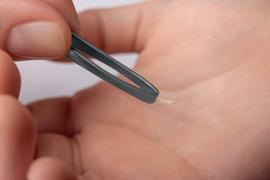





3 Watch the video and answer the questions. a Choose the correct summary of the video. watching
1
In the video, it is stated that a career in pharmacy offers limited opportunities and is not impactful. Pharmacy professionals have minimal responsibility in ensuring people receive the right medicines. The video suggests that pharmacy professionals only work in community pharmacies or GP surgeries. It ends by implying that there are no different pathways to enter the field and no potential for growth in a pharmacy career.
2
In the video, the focus is on the role of pharmacy professionals in promoting public health. It explores how pharmacy professionals work closely with healthcare professionals to ensure safe and effective use of medicines. The video also mentions the emerging opportunities in pharmacy, such as digital technology and public health roles. However, it concludes by highlighting the importance of science and interpersonal skills in pursuing a successful career in pharmacy.
In the video, the career opportunities in pharmacy are explored. It emphasises that pharmacy professionals play a crucial role in ensuring people receive the right medicines. The video highlights the diverse work settings for pharmacy professionals, including hospitals, community pharmacies, and specialised roles in industries or research. It concludes by mentioning the various pathways to enter the field, such as studying for a master’s degree to become a pharmacist or undergoing training to become a pharmacy technician.
b Decide if the statements are true or false. Correct the false statements. Statement
1 Pharmacy professionals work exclusively in community pharmacies or GP surgeries.
2 Pharmacy professionals are responsible for ensuring patients receive the correct medicines at the right times.
3 Pharmacy professionals only advise on medication usage and do not provide guidance on other health issues.
4 Pharmacy professionals can work in hospitals, providing advice to doctors, nurses, and patients.
5 Pharmacy professionals may have specialist roles in prisons or the armed forces.
c Choose the correct answer.
1 What do pharmacy technicians do? prepare and dispense medicines advise patients on medication usage order and prepare medicines conduct research on new medicines
2 What is the role of pharmacy support staff? advising patients on medication usage preparing and dispensing medicines ordering and preparing medicines assisting pharmacists in various tasks
3 What is the purpose of visiting NHS Health Careers? to find out more about pharmacy career opportunities to explore science and health-related professions to learn about different pathways into the pharmacy profession to discover opportunities for career growth
4 Fill in the correct words in the dialogues based on the description. The words you need are in the text on pages 136-138.
Hey John, have you seen the new products in the pharmacy?
No, what’s new?
There’s a wide range of for and allergies. You should check it out.
2
1 act in such a way as to have an effect on each other
Excuse me, do you have any concerns about the medication I prescribed?
Yes, I’m allergic to penicillin. Would that with the medicine?
No, it’s completely safe for people with allergies.
a smooth oily substance that is rubbed on the skin for medicinal purposes or as a cosmetic diseases that affect your skin: may cause rashes, inflammation, itchiness or other skin changes
I think I pulled a muscle during my workout yesterday
You should see a if the pain persists.
a person who provides a healthcare service to a patient such as a nurse, doctor or a surgeon
My daughter has been experiencing and vomiting.
Do you have any recommendations?
Yes, there are some over-thecounter medications that can help with those symptoms.
Check 2, p. 171
a feeling of sickness with an inclination to vomit
5 Expand your vocabulary with idioms.
a Fill in the correct body part or missing word from the idioms. Choose from the following body parts.
bone – eyes – feet – guts – hands – heart – hip – hurt – leg (2x) – lungs – neck – shoulder –side – throat
Idiom
Meaning
1 be at each other’s arguing in an angry way
2 scream at the top of your scream as loudly as you can
3 have a change of change your opinion or the way you feel about something
4 get cold suddenly become too frightened and nervous to do something you had planned to do
5 give someone a cold be unfriendly to somebody by intentionally ignoring them
6 cry your out cry a lot and for a long time
7 have the to do something be brave enough to do it
Meaning
8 pull someone’s make someone believe something that is not true, usually as a joke
9 be in a world of to be in a lot of pain or trouble
10 a pain in the refers to someone or something that is annoying or troublesome
11 a thorn in one’s someone or something that causes ongoing irritation or discomfort
12 break a wish someone good luck before a performance
13 cut to the cause extreme pain or suffering
14 sit on your to do nothing about a problem or a situation that needs dealing with
15 be joined at the to be exceptionally close to someone
b Choose five idioms from the list in exercise a and write a sentence in which you use the idiom correctly.
e.g. They used to talk. Now they just give each other the cold shoulder.
c Find a photo online or make a drawing of one of the idioms. Add your exemplary sentences from the previous exercise.
e.g. ‘Joined at the hip’
My best friend and I have been joined at the hip since kindergarten; we do everything together.
Despite being in different departments, the two colleagues were joined at the hip when it came to attending work events together.
Score < 15 ≥ 15
Next exercise ex. 4

Check 2, p. 171
1 Read the text and answer the questions. a Find the correct answer in the text.
1 What is prescription drug abuse, and how does it differ from the proper use of prescription medications?
2 How can prescription drug misuse manifest in individuals, and what are some examples provided in the text?
3 What age groups can be affected by prescription drug abuse, according to the text?
4 What are the most commonly misused prescription drugs mentioned in the text?
5 What serious consequences can result from abusing these prescription drugs, as outlined in the text?
Opioids: Anti-anxiety medicines / Sedatives:
Stimulants:
6 What preventive measures are suggested for individuals who need painkillers, sedatives, or stimulants to treat a medical condition?
a b c d
Subtotal / 12
Prescription drug abuse is the use of a prescription medicine in a way not intended by the prescriber. Prescription drug misuse includes everything from taking a friend's prescription painkiller for your backache to snorting or injecting ground-up pills to get high. Prescription drug abuse may become ongoing and compulsive, despite the negative consequences.
An increasing problem, prescription drug abuse can affect all age groups, including teens. The prescription drugs most often misused include opioid painkillers, anti-anxiety medicines, sedatives and stimulants.
Symptoms
Signs and symptoms of prescription drug abuse depend on the specific drug. Because of their mind-altering properties, the most misused prescription drugs are:
• Opioids used to treat pain, such as medicines containing oxycodone.
• Anti-anxiety medicines, sedatives and hypnotics used to treat anxiety and sleep disorders, such as alprazolam (Xanax), diazepam (Valium) and zolpidem (Ambien).
• Stimulants used to treat attention-deficit/hyperactivity disorder (ADHD) and certain sleep disorders, such as methylphenidate (Ritalin, Concerta, others).
Complications
Abusing prescription drugs might cause a number of problems. Prescription drugs can be especially dangerous — and even lead to death — when taken in high doses, when combined with other prescription drugs or certain over-the-counter medicines, or when taken with alcohol or illegal or recreational drugs.
Medical consequences
Here are examples of serious consequences of prescription drug abuse:
• Opioids can cause a slowed breathing rate and the potential for breathing to stop. Opioids may also cause coma. An overdose could lead to death.
• Anti-anxiety medicines and sedatives — medicines to help you feel calm or less anxious — can cause memory problems, low blood pressure and slowed breathing. An overdose can cause coma or death. Abruptly stopping the medicine could cause withdrawal symptoms that can include an overactive nervous system and seizures.
• Stimulants can cause an increase in body temperature, heart problems, high blood pressure, seizures or tremors, hallucinations, aggressiveness, and paranoia.
Prevention
Prescription drug abuse may occur in people who need painkillers, sedatives or stimulants to treat a medical condition. If you're taking a prescription drug that might lead to drug misuse, here are ways to reduce your risk:
• Make sure you're getting the right medicine. Make sure your health care provider clearly understands your condition and the signs and symptoms. You should ask your doctor whether there's another medicine with ingredients that have less potential for addiction.
• Follow directions carefully. You must use your medicine the way it was prescribed. You cannot stop or change the dose of a drug on your own if it doesn't seem to be working without talking to your healthcare provider.
• Don't order prescriptions online unless they're from a trustworthy pharmacy Some websites sell counterfeit prescription and over-the-counter drugs that could be dangerous. 35
• Never use another person's prescription. Everyone is different. Even if you have a similar medical condition, it might not be the right medicine or dose for you.
40 Adapted from: mayoclinic.org. Used with permission of Mayo Foundation for Medical Education and Research, all rights reserved.
b Fill in the correct modality the following sentences from the text express.
Even if you have a similar medical condition, it might not be the right medicine or dose for you.
Prescription drugs can be especially dangerous — and even lead to death — when taken in high doses.
You must use your medicine the way it was prescribed.
Some websites sell counterfeit prescription and over-the-counter drugs that could be dangerous.
You cannot stop or change the dose of a drug on your own if it doesn't seem to be working without talking to your health care provider.
You should ask your doctor whether there's another medicine with ingredients that have less potential for addiction.
Subtotal / 6
c Rewrite the last text as an advice leaflet for using prescription medication.
• Preparation: read the text again.
• Action: write at least 5 tips on the use of prescription drugs. Vary your use of (semi-) modal verbs.
• Reflection: check your task using the checklist below.
Checklist: giving tips
1 Content and structure
• I wrote at least 5 tips.
• The tips are correct.
2 Language
• I used a variety of (semi-)modal verbs.
• I used correct vocabulary.
• I used correct spelling and punctuation.
Feedback
Subtotal / 5 Score < 15 ≥ 15
2 Fill in the correct modal to express the modality that is given. Sometimes multiple answers are possible.
suggestion1 If your throat is still sore tonight, you … try some cough drops.
permission2 You … leave the house while you are recovering.
suggestion 3 We …. try a different medicine for your pain.
necessity4 The doctor … prescribe a stronger medication for your severe pain; you can’t go on like this.
possibility 5 If my headache persists, I … consider seeking medical advice.
obligation6 You … always read the instructions before taking any medicine if you don’t want to risk side effects or misuse.
ability 7 I … see my doctor for a check-up in three weeks; I made an appointment.
prohibition8 You … skip your doses of medication or it won’t work properly.
Modal verb(s)
polite request 9 … you hand me an extra pillow for my back; it has been hurting all morning.
obligation10 I … stay indoors until the infection clears; I don’t want to infect others.
Score < 7 ≥ 7
Next exercise All done!
3 Prescription madness.
a Put parts A to H of the prescription in the correct place. Choose from the following.
A active and other ingredients
B active ingredient
C brand name
D contact details in case of questions / emergencies
Consumer medicine information
What is in this leaflet
What product X is used for
What X does How X works
Before you use product X When you must not take it
Before you start to take it
Taking other medicines
Source: www.nps.org.au
Subtotal / 9
Taking product X How and when to take it
How long to take it
If you forget to take it
E possible interactions with other medications
F safe storage of the medicine
G what to do if you miss a dose
H what to do with leftover medications
If you take too much (overdose)
While you are taking product X Things you must do
Things you must not do
Things to be careful of
Side effects
After taking it Storage
Disposal
Product description
What product X looks like
b You will write a leaflet about yourself and how to handle / treat you best.
1 Preparation: think about the following categories for your text:
• Product [name]
• Usage: what is the product for, what can you use it for, what are the normal conditions in which the product works best? What can the product not be used for?
• Active ingredients: what does the product consist of?
Examples: strong legs, a mathematical genius, a big heart for others, good listener …
• Possible interactions with others: what influences your behaviour (positively or otherwise)?
E.g., works best when combined with soda or coffee; does not mix with tomatoes or bell peppers.
• Storage and expiration dates: what do you need to keep working well? How can you be recharged? How often do you need to be ‘checked’?
• Overdoses or misuse: What can go wrong and how do you fix it? What is your reset button? For example, the product can no longer concentrate well when stressed. It helps to have the product walk in nature for 30 minutes or hug the product.
2 Action: you will get a template to write out your manual or prescription. Use the information from the different categories. Think out of the box! You can always add some visual aids (photos, drawings, etc.) to further clarify your leaflet. Use a variety of modal verbs.
3 Reflection: check your prescription using the checklist below.
Checklist: a leaflet about myself Yes I think so No
1 Content and structure
• I wrote an interesting prescription leaflet about myself.
• I included all categories.
• I included visual aids for clarification.
• I used the template.
2 Language
• I used a variety of modal verbs.
• I used correct vocabulary.
• I paid attention to my spelling.
Feedback
Subtotal / 10
Score < 14 ≥ 14
Next exercise All done!
You are working as an intern for a pharmacy abroad. Every day tourists come in with all sorts of injuries, diseases or problems. It will be your job to assist and advise them correctly.
1 Study the medication leaflets you will get to prepare your role as a pharmacist.
2 Write down 3 appropriate questions you can ask when your customers are in the pharmacy.
3 Write down 3 sentences you can use to give advice to customers.
4 Act out the conversation.
a Play your role of pharmacist and assist two customers with their problems. Assess their conditions and advise them properly. The customers will leave when they are happy with the advice you give them.
b As a customer you will need to prepare your dialogue with the pharmacist and describe your condition in detail. Base yourself on what you learned in this unit when you complete your ‘condition card’.

SPOKEN INTERACTION
5 Reflect on your role as a pharmacist and customer by filling in the checklist.
Checklist: at the pharmacy Yes I think soNo
1 Content and structure
• I started and ended the conversation correctly.
• I gave appropriate advice to the customer (as a pharmacist).
• I correctly diagnosed the customer’s condition (as a pharmacist).
• I gave enough details about my condition and pain (as a customer).
• I used different ways to describe pain.
2 Language
• I used correct grammar.
• I used (semi-)modal verbs correctly.
• I used the correct and varied vocabulary.
• I paid attention to my pronunciation.
Feedback
Trace your steps on diddit.
check in
tracks
main track
Step 3: using future forms
summary

Step 1: talking about money
Step 2: discussing travel budgets
1 Read the article and answer the questions.
a What did the pair do?
b Why did they do this?
c Find a suitable title for this article. READING by rebekah riess, cnn
Brad Ryan and his grandmother Joy Ryan set out on a journey to visit all 63 national parks seven and a half years ago. This week they completed their goal when they arrived at the National Park of American Samoa.
“Seven and a half years ago Grandma Joy and Brad Ryan set out on a journey to visit all 63 National Parks,” National Park of American Samoa said in a post on Tuesday. “For them, however, this was not simply a checklist journey, but one of reconciliation and healing. Today, we were honored to host them as they arrived at their 63rd park and accomplished their goal. Their story is amazing and we are grateful to be part of it.”
The duo’s journey began after Ryan’s grandmother, a resident of Duncan Falls, Ohio, told him she regretted how few trips she had taken during her life, as CNN previously reported.
Source: CNN
2 Do you have a travel bucket list? Which countries, cities or attractions would you like to go to?

1 What are the last 3 things you bought with your own money? How much did they cost?
a Make a list.
b Report back to the class. Can you categorise them? Which categories are most frequent?
2 Based on your findings from the previous exercise, what do you think the categories U.S. teens spend most money on are? Choose from the following words. car – clothes – electronics – events – fashion accessories – food – other – personal care –shoes – video games
3 Read the text ‘7 Ways to Stop Pouring Money Down the Drain’ and answer the questions.
a Add the correct subtitle above each paragraph.
Buy generic label groceries – Clip coupons for special occasions – Cut down on food waste – Get a good bank account – Hit up the thrift shop – Pony up for quality where it counts –Wait for it …
b Which tips would you consider trying? Which ones absolutely not? Why?
c What is the difference between a current and savings account? Look it up if necessary.
Written by Daniel Wallen
Frugal living doesn’t have to be a life devoid of fun. In fact, you might be surprised how easy it is to trim your expenses with a little patience and planning. The more you can get out of every dollar you spend, the more money you will have to save for potential emergencies, a college education for your children, vacations to exotic locations, or whatever big ticket item your heart desires. To get you started, here are 7 ways to spend money wisely.
1
The cheapest option isn’t always the best option. What’s the point of buying a cheap pair of shoes if they’re just going to become worn out and rugged within a few months? It would be cheaper to pay $50 for an outfit that will be in good shape next year than $20 for an outfit that has to be replaced in less than 6 months.
2
You would be hard-pressed to find any difference between name-brand and generic labels in the grocery store. Don’t believe me? Grab a bottle of a name-brand peanut butter and the generic grocery store variety and compare the ingredients. Repeat this exercise with things like canned vegetables, boxes of pasta, cleaning products, and medicine. When you purchase name-brands, you are not paying for the product itself, but rather the idea behind the product In other words: name brands are more expensive because they have higher marketing budgets (not higher quality).
3
Answer honestly: if you had to guess, what percentage of the groceries you buy end up uneaten and tossed in the trash? According to a study by the Natural Resources Defense Center, the average American family of four throws away almost 50 % of the food they purchase, resulting in an annual loss up to $2,275. To avoid grocery waste, change your thinking about shopping. Instead of making a list of items to purchase without thought process,
plan ahead by writing down a weekly schedule of the specific meals you are going to cook before you go to the store. If it isn’t required in the ingredients you need, it doesn’t go in your cart. Make note of how much food gets tossed in the trash and cut the amount you purchase accordingly.
4
Retail therapy is almost always a good idea, but smart shoppers know how to be patient. Why should you spend $100 on that gorgeous skirt now if it’s going to be marked down to make room for fall and winter clothes? Be patient and you will be rewarded with a steep price cut. Keep an eye out for the special offers that you can’t refuse.
5
Dining out is one of my favorite date night activities, but it sure can empty a wallet fast. Restaurants are typically generous with their deals, so star t clipping for serious cash savings.
6
Consignment shops are full of deals on barely-used clothing that could save you tons of money on your wardrobe. If you have never considered thrift shopping because you’re afraid the quality won’t be up-to-par, give it a chance. The thrift shops in my neighborhood are quite picky about the items they accept, so I bet you just might be surprised.
7
Don’t save your money in a piggy bank. You’d be surprised how much of a difference your bank makes to your finances. Be sure to do your research: you’ll want a student account with 0% interest overdraft as a minimum. Don’t be glamoured into an account by fancy freebies. Almost all banks offer automated transfers between your current and savings accounts. Make your savings automatic, you can choose when, how much and where to transfer your money to, or even split your direct deposit between your current and savings accounts. Automated transfers are a good way to save money since you don’t have to think about it and it generally reduces the temptation to spend the money instead.

4 Use the underlined words from the text to complete the crossword puzzle.
3 reduction
5 shopping in order to make oneself feel more cheerful
10 a consumer product having no brand name or registered trademark
11 a shop that sells second-hand items on behalf of the original owner, who receives a percentage of the selling price
13 the amount of money that you owe to a bank when you have spent more money than is in your bank account
14 to move money from one account to another
15 a sum of money that is given as the first part of a larger payment
1 a type of bank deposit account that is meant to stay in the account and earn interest
2 a container with a narrow opening in the top for putting coins in, used to save money
3 buy
4 thrifty or economical
6 a shop that sells clothes and goods given by people to raise money for a charity
7 a type of bank deposit account that is designed for everyday money transaction
8 reduce costs
9 something that is given without payment, usually by a company
12 a line of products with a well-known brand name

5 Complete the sentences with the words from exercises 3 and 4.
1 She was able to save a significant amount of money by living a lifestyle and avoiding unnecessary expenses.
2 Although he usually preferred products, he decided to give the a try to see if it offered similar quality at a lower price.
3 After a stressful week at work, she indulged in a little and spontaneously a new pair of expensive shoes to lift her spirits.
4 Visiting the is a fantastic way while still finding unique and affordable clothing items.
5 The store’s grand opening celebration included exciting and a temporary , drawing a large crowd of eager shoppers.
6 Every month, he automatically a portion of his salary into his while using his for everyday expenses. He also makes a regular into his savings account to ensure his financial future is secure.
6 Try to figure out the meaning of ‘to pony up’ and ‘to pour money down the drain’ without using help.
a to pony up:
b to pour money down the drain:

7 Link the idioms to the correct drawing.
A to be a cheapskate
B to be a penny pincher
C to be closefisted
D to be in the red
E to be loaded
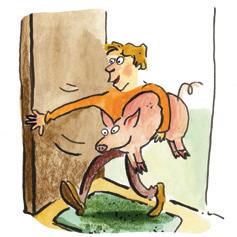
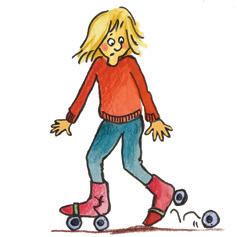


F to break even
G to break the bank
H to bring home the bacon
I to go Dutch
J to have sticky fingers




K to live from hand to mouth
L to make ends meet
M to put money down the drain
N to ride the gravy train
O to tighten your belt



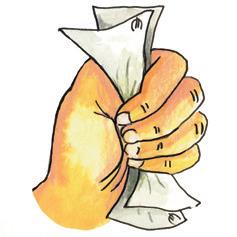



8 Now try it yourself. Draw the following idioms. to do something on a shoestring Money doesn’t grow on trees.a nest egg to pony up to have money to burn
5 They both lost their jobs, so it looks like they will have
6 The campaign was run for years until they found a sponsor.
7 Fixing that old motorcycle again is just ; it will never drive properly again.
8 Ludo bought a new Lamborghini last week and he is now leaving on a cruise. He clearly
9 ‘Dad, can I get a new computer game? Please, buy one for me.’ ‘Calm down, boy. .’
10 I’ve been saving money for years, so I’ll have a nice when I retire.
11 Which tips could you give the people below to save money? Use information from the text and include an idiom in your answer. READING
‘The real Cheerios taste so much better than the fake ones. I’d rather pay a few extra cents than eat a less good option.’ Lucas
‘If I have leftovers, I freeze them to eat later on. Very useful when I am a night home alone, and I just need to put a lasagne in the oven.’ Ike
‘I really don’t know which restaurant to go to. The restaurants nearby are all so expensive. We always end up at the same Italian a few blocks away.’ Jorah 5
‘The items you buy in “Think Twice” are not only cheap, they are typically higher quality simply by virtue of being there. They have withstood one person’s use already and still have resale value.’ Mo
2
‘Cheap clothes are terrible. Most things will only survive one or two washes. Budget fashion stores are certainly not the place to shop if you want decent stuff. It’s more throwaway fashion!’ Annabelle
‘My best friend just got dumped, so we both went binge shopping. Afterwards we shared a pint of Chocolate Chip Cookie Dough ice cream. She really felt better afterwards.’ Nina
CHECK 1, p. 210
1 Which things do you need to plan when travelling?
2 Take a separate sheet and make a mind map about travelling.
a The following categories might help you: general, transport, accommodation and activities.
b Your teacher will read words out loud. Add them to the correct category.
3 Which word is described in the following sentences?
a Complete the crossword.
ACROSS
2 A card that you show before you get on a plane of boat
3 Visiting interesting buildings and places as a tourist
5 A car that you can pay to use for a short time
7 A sum of money you must pay if you cancel a hotel reservation after the cancellation deadline
8 A boat or ship that carries people, vehicles and goods across a river or across a narrow part of the sea
9 Way of travelling by asking for free rides, by standing at the side of the road and trying to get cars to stop
1 A form of accommodation whereby visitors stay in a house or apartment of a local of the city to which they are traveling
4 A long journey during which somebody has a lot of interesting and exciting experiences
6 To go to a desk in a hotel, an airport, etc. and tell an official there that you have arrived
b Which word can you find with the letters in the yellow boxes?
c What is the meaning of this word?
4 Complete the sentences in the text with a suitable word. Mind, not all words have to be used!
accommodation – amenities – backpacking – boarding – customs – delay – destination –double room – itinerary – lodge – room service – security check – single room – souvenirs –travel insurance
When embarking on an adventurous journey like , it’s crucial to be prepared for various situations. After clearing the at the airport, it’s wise to ensure you have to cover any unexpected mishaps. can occur, whether due to weather or other factors, so it’s a good idea to have a flexible . When it’s time to depart, make sure to arrive at the airport early for the boarding process and clear smoothly. Once you arrive at your , you might find yourself searching for options. Budget-conscious travellers often opt for hostels, where you can choose between a or a , depending on your preference and budget. Hostels typically offer basic like a common kitchen and shared bathrooms, but if you’re looking for a more comfortable experience, consider booking a hotel. Hotels usually come with a range of amenities such as room service, Wi-Fi, and more. After settling into your accommodation, it’s time to explore the local culture and attractions. Don’t forget to visit the local markets and shops to pick up that will remind you of your journey. As you plan your next adventure, always keep in mind that travel can be unpredictable.

5 Follow the steps to learn more about travelling on a shoestring.
Phase 1
a Form groups. You will all get the same text. Don’t read the text yet, but look at the title, lead, subtitles and pictures and write down 5 key words about the text.
b You will be asked to answer questions about the text. Which strategies will you use to give the answer as quickly as possible? Mind: don’t read the text yet.
c You will get ten cards with questions on it. Put them downwards on the table. Take turns drawing a card and reading it out loud. Then try to find the answer as quickly as possible.
d Write down the answer. Raise your hand when you finish writing. Tick the box if you were the fastest person.
e Go through the answers together. Make sure you have the correct answer. If not, consult your teacher.
f Formulate the three best tips from your text on a separate piece of paper.
g Congratulations! You have now become an expert!
Phase 2
a Form new groups with an expert from every text.
b Explain your tips to each other and write them down.
6 Promote a free activity or a ‘hidden treasure’ in your neighbourhood.
a Preparation: find a hidden treasure in your own city. If possible, go to the place, take a few photos and come up with 3 to 5 good reasons to visit this hidden gem.
b Action:
1 Make a presentation with the basics of this hidden treasure. Include 4 separate slides with the following information: Where is it? What is it?
a few photos your 3 to 5 reasons
2 Promote the place (or activity) to your classmates. You will only get 45 seconds to convince them.
c Reflection: check your task by filling in the checklist. Listen to the others and choose the place to be!
Checklist: a hidden treasure Yes I think soNo
1 Content and structure
• I used a few photographs.
• I told the others about a hidden treasure in my city.
• I made a presentation to promote my hidden treasure.
• My promotion was 30 – 45 seconds.
2 Language
• I used correct basic grammar.
• I used correct words to explain the hidden treasure.
• I paid attention to my pronunciation.
1 The Americans and the British write and say dates quite differently. Let’s see if you remember the difference. Bingo time!
2 Now complete the box below with the correct information. How to write and say the date
British English
In writing
Examples 10 June 2025 10 / 06 / 2025
American English
December 1st, 2024 12 / 1 / 2024
Rule: + + + +
Examples
In speaking
Rule:
Q: ‘What is the date?’
A1: ‘It's June the tenth, twenty twenty -five.’
A2: ‘It's the tenth of June, twenty twenty -five.’
Q: ‘What is the date?’
A: ‘It's December first, twenty twenty -four.’
3 Listen to Jamal’s itinerary of a trip to Indonesia and complete the missing information. Make sure to write the dates correctly.
DateItinerary
days in West Java to
4 days in : Mt Bromo, Yogyakarta, Borobudor yes no
July 5 2 days in Amed area: yes no 3 days on Lembongan? yes no
July 10 4 days in (maybe check out Trawangan and Air or Meno) yes no
July 14 7 days in Lombok:
July 21
4 Look at the sentences below and answer the questions.
‘We are flying out to Bali on June 23.’
a Which tense is used in this sentence? present simple / present continuous / future simple / future continuous
b When do you use this tense? a general prediction / a vague plan / an action going on in the future / a personal arrangement
‘Maybe we will go to Mt Bromo.’
a Which tense is used in this sentence? present simple / present continuous / future simple / future continuous
b When do you use this tense? a general prediction / a vague plan / an action going on in the future / a personal arrangement
5 Look at these book covers.
a Which cover is more appealing to you? Why?
b What do you think the story will be about? Make predictions, using the given prompts. e.g. (to go) I think they will go on a road trip. 1 (to travel by) 2 (to fall in love) 3 (to make a detour to)

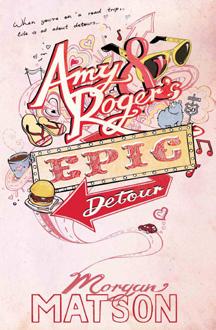
6 Which tense did you use to make these predictions?
7 Read the extracts from the YA novel Amy & Roger’s Epic Detour by Morgan Matson.
a Answer the questions.
1 Who is Pamela Curry?
2 Where has Amy been staying?
3 Why doesn’t Amy want to drive?
4 Who is Roger?
5 How does Amy feel about her mother’s proposition? reading reading 1 2
b Discuss these questions with a partner.
1 Check your predictions in exercise 5. Were you right?
2 Do you think you would like to do what Amy’s mom is asking her to do? Why (not)?
3 Based on this extract, would you be interested in reading the entire book? Why (not)?
“So listen,” my mother said, causing my guard to go up. That was how she usually prefaced any information she was about to give me that I wasn’t going to like. And she was speaking too quickly, another giveaway. “It’s about the car.”
“The car?” [...]
“Yes,” she said, stifling another yawn. “I’ve been looking at the cost to have it shipped on a car carrier, along with the cost of your plane fare, and well …” She paused. “I’m afraid it’s just not possible right now. With the house still not sold, and the cost of your brother’s facility …”
“What do you mean?” I asked, not following. I took a tentative bite of pizza.
“We can’t afford both,” she said. “And I need the car. So I’m going to need it driven out here.”
The pizza was still too hot, but I swallowed it anyway, and felt my throat burn and my eyes water. “I can’t drive,” I said, when I felt I could speak again. I hadn’t driven since the accident, and had no plans to start again any time soon. Or ever. I could feel my throat constrict at the thought, but I forced the words out. “You know that. I won’t.”
“Oh, you won’t have to drive!” She was speaking too brightly for someone who’d been yawning a moment before. “Marilyn’s son is going to drive. He needs to come East anyway, to spend the summer with his father in Philadelphia, so it all works out.”
There were so many things wrong with that sentence I wasn’t sure where to begin. “Marilyn?” I asked, starting at the beginning.
“Marilyn Sullivan,” she said. “The Sullivans used to live over on Holloway, until their divorce, then she moved to Pasadena. But you and Roger were always playing that game. What’s it called? Potato? Yam?”
“Spud,” I said automatically. “Who’s Roger?”
She let out one of her long sighs, the kind designed to let me know that I was trying her patience. “Marilyn’s son,” she said. “Roger Sullivan. You remember him.”
My mother was always telling me what I remembered, as if that would make it true. “No, I don’t.”
“Of course you do. You just said you used to play that game.”[...]
“I remember Spud,” I said. I wondered, not for the first time, why every conversation I had with my mother had to be so difficult. “I don’t remember anyone named Roger. Or Marilyn, for that matter.”
“Well,” she said, and I could hear her voice straining to stay upbeat, “you’ll have a chance to get to know him now. I’ve mapped out an itinerary for you two. It should take you four days.”
“Wait a second,” I said, holding on to the kitchen counter for support. “You want me to spend four days in a car with someone I’ve never met?”
“I told you, you’ve met,” my mother said, clearly ready to be finished with this conversation. “And Marilyn says he’s a lovely boy. He’s doing us a big favor, so please be appreciative.”
“But Mom,” I started, “I …” I didn’t know what was going to follow. Maybe something about how I hated being in cars now. I’d been okay taking the bus to and from school, but my cab ride home that night had made my pulse pound hard enough that I could feel it in my throat. Also, I’d gotten used to being by myself and I liked it that way. The thought of spending that much time in a car, with a stranger, lovely or not, was making me feel like I might hyperventilate.
“Amy,” my mother said with a deep sigh. “Please don’t be difficult.”
Of course I wasn’t going to be difficult. That was Charlie’s job. I was never difficult, and clearly
my mother was counting on that. “Okay,” I said in a small voice. I was hoping that she’d pick up on how much I didn’t want to do this. But if she did, she ignored it. “Good,” she said, briskness coming back into her voice. “Once I make your hotel reservations, I’ll email you the itinerary. [...]”
I realized my mother hadn’t actually been asking. I looked down at the pizza on the counter, but I had lost my appetite.
1 5 10 15
FROM: Hildy Evans (hildy@ravenrockrealty.com)
TO: Amy Curry (amycurry@netmail.com)
SUBJECT: Will be showing house at 4
DATE: June 1
TIME: 10:34 a.m.
Hi, Amy!
Just wanted to let you know that I'll be showing the house to some prospective buyers today at four. Just wanted to make sure that you were aware of the time, so you could make arrangements to be elsewhere. As we've discussed before, we really want people to be able to imagine this as their HOME. And that's easier when it's just the family and me going through the house!
Also, I understand you're going to be joining your mother in Connecticut soon! You can feel free to lock up when you go – I have my copy of the keys.
Thanks bunches!
Hildy
FROM: Mom (pamelacurry@stanwichcollege.edu)
TO: Amy (amycurry@netmail.com)
SUBJECT: The Trip
DATE: June 3
TIME: 9:22 a.m.
ATTACHMENT: TRIP ROUTE
Hi, Amy,
Greetings from Connecticut! I was glad to hear that your finals went well. Also glad to hear that Candide was a success. I’m sure you were great, as usual—I just wish I could have been there! Can’t believe it’s been a month since I’ve seen you! Feels like much longer. I hope you’ve been on your best behavior with your aunt. It was very nice of her to check in on you, so I hope you thanked her.
I’m sure all will go well on the drive. I’ll expect you and Roger no later than the tenth, according to the itinerary I’ve mapped out for you (attached). You have reservations at the hotels listed. Pay for them, meals, and gas with your emergency credit card.
And please be safe! AAA information is in the glove compartment in case of emergencies.
I know you send your brother your love. He emailed me—he says hi. You can’t call at his facility, but he can check email. It might be nice for you to write him one of these days.
Mom one hundred and ninety-seven
Congratulations! You are embarking on a JOURNEY! You might be traveling by plane, train, automobile, ship, bike, or foot! Whatever your means of transportation, you are sure to encounter new people, see new sights, and return home again a changed person with new experiences!
The tips, guidelines, and lists contained in this book will help you to document and organize your trip, ensuring you maximize your experience to the fullest! But the greatest joy of traveling can never be planned for. And that is the element of SURPRISE! Be open to this, as it will make your trip much richer. After all, you never know where the road will take you!
Source: Amy & Roger’s Epic Detour, Morgan Matson
8 Check the underlined sentences from the extracts and answer the questions.
a These sentences all refer to a past present future time.
b How many different tenses do you recognise?
c Which ones? Give an example of each.
d Which form is used most often?
e Do you notice a difference in why the different tenses are used?
9 Look at these sentences and answer the questions.
Example 1 Once I make your hotel reservations, I’ll email you the itinerary. The tips, guidelines and lists in this book will help you to organise your trip. Tense Form
Example 2 I'll be showing the house to some prospective buyers today at four. Amy and Roger will be driving through Nevada from June 6th until June 8th. Tense Form
a Complete the table. Statement Example 1Example 2
In which example is the time frame certain? Which activities will take longer?
b Write the name and the form of the tense in the table.
10 Use the information from the previous exercises to complete the grammar box with the words below. Next, provide an example for each tense. arrangements – fixed – intentions – ongoing – predictions (2x) – promises – spontaneous
There are different tenses that can be used to refer to the future in English, but they all have a specific focus.
Present simple a certain or future (e.g. ) e.g. Hurry up! The plane leaves in 10 minutes.
Present continuous
(= plans have been made for this) e.g. She is doing an astronomy camp.
Going-to future –
(= plans you have already thought about) e.g. Marilyn’s son is going to drive.
– , based on e.g. Look! That car is off track. It is going to crash.
Future simple – , not based on e.g. I’ll expect you and Roger no later than the tenth.
– unplanned events in the future, decisions e.g. You are going to Iceland? I will send you our itinerary from last year.
–e.g. I promise I will be in time to pick you up at the airport.
Future continuous – plans, arrangements, intentions (= very similar to going to-future!) e.g. I'll be showing the house to some prospective buyers today at four.
– events in the future, often with the e.g. Next week this time, we will be sun-bathing in Turkey.
For an overview of the form and the use of these different future forms, check the Summary of this unit. See p. 202
11 Complete the sentences with an appropriate tense to refer to the future.
1 – Why are you buying post cards?
– I (to write) cards to my family back home.
2 Jesse is very excited about his trip to Europe. He (to leave) for France, tomorrow.
3 Isa (to wait) for him when her bus (to arrive) tonight.
4 When he is in Australia, he (to stay) with friends.
5 – I’m about to fall asleep and I need to drive 2 more hours.
– Let’s stop. I (to get) you a coffee. That (to wake) you up.
6 – It is so hot in the car.
I (to turn) the air-conditioning on.
7 We (to drive) to the station at 11.00 because the train (to leave) at 11.15.
8 As soon as the weather clears up, we (to swim) in the sea.
9 – (you – to take) the children with you on your honeymoon?
No, they (to go) on an adventure camp.
10 We (to fly) to London this afternoon.
12 Amy and Roger are on their trip from California to the East Coast. Work with a partner. Read the extract you will get and answer these questions.
a Who is in your extract? How do they feel?
b Summarise what happens in your extract.
c Tell your partner about it.
13 What do you think will happen to Amy and Roger? Write a paragraph (about 50 words) describing your predictions. Describe at least 3 predictions.
Checklist: describing predictions Yes I think soNo
1 Content and structure
• I wrote about 50 words.
• I made at least 3 predictions.
2 Language
• I used the future tenses correctly.
• I used correct basic grammar.
• I used correct spelling and punctuation.
Feedback
14 You will ask and answer questions about the future.
a Preparation: you will get a worksheet to fill in questions. Use the correct future tense, according to the prompts.
b Action:
• Walk around the class and ask at least 5 people the questions on your worksheet.
• Make a note of their answers.
• Try to draw some conclusions.
c Reflect on your writing and speaking by filling in this checklist.
Checklist: writing questions and answers about the future Yes I think soNo
1 Content and structure
• I wrote 5 questions about the future.
• I answered 5 questions about my future.
• I had 5 fluent conversations.
• I drew some conclusions.
2 Language
• I used the future tenses correctly.
• I used correct basic grammar.
• I used correct spelling and punctuation.
• I paid attention to my pronunciation.
Feedback
CHECK 3, p. 221

We’re leaving for Wales tomorrow. We’re going to rent a car and explore the Welsh coast.
Really? I went last year. I will send you a few tips.
We’re going to Malta. When you are in Wales, we’ll be enjoying the Maltese sun.
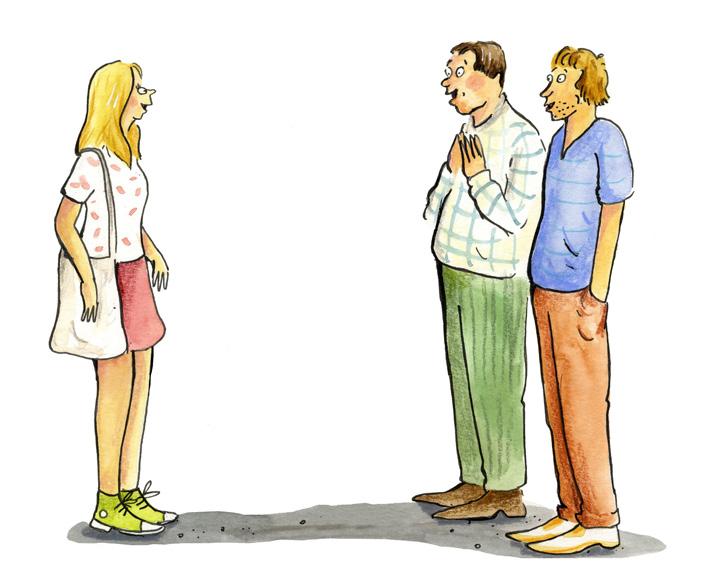
SubjectPositive (+)
1st p. sing.
2nd p. sing.
3rd p. sing.
1st p. plur.
2nd p. plur.
3rd p. plur. I leave You leave She leaves We leave You leave They leave
Rule: Subject + base form of the verb (!) 3rd p. sing.: +s
To talk about a certain or fixed future e.g. The plane leaves in 10 minutes.
Negative (-)
I do not (don’t) leave
You do not (don’t) leave
He does not (doesn't) leave
We do not (don’t) leave
You do not (don’t) leave
They do not (don’t) leave
Subject + do(es)n’t / do(es) not + base form of the verb
Questions (?)
Do I leave?
Do you leave?
Does she leave?
Do we leave?
Do you leave?
Do they leave?
Do(es) + subject + base form of the verb
SubjectPositive (+)
1st p. sing.
2nd p. sing.
3rd p. sing.
1st p. plur.
2nd p. plur.
3rd p. plur. I am doing You are doing She is doing We are doing You are doing They are doing
Rule: Subject + ‘to be’ in present simple + verb in the -ing form
Negative (-)
I am not / I’m not doing You are not / aren’t doing He is not / isn’t doing We are not / aren’t doing You are not / aren’t doing They are not / aren’t doing
Subject + ‘not to be’ in present simple + verb in the -ing form
Questions (?)
Am I doing? Are you doing? Is it doing? Are we doing? Are you doing? Are they doing?
‘to be’ in present simple + subject + verb in the -ing form
To talk about arrangements in the future. This means that plans have been made for this. e.g. She is doing an astronomy camp.
SubjectPositive (+)
Negative (-)
Questions (?)
1st p. sing. I am going to drive I am not going to drive Am I going to drive?
2nd p. sing. You are going to drive You are not going to drive Are you going to drive?
3rd p. sing. He is going to drive He is not going to drive Is he going to drive?
1st p. plur. We are going to drive We are not going to drive Are we going to drive?
2nd p. plur. You are going to drive You are not going to drive Are you going to drive?
3rd p. plur. They are going to drive They are not going to drive Are they going to drive?
Rule: Subject + ’to be’ in present simple
+ going to + base form of the verb
Subject + ’not to be’ in present simple
+ going to + base form of the verb ’to be’ in present simple + subject
+ going to + base form of the verb
– Intentions (= plans you have already thought about)
e.g. Marilyn’s son is going to drive.
– To make predictions, based on evidence that we have now.
e.g. Look! That car is off track. It is going to crash.
SubjectPositive (+)
1st p. sing. I will expect
Negative (-)
Questions (?)
I will not / won’t expect Will I expect?
2nd p. sing. You will expect You will not / won’t expect Will you expect?
3rd p. sing. He will expect He will not / won’t expect Will she expect?
1st p. plur. We will expect We will not / won’t expect Will we expect?
2nd p. plur. You will expect You will not / won’t expect Will you expect?
3rd p. plur. They will expect They will not / won’t expect Will they expect?
Rule: Subject + will + base form of the verb
Subject
+ will not / won’t + base form of the verb Will + subject + base form of the verb
– To make predictions, not based on evidence that we have now.
e.g. I think there will be many activities to choose from at camp.
– To describe unplanned events and spontaneous decisions in the future.
e.g. You are going to Iceland? I will send you our itinerary of last year.
– To make promises.
e.g. I promise I will be in time to pick you up at the airport.
SubjectPositive (+)
Negative (-)
Questions (?)
1st p. sing. I will be showing I will not be showing Will I be showing?
2nd p. sing. You will be showing You will not be showing Will you be showing?
3rd p. sing. She will be showing She will not be showing Will she be showing?
1st p. plur. We will be showing We will not be showing Will we be showing?
2nd p. plur. You will be showing You will not be showing Will you be showing?
3rd p. plur. They will be showing They will not be showing Will they be showing?
Rule: Subject
+ will be + verb in the -ing form
Subject
+ will not be + verb in the -ing form Will + subject + be + verb in the -ing form
– Plans, arrangements, intentions (= very similar to going to-future!)
e.g. I'll be showing the house to some prospective buyers today at four.
– Ongoing events in the future, often with the time specified
e.g. This time next week, we will be sunbathing in Turkey.































watching a sports game
Word Translation My notes account rekening
an ATM een geldautomaat a bank note een bankbiljet a coin een munt consignment shop tweedehandswinkel a credit card een creditkaart
current account zichtrekening a debit card een debetkaart deposit storting freebies weggevertjes frugal zuinig
generic label wit product to haggle afdingen to lend money geld lenen name brand merkartikel overdraft negatief saldo personal care persoonlijke zorg piggy bank spaarvarken price cut korting to purchase aankopen retail therapy iets kopen om je humeur te verbeteren
savings account spaarrekening thrift shop tweedehandswinkel to transfer overschrijven to trim inkorten / inperken to withdraw money geld opnemen
Word Translation My notes
amenities voorzieningen
backpacking met de rugzak op reis gaan
boarding instappen
boarding pass instapkaart
cancellation fee annuleringskosten
check-in check in
credit card kredietkaart
customs douane
delay vertraging
departure lounge vertreklounge
destination bestemming
driver’s license (U.S.)
driving licence (GB) rijbewijs
economy class tweede klasse itinerary reisplanning
odyssey omzwerving, zware tocht
passport paspoort
rental car huurwagen
room service roomservice
security check veiligheidscontrole
souvenir souvenir
travel insurance reisverzekering
travel pillow reiskussen
Idiom Explanation
Translation
to be a cheapskate not wanting to spend much money gierig zijn, krenterig zijn
to be a penny pincher being overly conscious about money iemand zijn die niet graag geld uitgeeft to be closefisted not wanting to spend moneygierig zijn, krenterig zijn to be in the red to spend more money than you earn met het saldo onder nul gaan, in het rood gaan to be loaded to have a lot of money heel rijk zijn, stinkend rijk zijn to break even to neither gain nor lose moneynet uit de kosten geraken to break the bank to be very expensive je blauw betalen to bring home the baconto earn money to support your family geld verdienen, brood op de plank brengen to do something on a shoestring to do something on a budgetiets met weinig geld doen to go Dutch to split the bill equally de rekening eerlijk verdelen to have money to burn to have more money than you need je geld verspillen, geld over de balk gooien to have sticky fingers to be a shoplifter, pickpocketeen dief zijn, lange vingers hebben to live from hand to mouthto live on very little moneyheel weinig geld hebben to make ends meet to make the money neededtoekomen met je geld, de eindjes aan elkaar knopen Money doesn’t grow on trees. Money is not easy to acquire.Geld is niet makkelijk te vergaren. Het geld groeit niet op mijn rug.
nest egg money that has been saved upeen appeltje voor de dorst to pony up to pay for something or settle a debt ophoesten
to pour money down the drainto misuse or throw away moneyje geld verspelen, geld over de balk gooien to ride the gravy train earning a lot without having to do much for it geld verdienen zonder er veel moeite voor te doen to tighten your belt to reduce your budget minder geld gaan uitgeven, de buikriem aanhalen
1 Read the text and answer the questions.
a Complete the text with the given words. Mind, there are more words than you need! borrow – curbing – deposit – discount – expenses – frugal – generic – haggle – marked down – name brand – overdraft – purchases – retail therapy – thrifty – trimming – withdraw
Savvy Clair Hughes, started researching ways to save money as a way of getting out of her
£ 3,500 . During her search, Clair, from Bury, Greater Manchester, stumbled upon a 'couponing' community online – and was hooked.
Clair now estimates she’s saved “easily over £ 15,000” – and even managed to put down a to buy a three-bed semi-detached house with her partner, Shane Byrne. Revealing how she never an item for a full price anymore, Clair, who works in a local school, said: “It’s become a running joke with my friends. Every time we go out, they’ll ask if I have a voucher – and I always do. It might seem as if I am , but I just don’t want to spend unnecessary money, like why go for the labels if you could also just buy ?” “Discounts are always there to be had, it’s just a matter of being organised. Before I started this, I thought it’d be so much work, but now I’m so used to my that it’s automatic to me.”
Clair ’s mind first turned to money saving back in 2010, when she moved in with Shane. Having recently graduated from University, she’d maxed out her £ 3,500 student overdraft – and felt the interest repayments were just lost money.”
After taking to the web for advice, she tried out a few clever money saving tricks like switching her overdraft to a zero-interest account. Then, a few years later, she came across an online community for “couponers” and decided to give it a go. She started spending hours trawling the web for money off vouchers or discount codes, printing them all out to take with her whenever she went shopping. “It would initially take a couple of hours to get organised,” she said. “I’d go on supermarket websites to look through what I’d need in a shop or anything I had a coupon for. I cannot be picky, I just make a note of anything that is . Eventually though, it becomes second nature and you can do it in around half an hour.”
Over the years, the coupon queen has managed to nab some impressive hauls. Two lamps worth £ 140 cost her just £ 35, and because she learnt buying in bulk is usually cheaper, she scored six months worth of dog food for her Pomeranian Puppy for a mere £ 9. Around two years ago, Clair also began using cashback apps and websites where you are given money back on items ranging from beers to toiletries. ”To me, couponing is a bit like , I feel so much better after buying things in discount.”
Source: www.mirror.co.uk
b Answer these questions about the text.
1 Why did Clair have an overdraft?
2 How much time does she spend on couponing?
3 What is 'cashback'?
c Choose an idiom appropriate for these situations
1 The interest repayments are just lost money.
2 Clair now estimates she’s saved ‘easily over £ 15,000’.
3 She got out of her £ 3,500 overdraft.
4 She spends a lot of time looking for ways to spend less money.
2 Write about situations dealing with money.
a Preparation: come up with situations to use the given idioms and words in a natural way.
b Action: write a short paragraph (30-40 words) for each situation.
Situation 1: overdraft – to tighten your belt
Situation 2: frugal – to have money to burn
Situation 3: to purchase – to have sticky fingers
c Reflect on your writing by filling in the checklist.
Checklist: describing situations with money vocabulary Yes I think soNo
1 Content and structure
• I wrote 30 – 40 words for each situation.
• I used the idiom and word in a natural way.
2 Language
• I used correct basic grammar.
• I used other vocabulary correctly.
• I used correct spelling and punctuation.
Feedback
3 What do you see in these pictures? Write a sentence for each photo using 2 words related to money correctly.






4 Find the correct collocations and definitions. a Match a word / phrase from the left-hand column with the right-hand column.
b Match the combinations with the definitions below. 1 : a job which pays a lot of money for little effort. 2 : shopping with the purpose to improve the buyer’s mood. 3 : to have a large amount money to spend. 4 : a store to which people bring items that they no longer want (such as old clothes, shoes, and equipment) to have them sold.
5 : a product that is not sold or made under a particular brand name. 6 : to earn money that is needed to live. 7 : a product that is made by a well-known company. 8 : to spend less money than before. 9 : a small plastic card that is used to buy things that you agree to pay for later. 10 : to pay for the things that you need to live when you have little money. Score < 14
5 Watch Elizabeth Kenzie’s video and answer the questions.
a Complete the table with the correct information.
Subtotal / 8
b What about you? Explain what you already do or what you could also do to save money.
– Preparation: make a note of the tips that Elizabeth Kenzie gives and find at least 3 other tips on how you can save money.
– Action: write a paragraph (50 – 75 words) in which you explain what you already do, what other tips you have and what your favourite tip is.
– Reflection: check your text by filling in the checklist. Find a partner and tell them what you think. Do you agree?
Checklist: writing about how you save money
1 Content and structure
• My text is 50 – 75 words.
• I described what I already do to save money.
• I gave some tips and pointed out my favourite one.
2 Language
• I used correct basic grammar.
• I used money vocabulary correctly.
• I used correct spelling and punctuation.
Feedback
Subtotal / 10
1 You will get a text. Make sure you have a timer (e.g. your mobile phone). Do the tasks below.
a Read a question, hit the timing button and look for the answer. Stop the timer once you have found the answer. Are you over 30 seconds per question? Deduct a point from 8.
Question
1 What is the Australian equivalent of Busabout?
2 Which destinations does the Megabus have outside of the UK?
3 How many budget airlines does the writer recommend?
4 What does he recommend when you do longer journeys by train?
5 Does the writer prefer Megabus or FlixBus?
6 How do you pay when using Gumtree?
7 What is the best option if you have a longer distance to cover and you have a lot of luggage?
8 What is the consequence of the rise of sharing economy?
b What is the meaning of the following underlined words?
‘There are a few recent trends that have helped travellers get around Europe more cheaply: weaker currency exchange rates …’ the cost of exchanging foreign currency at a bank the rate at which cryptocurrencies are converted into traditional fiat currencies the value at which one country’s currency can be exchanged for another country’s currency in the foreign exchange market
‘However, even if you don’t scoop up these amazingly cheap deals, you can still travel for a more reasonable price than on the national bus system.’ to purchase items at their regular price to acquire or take advantage of advantageous opportunities or discounts to pass up on opportunities for savings ‘They do all the legwork for you!’ difficult or boring work that takes a lot of time and effort but is necessary the act of walking around in your neighbourhood from travel agency to travel agency to find out what is cheapest a popular exercise routine for strengthening leg muscles
‘Sometimes these budget airlines cost more money because of all their fees.’ a bonus given for outstanding work a penalty when you do something wrong a payment made for an extra service or privilege
2 Watch the video with tips on how to save money when travelling, and answer the questions.
a What are the 3 things you have to save money on?
b What are the things you remember about a trip?
c How much money is Drew Binsky going to spend a day?
d Complete the table about Binsky's tips.
watching
7 Use budget airlines Watch out for… –
8 Utilise free walking tours Why? What? ––
e Combine the underlined words from the fragment with the correct explanation.
A unlimited Eurail pass
B it’s first class and convenient to get around
1one of the large land masses of the earth such as Europe, Asia or Africa
2useful, easy or quick to do; not causing problems
C spacious and modern buses3large and with plenty of space for people to move around in
D at a leisure pace
4as much or as many as is possible
E in every continent 5without hurrying
3 Look at the pictures and complete the tips about travelling cheap.

Opt for instead of luxury accommodations to save money on lodging while experiencing the thrill of exploration. 1
Choose seats when booking your flights to cut down on airfare expenses, leaving more funds for your adventures. 2



Look for budget-friendly options and make sure your is up-to-date to explore your destination at your own pace.
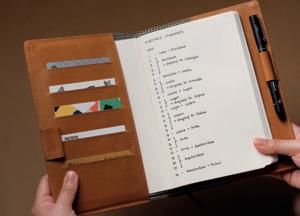

Create a well-organised to make the most of your trip efficiently and avoid unnecessary expenses.


Pack a for comfort during long layovers and be prepared for inspections by having all required documents, like your , ready to expedite the check-in process.
Score < 6 ≥ 6 Next exercise ex. 6
4 Read the introduction and conclusion of the text. Write five hints, using the prompt, as body of the text.
Are you planning a budget-friendly trip but feeling overwhelmed by the cost of accommodations? Don’t worry, you’re not alone! According to recent statistics, over 60% of travelers find that accommodation is their biggest expense while on vacation. The good news is that there are plenty of ways to cut down on this cost without sacrificing comfort or convenience. In this article, we will share our top 5 tips for finding cheap accommodations while traveling so that you can stretch your budget further and enjoy more experiences during your trip.
1 (sharing rooms, hostels, camping, couch surfing)
2 (book in advance, online booking sites)
3 (off season, outside of popular tourist areas)
4 (loyalty programs)
5 (negotiate)
In conclusion, finding cheap accommodation while traveling can be a challenge, but it’s not impossible. By following the top ten tips mentioned above and doing your research beforehand, you’ll save yourself from overspending on lodging. Remember that booking in advance is like planting a seed that will grow into savings later on. So keep an eye out for off-season deals and hotels outside of tourist areas, like a hawk hunting its prey. And don’t forget to utilise loyalty programs or house-sitting opportunities to further cut costs. Happy travels!
Checklist: writing travel tips
1 Content and structure
• My text is 150-200 words.
• I used the prompts to write a body to the introduction and conclusion.
2 Language
• I used correct basic grammar.
• I used vocabulary correctly.
• I used correct spelling and punctuation.
Feedback Score


Next exercise ex. 5 Check 3, p. 221
5 Explore Marrakesh. You have a budget of € 50.
a What is the first thing you need to do when it comes to your budget?
b Make a list of 5 things you could do when visiting Marrakesh. Use a website like Viator or Expedia.
c Find a partner and tell them what you would do when in Marrakesh.
d Did you find the information easily? Evaluate yourself: how well do you think this exercise went?
Checklist: presenting activities to do Yes I think soNo
1 Content and structure
• I went through the activities in a fluent way.
• I found 5 suitable activities.
2 Language
• I used correct basic grammar.
• I used correct words.
• I paid attention to my pronunciation.
Feedback
Score


1 You will have to present the itinerary for a 5-day trip to a classmate.
a Preparation: team up with a classmate and check the itinerary you will get. Use the worksheet below to prepare what you are going to say. Write a full sentence for each item!
DAY 1
Morning
Afternoon
Evening
DAY 2
Morning
Afternoon
Evening
SPEAKING
DAY 3
4
5
Evening
b Action: use your preparation to present the trip to a classmate. Make sure that you use an appropriate tense to refer to the future activities, and mind the way you have to say the dates!
c Reflect on your presentation by filling in the checklist.
Checklist: presenting an itinerary about a trip Yes I think soNo
1 Preparation
• I wrote a sentence for each time frame.
2 Content and structure
• I talked about every day (morning, afternoon, evening).
• My presentation was fluent.
3 Language
• I used the future tenses correctly.
• I said the dates correctly.
• I used correct words.
• I paid attention to my pronunciation.
Feedback
2 Complete the sentences using an appropriate future form.
1 On Saturday at 9 o’clock Jon (to leave) for Columbia.
2 This time next weekend, I (to drink) champagne in Reims.
3 When I turn 25 years old, I (to live) in Australia.
4 We (to think) of you when we (to lie) on the beach and you (to work) all day.
5 We (to meet) at the arrival hall of the airport.
6 Perhaps we (to meet) again one day.
7 Joan (to paint) the house this summer. Then she (to spend) two weeks in Croatia. In September, she (to start) a new job as a social worker.
8 I think Lewis (to send) me a letter from America.
9 This time tomorrow, I (to walk) in the mountains.
10 I (to fly) to Istanbul tomorrow. The plane (to be) at 10:30 a.m.
11 Here is the weather forecast. Tomorrow (to be) dry so we can have our picnic in the park. Score < 11
11
3 Read Mika’s diary and correct the sentences. First make the sentence negative. Then write the correct answer.
August 19 – Sunday noon: lunch with Mom @Da Gio’s 8 p.m.: drinks with the buddies
August 20 – Monday Volunteering job 9 a.m. - 5 p.m.
August 21 – Tuesday 10 p.m. soccer practice 3 a.m. shopping with Deniz
August 22 – Wednesday Trip to Amsterdam. Train at 8.13 a.m., back 6.50 p.m.
9 p.m. squash with Samuel
August 23 – Thursday 3 p.m. cinema with Polly
August 24 – Friday Volunteer job 9 a.m. - 3 p.m.
August 25 – Saturday Chilling at home
1 Mika is flying to Amsterdam on Wednesday.
2 He is going to the cinema on Thursday evening.
3 He is doing volunteer work on weekdays.
4 His mom is coming over for lunch.
5 On Friday he will be travelling to Amsterdam in the afternoon.
6 He is only doing sports on Tuesday.
7 What do you think he means with ‘chilling’ on Sunday? Make 3 predictions about his Sunday.
4 Read this extract from Love & Gelato by Jenna Evans Welch. a Answer the questions.
1 What do you think ‘the worst news’ in Lina’s life is?
2 Who might Howard be?
3 Why did her mother tell her the story about the fountain?
4 Why does her mother think it is important to spend a year in Italy?
The day my mom told me about Howard fell firmly in the really bad category. But at the time, he was the least of my worries.
It was two weeks into my sophomore year of high school and my mom and I were driving home from her appointment. […]
My mom switched off the radio. “Lina, what are you feeling?” Her voice was calm, and when I looked at her I teared up all over again. She was so pale and tiny. How had I not noticed how tiny she’d gotten? “I don’t know,” I said, trying to keep my voice even. “I feel like I’m in shock.”
She nodded, coming to a stop at a traffic light. […] My mom cleared her throat, and when I glanced at her, she straightened up like she had something important to tell me. “Lina, did I ever tell you about the time I was dared to swim in a fountain?”
I whipped around. “What?”
“Remember how I told you I spent a year studying in Florence? I was out photographing with my classmates, and it was such a hot day I thought I was going to melt. I had this friend –Howard – and he dared me to jump into a fountain.” Now, keep in mind, we’d just gotten the worst news of our lives. The worst.
“… I scared a group of German tourists. They were posing for a photo, and when I popped out of the water, one of them lost her balance and almost fell back into the fountain with me. They were furious, so Howard yelled that I was drowning and jumped in after me.”
I stared at her, and she turned and gave me a little smile. “Uh … Mom? That’s funny and everything, but why are you telling me this now?”
“I just wanted to tell you about Howard. He was really a lot of fun.” The light changed and she hit the gas. What? I thought. What, what, what?
At first I thought the fountain story was a coping mechanism, like maybe she thought a story about an old friend could distract us from the two blocks of granite hanging over our heads. Inoperable. Incurable. But then she told me another story. And another. It got to the point where she’d start talking and three words in I’d know she was going to bring up Howard. And then when she finally told me the reason for all the Howard stories, well … let’s just say that ignorance is bliss.
“Lina, I want you to go to Italy.” It was mid-November and I was sitting next to her hospital bed with a stack of ancient Cosmo magazines I’d swiped from the waiting room. […]
“Italy?” I was kind of distracted. […]
“I mean, I want you to go live in Italy. After.” That got my attention. For one thing, I didn’t believe in after. Yes, her cancer was progressing just the way her doctors said it would, but doctors didn’t know everything. Just that morning I’d bookmarked a story on the Internet about a woman who’d beaten cancer and gone on to climb Mt Kilimanjaro. And for another, Italy?
“Why would I do that?” I asked lightly. It was important to humor her. Avoiding stress is a big part of recovery.
“I want you to stay with Howard. The year I spent in Italy meant so much to me, and I want you to have that same experience.”
I shot my eyes at the nurse’s call button. Stay with Howard in Italy? Did they give her too much morphine?
“Lina, look at me,” she said, in her bossiest I Am the Mother voice. “Howard? You mean that guy you keep talking about?”
“Yes. He’s the best man I’ve ever known. He’ll keep you safe.”
“Safe from what?” I looked into her eyes, and suddenly my breath started coming in short and fast. She was serious. Did hospital rooms stock paper bags?
She shook her head, her eyes shiny. “Things will be … hard. We don’t have to talk about it now, but I wanted to make sure you heard my decision from me. You’ll need someone. After. And I think he’s the best person.”
“Mom, that doesn’t even make sense. Why would I go live with a stranger?” I jumped up and started rifling through the drawers in her end table. There had to be a paper bag somewhere. “Lina, sit.”
“But, Mom—”
“Sit. You’re going to be fine. You’re going to make it. Your life will go on, and it’s going to be great.”
“No,” I said. “You’re going to make it. Sometimes people recover.”
“Lina, Howard’s a wonderful friend. You’ll really love him.”
“I doubt it. And if he’s that good of a friend, then why haven’t I ever met him before?” I gave up on finding a bag, collapsing back into my chair and putting my head between my knees. She struggled to sit up, then reached out, resting her hand on my back. “Things were a little bit complicated between us, but he wants to get to know you. And he said he’d love to have you stay with him. Promise me you’ll give it a try. A few months at least.”
There was a knock on the door, and we both looked up to see a nurse dressed in baby blue scrubs. “Just checking in,” she sang, either ignoring or not noticing the expression on my face.
On a Scale of One to Tense, the room was at about 100/10.
“Morning. I was just telling my daughter she needs to go to Italy.”
“Italy,” the nurse said, clasping both hands to her chest. “I went there on my honeymoon.
Gelato, the Leaning Tower of Pisa, gondolas in Venice … You’ll love it.”
My mom smiled at me triumphantly.
“Mom, no. There’s no way I’m going to Italy.”
“Oh, but, honey, you have to go,” the nurse said. “It will be a once-in-a-lifetime experience.”
The nurse ended up being right about one thing: I did have to go. But no one gave me even the tiniest hint about what I’d find once I got there.
Source: Love & Gelato, Jenna Evans Welch
b Write a short paragraph (about 75 words) in which you write what you think will happen when Lina arrives in Italy. Use the prompts if necessary.
her handsome neighbour Lorenzo – her mother’s journal – meeting her father –road tripping in Italy – Tuscany
c Reflect on your writing by filling in the checklist.
Checklist: writing a prediction Yes I think soNo
1 Content and structure
• I wrote about 75 words.
• I wrote about at least 3 things that I think will happen to her.
2 Language
• I used the future tenses correctly.
• I used correct basic grammar.
• I used correct spelling and punctuation.
Feedback
Score < 11
Next exercise ex. 5
≥ 11
All done!

5 Watch the fragment about a trip to Rome. Make a structured itinerary. Look up the correct names and come up with a schedule. Use Google Maps to find out how long you would have to walk between places.
Itinerary
DAY ONE
DAY TWO
DAY THREE
Timing

6 Plan a 3-day vacation in Malta for a very rich couple.
a Preparation: look for flights, accommodation and activities. Your budget for this is € 3,000.
b Action: make your itinerary on a separate piece of paper (or use Word or PowerPoint). Then present this to a classmate.
c Reflect on your task by filling in this checklist.
Checklist: making an itinerary about a trip Yes I think soNo
1 Preparation and content
• I brainstormed about the trip.
• I did the necessary research to find information about the trip.
• I wrote a clear and structured itinerary.
2 Language
• I used correct basic grammar.
• I used correct spelling and punctuation.
• I paid attention to my pronunciation when I presented the itinerary.
Feedback
Score < 12 ≥ 12
Next exercise ex. 5 All done!

You and your partner are planning a holiday together. You have different ideas about where to go and how much money to spend. You will try and convince your partner of your holiday ideas.
1 Pair up. One of you will be partner A, the other one will be partner B.
2 Fill in the table below.
Destination
Means of transport
Lodgings
Activities
Action
3 Have a conversation with the other family members. Focus on starting the conversation, keep the conversation going with your negotiation skills and finish the conversation with a decision everyone is happy with.
4 Use future tenses correctly and try to use at least two idioms in the conversation.
5 Check your conversation using the checklist.
Checklist: a family discussion
Content and structure
• I contributed to the discussion about the next holiday.
• I used at least 2 idioms correctly and in a natural way.
• I used good negotiation skills to get to a compromise.
Language
• I used correct basic grammar.
• I used correct and varied vocabulary.
• I used the future tenses correctly.
• I spoke fluently.
• I paid attention to my pronunciation.
Feedback
Yes I think soNo
SPOKEN INTERACTION
check in
main track
Step 3: structuring texts
Step 4: using reported speech
summary on different tracks
Step 1: discussing global challenges
Step 2: using large numbers
check out: call to action trace your steps
1 Discuss these questions. Do some research if necessary.
a What is the UN?
b What is the UN’s goal? Why was it assembled?
c If you had to do some research, which sources did you use?
2 Watch the video and answer the questions.

a Name 5 of the celebrities in the video and say how you know them.
b Why do you think these celebrities participated in this video?
3 Watch the video again and answer the questions.
a What are the global goals?
b How long will the UN work on these goals?
c Name the first 3 of the sustainable development goals.
d Describe for each of those 3 goals what the UN wants to accomplish.
e Which of these goals do you think is the most important? Why?
1 What do you think? Discuss these questions.
a Listen to the statements about global issues and pick a side: do you agree or disagree?
b Write down 3 things you noticed from the choices you and your classmates have made.
2 Look at the pictograms.
a What do you think the first three symbols represent?
b Match the pictograms to the right title. SPOKEN
Source: www.globalgoals.org/resources
A Quality education I Partnerships for the goals
B Sustainable cities and communities J Life below water
C Gender equality K Responsible consumption and production
D Good health and well-being L Climate action
E No poverty M Affordable and clean energy
F Reduced inequalities N Peace, justice and strong institutions
G Zero hunger O Life on land
H Industry, innovation and infrastructure
3 Read the descriptions that further explain the goals and match them to the pictograms and titles.
Build resilient infrastructure; promote inclusive and sustainable industrialisation and foster innovation.
End poverty in all its forms everywhere.
Achieve gender equality and empower all women and girls.
Reduce inequality within and among countries.
Ensure healthy lives and promote well-being for all, at all ages.
Ensure inclusive and equitable quality education, and promote lifelong learning opportunities for all.
Take urgent action to combat climate change and its impacts.
Ensure sustainable consumption and production patterns.
End hunger, achieve food security and improved nutrition, and promote sustainable agriculture.
Conserve and sustainably use the oceans, seas and marine resources for sustainable development.
Promote peaceful and inclusive societies for sustainable development; provide access to justice for all, and build effective, accountable and inclusive institutions at all levels.
Promote sustained, inclusive and sustainable economic growth, full and productive employment and decent work for all.
Protect, restore and promote sustainable use of terrestrial ecosystems; sustainably manage forests; combat desertification, and halt and reverse land degradation, and halt biodiversity loss.
Strengthen the means of implementation, and revitalise the global partnership for sustainable development.
Make cities and human settlements inclusive, safe, resilient, and sustainable.
Ensure availability and sustainable management of water and sanitation for all.
Ensure access to affordable, reliable, sustainable, and modern energy for all.
Source: sustainabledevelopment.un.org
equitable: fair resilient: able to be strong when something bad happens
4 Check the descriptions in exercise 3 to find words that are similar to words in other languages.
a Highlight these words.
e.g. inclusive: inclusif/ve (French), inclusief (Dutch)
b Now use them to complete the sentences below.
e.g. The SDGs can rightly be called inclusive since they make sure many different parties are able to participate.
1 Just as with the Millennium Goals the SDGs want to tackle both our and production.
2 In order for everyone to have a good education, governments have to invest in , such as school buildings and public transport.
3 If everyone has the same chances of graduating from high school, it also means that everyone has the same of finding a job.
4 Not only is access to drinking water vital, it is equally important that we invest in : promoting hygiene and preventing disease through that.
5 The way we handle our possessions and waste has led to many being destroyed.
6 No one can say how the SDGs are, but we have to make sure that each member state of the UN puts in the full effort to reach the goals.
7 Eating less meat would mean we need less soy, grain and corn to feed e.g. cows, which would result in our taking up less land and leaving more space for wildlife.
8 Our use and disposal of plastics have resulted in enormous garbage patches in the Pacific Ocean, which has had a huge effect on life.
9 It is not just important to make sure a child has a full stomach; it is paramount to ensure they enjoy high quality
10 Natural we might run out of if we do not invest in new technologies are: fresh water, clean air, coal, and oil.
11 Changing our plastic habits might mean we are able to not only save many sea creatures, but could also improve the habitats and survival chances of animals.

Cognates and false friends
– Words that look similar in different languages and have the same meaning are called cognates. They generally come from the same root from an older language. e.g. the words night (English), nuit (French), noche (Spanish), Nacht (German), nacht (Dutch), nag (Afrikaans), nicht (Scots), and many more all come from the same root.
– When two words look similar in different languages but don’t mean the same thing, we call them false friends. For example, sensible means reasonable in English but in French and Spanish it means sensitive
5 Look at the underlined words in the sentences. Replace them with a synonym. Conjugate the verbs if necessary. You may use an online dictionary. accountable – achieve – conserve – empower – ensure – foster – provide – reduce – restore –revitalise
1 To make sure we are able to stop using fossil fuels we must encourage innovation by investing in new projects and research.
2 In order to get equality between men and women we have to fight for equal pay for women in every field.
3 Part of promoting the influence of women is making sure that all girls have access to education.
4 Making inequality smaller is possible by giving women equal access to high-paid jobs.
5 We need to start saving the natural resources of our world that we have been wasting so liberally, because they are not limitless.
6 After the minimal success of the Millennium Goals, it is necessary to give new life to the existing partnerships within the SDGs.
7 Proper education will give both men and women the opportunity to grow within their community.
8 As a global community, we have to make sure our entire population can live a healthy, active and happy life.
9 Humans have heavily damaged some ecosystems, and it is our responsibility to make sure that we bring them back to how they were.
10 Especially large nations, such as the United States and China, are responsible for setting an example in reaching the SDGs.
6 Build new words with suffixes.
a Check the underlined words in the descriptions in exercise 3. Add them to the table.
b Find the other (possible) parts of speech. Use a dictionary if necessary.
c Fill in the correct word (in the correct form) from the table.
1 The world cannot the way we are using all the resources.
2 It has already been proven that renewable energies, such as solar and wind energy, are perfectly , and we could live off them without any problems.
3 Researchers around the world are constantly new technologies for cleaner energy.
4 It is imperative that every company a diverse staff.
5 By tearing down forests we continue to the natural habitats of countless species.
6 Each country is responsible for the of their own measures to reach the SDGs.
7 We are used to having products at our disposal at all times, even when they are not naturally in our country.
8 For many children computers are not , and therefore they have less chance of graduating.
7 Check the table you completed in exercise 6 and answer the questions.
a What can you (sometimes) add to a verb to make it into a noun?
b What can you (sometimes) add to a noun to make it into an adjective?
c What can you (sometimes) add to a verb to make it into an adjective?
d Which verb forms do you recognise amongst the adjectives?
e Fill in the missing participle adjective.
1 In the third world or the world, malnutrition is still a main concern.
2 Farmers have a lot of difficulties with growing food on land.
3 Governments can send an message by ensuring that there is an equal number of male and female officials.
4 The new and public transport system has led to a decline in the number of uneducated children younger than twelve.

8 Read the text about the progress of goal 1, ‘No poverty’.
a Answer the questions about the text.
1 Which region needs specific attention when it comes to reducing poverty?
2 Which countries are usually the poorest?
3 Give an example from the text of a social protection system.
Despite the fact that the global poverty rate has been halved since 2000, intensified efforts are required to boost the incomes, alleviate the suffering and build the resilience of those individuals still living in extreme poverty, in particular in sub-Saharan Africa. Social protection systems need to be expanded and risks need to be mitigated for disaster-prone countries, which also tend to be the most impoverished.

Social protection systems are fundamental to preventing and reducing poverty and inequality at every stage of people’s lives, through benefits for children, mothers with newborns, persons with disabilities, older persons and those persons who are poor and without jobs. Preliminary data show that in 2016, only 45 per cent of the world’s population was effectively protected by a social protection system and that coverage varied widely across countries and regions.
In 2016, 68 per cent of people above retirement age received a pension. However, there are large regional differences. In Oceania, excluding Australia and New Zealand, and in sub-Saharan Africa, only 10 per cent and 22 per cent, respectively, of people above retirement age received a pension in 2016.
Source: sustainabledevelopment.un.org Report of the Secretary-General, ‘Progress towards the Sustainable Development Goals’
Other vulnerable groups lack social protections as well. In 2016, only 28 per cent of people with severe disabilities collected disability benefits, only 22 per cent of unemployed individuals worldwide received unemployment benefits and only 41 per cent of women giving birth received maternity benefits.
Building the resilience of the poor is a core development strategy for ending extreme poverty in the most afflicted countries. Economic losses from disasters are now reaching an average of $ 250 billion to $ 300 billion a year. Disaster risk globally is highly concentrated in low- and lower-middle-income countries. In relation to the size of their economies, small island developing States have borne a disproportionate impact.
alleviate: to make something easier to take disaster-prone: likely to have a disaster mitigate: to alleviate, to make something more bearable
b Build words using prefixes (= letters added before the word). Put each of the underlined words from the text in the correct column.
c What do these prefixes change about the word?
d Add at least 2 more words to the table for each prefix.
9 Complete the grammar box with information from exercises 7 and 8.
How to build new words
1 Prefixes are sets of letters that are added to of another word. They change the of the word.
word prefix new word ability disequality inemployed un-
Depending on the first letter of the word, the spelling for the prefix in- changes: e.g. impossible, illegal and irresponsible.
2 Suffixes are sets of letters that are added to of another word. They often change
word suffix new word real -ity rely -able develop -ment peace -ful organise -ation degrade -ed empower -ing
Depending on the word, the spelling of the root word sometimes changes: e.g. rely – reliable, beauty – beautiful, adore – adorable.
Prefixes and suffixes are always added to other words. They cannot stand on their own in a sentence. See p. 261
10 Combine the prefixes and suffixes from the grammar box with the words below to create as many words as possible. able – comfort – correct – cover – employ – organise
11 Write an Instagram comment.
a Preparation: reread the words from exercise 6 through 10 before you begin.
b Action: use words from these exercises as a hashtag for these Instagram posts. Each post should have at least two different hashtags. Then write a short comment under each post, about 30 words in total. Use at least one more word from these exercises in your comments.

ludo_ludo Territown, NY

23 likes Hashtag finally! I am so happy to see the #citycouncil finally placing decent #parking for me! And remember, #noparking on the white stripes! #basicneeds #equality

merrypippin
Bloemfontein, South Africa

1 like Seriously, #Bloemfontein? Trash has still not been collected and it has been three weeks! What do we do? #basicneeds #sanitation #srsly


56 likes
Soooo happy to be #home again! After spending some time abroad, I feel so fortunate to be able to come back to my community!
#religion #islam #EastLondon
CHECK 1, p. 270 7omar East London Mosque
c Reflection: check your task.
Checklist: writing comments
1 Content
• I wrote a comment about each of the posts.
• I wrote about 30 words.
• I wrote at least two hashtags for each post.
2 Language use
• I used correct grammar.
• I used correct vocabulary.
• I used at least 3 words with prefixes and / or suffixes.
• I used correct spelling and punctuation.
Feedback
1 Watch the video Numbers in action and answer the questions.
a Write down the correct numbers for goal 1 ‘No Poverty’.
1 The base year for each goal is the year
2 The year is the target year.
3 Which numbers and years are used for this goal?
base target
b Colour in the arrow next to the emoji. The more you colour in, the more you feel that way about the video you just watched.



anxious angry surprised hopeful



ashamed indifferent
c In 2014, 159 million children were ‘stunted through malnutrition’. Choose the correct explanation for the words ‘stunt’ and ‘malnutrition’ in this context
stunt prevent something or someone from growing or developing an acrobatic or spectacular action shock or overwhelm malnutrition taking in healthy food poor condition of health because you don't have enough healthy food the study of people's diets watching

2 Do you remember how to talk about large numbers?
a Look up how many people there are in the world today.
b Scan the information below and answer the questions. Keep your answers as simple as possible, e.g. 3,598,382 becomes 3.6 million.
1 How many primary school age children were out of school in 2015? about
2 How many children died before they were 5 in 2000?
3 How many children died before they were 5 in 2015? almost






3 Use the information from exercise 2 to fill in the table below.
Large numbers
The number of primary school age children out of school in 2016 was: 63,353,576 63 3 53 5 76 Earth’s population in 2018 was approximately:
Pay attention to the different use of commas and periods in numbers in English!
- We use to separate numbers greater than 999.
e.g. 9,800,000 children died before their fifth birthday.
- A (or ) is used as a decimal point.
e.g. About 9.8 million children died before their fifth birthday.
- Also, in English the period is pronounced 'point'.
e.g. (5.5) 5 point 5 or (133.75) 133 point 75
4 Practise reading large numbers.
a Take turns reading the following numbers with a partner. Tick the box for each number you or your partner read correctly.
a 5,678,352
b 23,597,123
c 97,211,787,325
d 34,689,298,578
e 4,124,045
f 1,624,678
g 56,882,176
h 3,452,681
i 90,233,247,146
j 7,528,493,445
b You will get a card or list with numbers. If you get the list, read the numbers one by one to your partner. If you get the bingo card, highlight the right numbers. Say BINGO when you get a complete line.
5 Watch the video about the first 3 Sustainable Development Goals.
a Highlight the numbers that you hear in the video.
47,300,00059 % 105144,300,0006,000,000
795,00090,000,0007,000,0001 in 55,000,000
203073,300,00014,600 144,30097,300,000
759,000,00099,300,000795,000,0002010 6,000 1.9144,600,00095 %
b Fill in the missing information.
Welcome to Project Earth Again. In this video we will be talking about UN Sustainable Development Goal number 1 which is all to do with ridding our world of poverty. Here’s what we know! About (1) of Americans live in poverty and about (2) are underpaid which means that (3) Americans have financial difficulties. More than (4) children live under the poverty line. Also, many schools don’t have adequate education opportunities and many jobs do not pay well.
(...) UN Sustainable Development Goal number 2 is all about ridding our world of hunger. Here’s what we know! About (5) people in today’s world are undernourished and over (6) children under the age of 5 are dangerously underweight. That’s almost (7). Also, many countries often experience droughts and famines which can affect the diets of many people. These people may never know when their next meal will be. (...) UN Sustainable Development Goal number 3 is all about sharing our well-being. Here’s what we know! About (8) children in today’s world die under the age of five. These deaths occur mostly in countries where food is scarce, the climate is hot and there aren’t enough resources and life necessities for everyone. And it isn’t just children that are dying. Almost (9) of the world have some sort of medical condition.
6 Watch the video assigned to you and answer the questions.
a Which goal is your video about?
b Which 3 parts does the video consist of? Complete the GOAL column in the table.
c Watch your video again if necessary and fill in the table with keywords and difficult information such as numbers.
d Find a classmate and tell each other about the video you watched.
e Listen to each other. Check the correction key to make sure your classmate has shared correct information, focusing on the numbers.
f Reflect on your task by filling in the checklist.
Checklist: talking about large numbers
1 Preparation and content
• I watched the video.
• I took good notes about each part.
• I specifically mentioned the numbers.
2 Language
• I used correct grammar and vocabulary.
• I used the correct numbers.
• I paid attention to my pronunciation.
Feedback
7 Discuss a country’s budget related to SDGs.
a Preparation: read through the information about a government’s budget that you will get.
b Action: answer these questions, and then report to a classmate. Use the checklist to see if you are prepared for your report.
1 Which country’s budget is it?
2 Which SDG budget is it?
3 How much are they spending now (or most recently)?
4 How much did they spend back in 2010?
5 How much has their budget increased?
c Reflection: listen to a classmate and reflect on their report. Checklist: reporting about a
1 Content and structure
• My classmate read the budget information thoroughly.
• My classmate shared accurate information about the budget a country applies to a specific SDG.
2 Language
• My classmate used the correct vocabulary, specifically when referring to large numbers.
• My classmate used correct grammar.
• My classmate paid attention to their pronunciation.
Feedback
CHECK 2, p. 275
1 Watch the video about the world's biggest issues and answer the questions.
a Complete the sentences and write down the correct issue next to the example from the video.
1 In regions like sub-Saharan Africa people are malnourished.
2 With man-made climate change, deforestation and overfishing the rapid environmental decline might be too late to reverse.
3 of the world’s population risks disease by not having adequate sanitation.
4 Countries like Namibia see only white landowners owning almost half of the country’s agricultural land.
5 Of roughly illiterate adults worldwide are female.
6 Nearly half the world population lives on just
b Put the subjects mentioned in the video in the right order.
c Watch the video again and fill in the missing linking words.
1 , a number of summits provide the opportunity for world leaders to cooperate to achieve these global goals.
2 about a third of the world’s poor are located in India, ten countries house 80 percent of the poorest people on Earth.
3 , nearly 800 million people don’t have enough access to food.
4 , water and sanitation are absolute necessities.
5 , nearly the same number of people without access to food lack access to water.
6 illiteracy is an asymmetrical problem and affects considerably more women than men.
7 Countries Namibia see only a few thousand white land owners owning almost half of the country’s agricultural land.
8 , land distribution has become an increasingly relevant issue.
9 organisations like the UN have implemented standards and worked to save forest, oceans and the atmosphere, it continues to be a serious issue for the international community.
10 addressing issues like poverty and hunger, most countries have made considerable progress on every set goal. watching
2 How can you join sentences together and give your texts structure?
a Fill in the linking words from exercise 1c below. 1 Contrast
Sequence
Conclusion
Example
Addition
Alternative
b Add other linking words that you know.
3 Fill in an appropriate linking word in the sentences below.
1 many countries have invested in renewable energy, none have achieved as much as Scandinavian countries, Sweden.
2 , the Millennium goals were developed by the UN. Later, they were followed by the Sustainable Development Goals.
3 In 2017, greenhouse gases in the UK were reduced by 42 % compared to those of 1990. , the UK are halfway to meeting the 2050 goal.
4 Young scientists, Boyan Slat from the Netherlands, are working hard on major pollution issues.
5 The leading cause of death for children in the United States are unintentional injuries; , drowning or traffic accidents.
6 Some states in the US still condone discrimination based on homophobia they hold religious freedom as an important value.
7 In the UK, electricity generation no longer relies as much on coal. , there was a 6 % drop in carbon emissions between 2015 and 2016.
8 Every country in the world is improving the life standards of its inhabitants, the poorest countries show very slow growth.
9 Improving our cities will increase the citizens’ health and safety. , more attractive cities have a positive effect on our well-being.
10 For goal 12 we want to invest in sustainable consumption what we produce matches what we consume.
4 What is the link?
a Based on the title and subtitle of the article below, which Sustainable Development Goals can be linked to the content? Explain why.
b Read the 2 paragraphs and fill in the missing linking words. Choose from the following words. addition – also (2x) – and – first – in fact – while
Not being able to afford menstrual products is dangerous in more ways than one Elly Belle
Being able to access menstrual products is about more than just dealing with bleeding and feeling comfortable – (1), the lack of access to them can prevent people from being able to go to work or school, (2) can be most devastating to people who experience poverty or homelessness. A new study on access to menstrual products has found that this lack of access can (3) put people at greater risk of depression, anxiety, and further financial barriers.
According to the Independent, approximately 500 women in the United Kingdom who hadn't experienced period poverty – which is the lack of access to menstrual products because of money – and 500 women who had experienced period poverty were surveyed. (4), of those who have experienced period poverty, nearly two-thirds said they lack confidence because of bullies at school. (5), 39 percent reported experiencing anxiety and depression. (6) we already know that lack of access to menstrual products can keep people from going to school or work, prevent them from accessing opportunities, and perpetuate homelessness, these new findings (7) show how far-reaching the impacts of period poverty really may be.
Adapted from www.teenvogue.com

c Below is the rest of the article. 4 parts (A-D) are missing. Put them back in the article by checking which linking words are used. Circle the correct option.
A Because of this, most of the women who responded that they had suffered from lack of access to menstrual products also reported experiencing more money issues than those who had not experienced period poverty, with 4 out of 10 respondents who have experienced period poverty admitting they are often unable to keep up with costs in their daily lives.
C In conclusion, for people experiencing poverty or homelessness, and people who are incarcerated, the effects of this lack of access are far-reaching.
B “The effect that period poverty can have on a girl’s future is truly shocking. No school girl should go without the daily essentials that she needs, and no woman should suffer less opportunities because of this,” said Alesha Dixon, ambassador for the Always UK #EndPeriodPoverty campaign, according to the Independent
D Among other key findings, the study, which was conducted by Always, found that 44 percent of women who had experienced period poverty struggled to find employment after completing their education.
A / B / C / D In addition, she stated: “I have been talking to both students and teachers about the issue, and the shame that young girls feel is very apparent. It’s really important that we raise awareness of this and give girls the confidence to speak up, so that it does not negatively impact them as adults.”
A / B / C / D The findings also show that respondents who said they could not afford menstrual products were more likely to settle for the first job they were offered or one that could pay the bills, as opposed to waiting for a job they truly wanted.
A / B / C / D In fact, period poverty is a serious issue, and menstrual products also remain inaccessible in America.
A / B / C / D Fortunately, there are global initiatives working on increasing accessibility to menstrual products, and nonprofits and shelters that work on getting them to those in need. However, it’s still a huge global issue that extends well beyond the United States or the U.K.
Linking words link or connect your sentences. They make it easier for readers and listeners to understand what you are trying to say.
See p. 268
5 Read the poster about ‘no poverty’. a Answer the questions.
1 What does the UN want to achieve with this first goal?
2 Explain what is meant by ‘social protection’.
3 Give an example of a basic service, as demonstrated by the poster with public transport.

Source: The World’s Largest Lesson, www.globalgoals.org
b Use the information from the poster to complete the sentences below.
With this first goal, the UN wants to
First,
That is to say, they want to and Additionally, we must such as
In conclusion,
6 Tell your partner about the SDG ‘zero hunger’.
a Preparation:
1 Read the poster your teacher will give you. Do additional research online about this topic if necessary.
2 Make a cheat sheet for your spoken report, on this text. Structure your report with linking words.
b Action: report the information to your partner. Make sure to include all the information and to structure your text appropriately, using clear linking words. You can use the structure from the text in exercise 5 as a guideline if you wish.
c Reflection: have your partner fill in the rubric for you after you have checked your own work. Checklist:
1 Preparation and content
• I did research for SDG 2: Zero Hunger.
• I prepared a cheat sheet with keywords and linking words.
• I introduced the topic with an explanation of the goal.
• I included and explained the 4 things we can do to achieve this goal.
• I ended with a conclusion.
2 Language and structure
• I used the correct vocabulary.
• I used correct grammar.
• I used linking words.
• I used correct spelling and punctuation. Feedback
CHECK 3, p. 278
1 Read the text about Justin Trudeau and answer the questions.
a After only reading the introduction, which SDGs seem important to Trudeau?
b What is his role in relation to the SDGs?
Prime Minister Trudeau was elected Leader of the Liberal Party in April 2013. He has been a strong advocate for climate action and nature protection, the empowerment of women and girls around the world, and ensuring an inclusive and resilient recovery from the COVID-19 pandemic.

“To build a better future for people and the planet, we must all place the values of inclusion and sustainability at the heart of everything we do. The 17 Sustainable Development Goals aim to create a world that is fair, equal, and peaceful, with clean air and clean water for everyone. As CoChair of the SDG Advocates group, I look forward to rallying countries, governments, the private sector, and others, to come together to accelerate our progress and continue to raise our voices – and our ambition – on the path to 2030”
— Justin Trudeau, Prime Minister of Canada
Source: www.unsdgadvocates.org/prime-minister-of-canada-justin-trudeau
2 Compare the statements in the table below with sentences from the article.
a Complete the table with the sentences from the article. speech speech
Trudeau said that the 17 Sustainable Development Goals aimed to create a world that is fair, equal and peaceful, with clean air and clean water for everyone.
He said that he looked forward to rallying countries, governments, the private sector, and others, to come together (…).
b What differences do you see?
c What are these types of speech called? Complete the column titles.
3 Compare the two types of speech.
a Highlight the changes in verb tenses. What type of speech is it? Fill it in.
b Underline the changes in personal pronouns.
c Highlight the changes in time and place expressions in another colour.
‘Last year, nations collaborated to advance SDGs, fostering global unity.’
‘This year, we will prioritise clean energy for sustainability.’
‘Countries have made strides in healthcare, but challenges persist.’
‘While we were working on poverty eradication here, globally climate concerns intensified.’
The ambassador said that, the year before, nations had collaborated to advance SDGs, fostering global unity.
The president told the reporter that, that year, they would prioritise clean energy for sustainability.
The journalist states that countries have made strides in healthcare, but challenges persist.
He noted that while they had been working on poverty eradication there, globally climate concerns had intensified.
4 Which reporting verbs are used in the previous exercise?
5 What do you notice?
6 Turn the direct speech into reported speech. Pay attention to pronouns, tenses and expressions of time and place.
1 My company is committed to reducing carbon emissions by implementing eco-friendly practices in our production processes.
She explained that
2 ‘We have successfully achieved our target of recycling 90% of the waste generated in the office this month.’
He mentioned that
3 ‘These governments around the world have been increasingly prioritising renewable energy sources to combat climate change all along.’
The article reported
4 ‘We will be launching a new initiative this year to promote sustainable agriculture here.’
They announced that
5 ‘Individuals taking small steps, such as reducing plastic usage, has always played an important role in achieving Sustainable Development Goals.’
The speaker emphasised that
7 Read this comment by a UN ambassador and its counterpart in reported speech.
A UN Ambassador: ‘Global partnerships are crucial for achieving sustainable development goals by 2030.’
The ambassador said (that) global partnerships are crucial for achieving sustainable development goals by 2030.
a What happens with the tense here?
b Why do you think this is?
c Change the comments into reported speech as in the example.
1 ‘We have to empower women and youth to create more progress towards SDGs worldwide.’
2 ‘Renewable energy initiatives are vital for fighting climate change and poverty.’
3 ‘Education and promoting literacy are essential for achieving SDG targets.’
8 Complete the grammar box with information from previous exercises.
Direct and reported speech
There are two ways of reporting what someone said.
1 You can repeat the exact words of that person, using quotation marks We call this e.g. He said: ‘The world is nowhere near the Global Goals.’
2 Or you use indirect speech, starting your sentence with a reporting verb, e.g., ‘She said (that)…’, ‘He told me (that)…’.
This is called indirect or e.g. He said that the world was nowhere near the Global Goals.
When we change direct to indirect speech:
– change, – references and indications change, – change.
Keep in mind:
– If the situation is still the same, you don’t need to change the verb to the e.g. ‘We are far from achieving the goals.’ – He said that we are far from achieving the goals. – Depending on the type of reporting verb, the of your sentence might change. e.g. He said that we were still polluting our oceans. e.g. He told the government official that we were still polluting our oceans.
See p. 263
9 Fill in the gaps by choosing between ‘say’ and ‘tell’ as a reporting verb. Pay attention to the structure of the sentence and the tense of the reporting verb.
1 Now officials that good communication is very important for achieving SDGs.
2 Experts that clear messages help people know more about sustainable development.
3 The spokesperson the companies that they needed to share information with other nations.
4 Analysts that mistakes in talking stopped some development plans from working well.
5 The report that working together around the world has made it easier to share information.
6 At the summit, the leaders reporters that plans for the future will make sure people talk openly for SDG success.
7 The representative that understanding different cultures is very important in talking across borders.
8 Researchers that better technology will help communication about SDGs improve even more.

10 Rewrite the direct speech into reported speech.
1 The environmentalist explained: ‘Tourism negatively impacts ecosystems, endangering biodiversity.’
2 The historian remarked: ‘In the past, tourism contributed to cultural preservation.’
3 The economist declared: ‘Tourism currently generates significant revenue for local communities.’
4 Studies show: ‘Tourist behaviour in the past shaped destination management strategies.’
5 The government official stated: ‘Sustainable tourism initiatives have been implemented successfully.’
6 The community leader expressed: ‘Our people benefited from responsible tourism practices.’
7 The travel expert observed: ‘Tourism trends are shifting towards eco-friendly and ethical experiences.’
8 The indigenous representative shared: ‘In our history, tourism played a role in cultural exchange.’
9 The business owner mentioned: ‘Future plans include eco-certifications to attract conscientious travelers.’
10 The report concludes: ‘Tourism's future impact will depend on responsible planning and management.’
11 Go back to exercise 10 and circle all reporting verbs.
a What do you notice about these reporting verbs?
b Why would you use these reporting verbs?
12 Watch the video about Justin Trudeau.
a Watch the first part of the video and answer the questions.
1 Based on the introduction, what type of video will this be?
2 What will the subject of the video be?
3 What was Justin Trudeau’s main job at the time of the interview? watching
4 Why are the SDGs important to Trudeau?
b Watch another part of the video and explain it to your classmate. Your classmate will tell you about the part of the video you didn’t watch.
c Write down three things your classmate said using reported speech. Use different reporting verbs! 1 2 3
CHECK 4, p. 284
Prefixes and suffixes

prefix root word suffix
1 Prefixes are sets of letters that are added to the beginning of another word. They change the meaning of the word.
root word prefix new word appear dis- disappear like dis- dislike correct in- * incorrect complete in- incomplete real un- unreal certain un- uncertain
*in- changes to:
– im- before words starting with m, p and b e.g. immature, impossible, imbalance
– il- before words starting with l- e.g. illegal, illegible
– ir- before words starting with r- e.g. ir responsible, ir regular, ir relevant
2 Suffixes are sets of letters that are added to the end of another word. They often change how the word is used (as an adjective, noun, verb or adverb).
root word suffix new word rely -able reliable peace -ful peaceful confuse -ed confused shock -ing shocking organise -ation organisation predict -ion prediction develop -ment development kind -ness kindness real -ity reality terror -ize / -ise terrorize / terrorise just -ify justify
Keep in mind:
– Depending on the word, the spelling of the root word sometimes changes: e.g. rely reliable e.g. beauty beautiful e.g. adore adorable
– An adjective that ends in -ing is used to describe the characteristic of a person, a thing or a situation. An adjective that ends in -ed is used to describe a feeling or an emotion e.g. I was shocked by how shocking the world poverty numbers still are.
3 Prefixes and suffixes can be combined to build even longer words. prefix(es)root wordsuffix(es) un-comfort-able dis-respect-ful mis-re-present-ation un-employ-ment in-secure-ity em-power-ing
Keep in mind:
Prefixes and suffixes are always added to other words. They cannot stand on their own in a sentence.
past perfect (simple and continuous) had done had been doing past (simple and continuous) did was / were doing
Direct and reported speech
present (simple and continuous) do are doing
present perfect (simple and continuous) have done have been doing
Direct speech
= repeating the exact words of a person, using quotation marks
Pronouns 'You are far from achieving the goals.'
Time and place
'It's not safe here.' – 'By now we should have made it further.'
Verbs Present tense
'They solve all issues instantly.'
Future tense
'We will achieve the 2030 goals.'
Past tense
'They were very ambitious in setting the goals.’
Present perfect tense
'Third-world countries have never really been involved in the SDG development.'
Past perfect tense
'These presidents had made many claims.'
Reported speech
= starting a sentence with ‘She said that…’, ‘He told me that…’ usually in the past tense
He said that I am far from achieving the goals.
She told me that it is not safe there – He said that by then they should have made it further.
Past tense
The president said that they solved all issues instantly.
Would + base form of the verb
The member states promised that they would achieve the 2030 goals.
Past perfect tense
He concluded that they had been very ambitious in setting the goals.
Past perfect tense
He argued that third-world countries had never been involved in the SDG development.
Past perfect tense
The journalist wrote that these presidents had made many claims.
Reported
Personal and possessive pronouns I my / mine we our(s) you your(s) he, she his, her(s) they their(s) I, we my / mine, our(s) Adverbial phrases of time and place this these here today tomorrow yesterday last night now that those there that day the next day the day before the night before then, at that time
Keep in mind:
- When the reporting verb is in the past tense (e.g. said, told, noted), the tense of the original verb changes to one tense back in time from the tense in direct speech. This is called ‘backshifting’.
e.g. ‘They solve all issues instantly.' – The president said that they solved all issues instantly.
- When the reporting verb is in the present tense (e.g. states), it doesn’t change.
e.g. We are far from achieving the goals.’ – The report warns that we are far from achieving the goals.
- Also, if the situation is still the same, you don’t need to change the verb to the past. e.g. ‘We are far from achieving the goals.’ – He said that we are far from achieving the goals.
Verbs used to report:
– Some reporting verbs follow the say-pattern: to say something (=direct object) to someone admit – agree – announce – claim – confirm – declare – explain – insist – mention –suggest
e.g. He said to me that we were still polluting our oceans.
– Other reporting verbs follow the tell-pattern: to tell someone (=indirect object) something (direct object) advise – assure – inform – notify – promise – remind – warn e.g. He told the government official that we were still polluting our oceans.
– Certain reporting verbs may be followed by an object and a to-infinitive. advise – allow – ask – beg – command – forbid – force – instruct – invite – order – permit – persuade – recommend – remind – tell – urge – want – warn e.g. She advised them to rally for the SDGs.
Pay attention to the use of commas and periods in large numbers in English.
1,000,000,000 one billion 100 one hundred 1,000 one thousand
1,000,000 one million 100,000 one hundred thousand

e.g. The number of primary school age children out of school in 2016 was 63,653,576
= sixty-three million six hundred (and) fifty-three thousand five hundred (and) seventy-six
Rule:
– Hundreds and thousands are separated by ‘and’ in British English but not in American English.
– Hundreds and tens are separated by ‘and’ in British English but not in American English.

e.g. Earth’s population in 2018 was approximately 7,632,000,000
= seven billion six hundred (and) thirty-two million
Rule:
Hundreds and millions are separated by ‘and’ in British English but not in American English.
Full stop or comma?
Pay attention to the use of commas and periods in large numbers in English.
- We use commas to separate numbers greater than 999.
e.g. 9,800,000 children died before their fifth birthday.
- A full stop (or period) is used as a decimal point.
e.g. About 9.8 million children died before their fifth birthday.
- Also, in English the period is pronounced point.
e.g. (5.5) 5 point 5 or (133.75) 133 point 75.
Word Translation My notes to account forrekenschap afleggen accountabilityverantwoordelijkheid accountableverantwoordelijk to achievebereiken to afford veroorloven affordabilitybetaalbaarheid affordablebetaalbaar agricultureagricultuur, landbouw availabilitybeschikbaarheid available beschikbaar conservationbewaring, behoud to conservebewaren to consumeverbruiken, consumeren consumptionconsumptie degradationachteruitgang, degradatie to degradeverslechteren, afbreken degraded verarmd degradingvernederend to developontwikkelen developableontwikkelbaar developingontwikkelingsdevelopmentontwikkeling disability beperking disproportionateniet naar verhouding, onevenredig ecosystem ecosysteem effective effectief to employaannemen, tewerkstellen employmentwerkgelegenheid to empowerkracht geven empoweringkrachtiger makend, kracht gevend, emanciperend empowermentemancipatie
Word Translation My notes to ensure verzekeren to foster bevorderen, stimuleren to implementtoepassen, invoeren implementationtoepassing, invoering impoverishedverarmd to improveverbeteren improved verbeterd improvementverbetering inclusion inclusie inclusive inclusief inequalityongelijkheid infrastructureinfrastructuur marine zeenutrition voeding opportunityopportuniteit, kans peace vrede peaceful vredig to providevoorzien provision verschaffing, voorziening to reduce verminderen reduction vermindering reliability betrouwbaarheid reliable betrouwbaar, degelijk to rely on rekenen op resource hulpbron restorationherstel to restoreherstellen revitalisationhernieuwing, stimulering to revitalisenieuw leven inblazen sanitationsanitaire voorzieningen to sanitiseontsmetten to sustainvolhouden, steunen sustainabilityduurzaamheid sustainableduurzaam terrestrialaards, landunemployedwerkloos unemploymentwerkloosheid
1 Showing contrast

2 Showing similarities
While a lot of progress has been made, only a minority of the world’s population no longer lives in extreme poverty. but while ... only ... however, although, on the one hand, ... on the other hand even though yet
Culture contributes much to sustainable urban development. Similarly, the way urbanisation is planned has a direct impact on the protection of our cultural heritage. similarly like likewise

3 Giving examples

4 Showing result
Global issues, such as poverty and hunger, are addressed in the SDGs. for example such as like in fact
Countries are working together to tackle the availability of education. As a result, the number of illiterate people has declined worldwide. consequently so as a result

5 Giving reasons

Because the effects of climate change are becoming more and more visible, scientists have urged our governments to take immediate and proper action. because because of since due to this is why
6 Showing a sequence

7 Giving a clarification
First, the UN sets up the Millennium Goals. first and foremost and first(ly) second(ly) third(ly) lastly finally
8 Giving a conclusion
The UN wants to ensure that no one has to lead a life in poverty. In other words, everyone should have a standard minimum quality of life. in other words that is to say

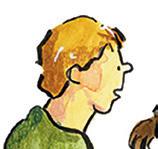
9 Adding information
In short, the UN expects all countries to participate in actively reaching these goals. in short to summarise in conclusion concluding
The UN member states have pledged to prevent problems such as floods. In addition, they have signed on to protect the variety of species that we cultivate and breed. additionally also another major issue and besides in addition

10 Giving an alternative

To decrease inequality in the workplace, managers can themselves implement a strict HR policy or they can cooperate with external specialised HR companies. either or
1 Search and provide information about the Millennium Development Goals (MDGs).
a Preparation: read the text and answer the questions.
1 What did the UN want to achieve with the MDGs?
2 Which programme is the follow-up of the MDGs?
The eight Millennium Development Goals (MDGs) form a blueprint agreed to by all the world’s countries and all the world’s leading development institutions. They have stimulated unprecedented efforts to meet the needs of the world’s poorest. The UN is also working with governments, civil society, and other partners to build on the momentum generated by the MDGs and carry on with an ambitious post-2015 development agenda.
Source: un.org/millenniumgoals
b Action: complete the table about the MDGs. Follow this procedure:
1 Look at the symbols for each of the eight MDGs and write down one sentence about what you think each goal was. Use appropriate and diverse vocabulary.








Source: un.org/millenniumgoals
2 For 2 of these Goals, find information on the targets in the sources the teacher will give you.
3 Talk to a classmate and write down the information they give you about the targets they have selected for each Goal. Be as specific as possible.
SPEAKING
4 Switch when you are done.
c Reflect on your task by filling in the checklist. Then ask your partner to give you feedback too.
1 Preparation
• I found the answers to the 2 reading questions.
2 Content
• I wrote 1 general sentence for each goal.
• I selected specific information on the targets for 2 goals.
• I explained the 2 goals clearly to my partner.
• I wrote down the correct information about my partner’s goals.
3 Language
• I used the correct vocabulary.
• I used correct grammar.
• I used correct spelling and punctuation in my writing.
• I paid attention to my pronunciation when I explained the goals to my partner.
Feedback
2 Practise your vocabulary.
a Take words from the box to fill in the gaps. Change them to fit the correct tense, number etc. if necessary. Note that not all the words have to be used. achieve – ability – afford – availability – develop – ecosystem – effective – employed –employment – ensure – equality – foster – inclusive – infrastructure – opportunity –reduce – rely – restore – revitalise
1 The first MDG included the achievement of full and productive , and decent work for all, including women and young people.
2 In developing regions, the proportion of people living on less than $ 1.25 a day was from 47 per cent in 1990 to 22 per cent in 2010, five years ahead of schedule.
3 The Namasalina Irrigation Project in Zomba, Malawi that families harvest enough food, saving many from hunger.
4 The Zero Hunger Challenge aims to many things such as: 100 per cent of adequate food all year round, zero stunted children of less than 2 years old, and zero loss or waste of food.
5 Thanks to the second MDG, education has become more leading to the rise of literacy rates among adults and youths, and the decline of gender gaps.
6 Going to school is not enough; quality education is critical.
7 Since 2004, Abriendo Oportunidades is improving for girls in Guatemala, who often face a future of limited schooling and early marriage.
8 Through MDG 7, people in Panamanian communities have participated in the design and construction of water , and water management committees have been to maintain and ensure the sustainability of the system’s infrastructure.
Source: un.org
b Add a prefix or suffix to the remaining words. Use the new words to match the definitions.
1When you are unable to walk because of a physical limitation
2When something has a price that an average person can pay
3When you can count on someone or something
4Considered of third world countries
5When a person has no job
6The process of actively improving
7When there exists a difference between two parties
Score < 11 ≥ 11
Next exercise
Check 2, p. 275
3 Practise your vocabulary and make new words.
a Match the underlined words with the correct meaning.
Context
1 Poor sanitation can result in the spread of disease.
2 Renewable energy, such as solar and wind energy, is sustainable and should replace fossil fuels sooner rather than later.
3 Most of our agriculture is designed for the consumption of meat: raising cattle, growing grains etc.
4 Learning how to better insulate a house leads to conserving more energy and wasting less fossil fuels.
5 For our changes to be effective, we have to be united in the support and implementation of the SDGs.
6 Our consumption of meat is leading to an irreversible catastrophe.
7 The Australian reefs are all part of a very delicate ecosystem
8 Empowering girls and women is essential in reaching gender equality.
9 If farmers don’t have the proper knowledge about agriculture, this can lead to the degradation of their land.
10 The development of better healthcare is paramount in the decrease of infant deaths.
Meaning
A Both things that are living and things that are not, which exist together in one environment.
B The process of growing or improving
C To give power to someone
D The process of damaging something
E Producing a wanted or positive result
F The use or purchase of something
G The process of keeping clean
H Science or occupation of farming
I To keep safe or to use sustainably
J Able to be used without completing running out of, damaging or destroying it
b Remove and / or add a prefix or suffix to the underlined words so that you can use them in one of these sentences.
1 The of vegetarianism has been proven in several studies that show the negative environmental impact of eating meat.
2 Instead of giving money to the poor, it is much more important to poor communities through education and awareness campaigns.
3 One of the approaches the UN holds dear is the fact that not only third world countries but all nations are countries.
4 Farmers can be taught about bio-diversity and how to modernise their practices in order to prevent them to unknowingly their own lands.
5 The SDGs are formulated and set up in such a way that all participating countries can the agreements that have been adopted previously.
4 Discuss a global millennium challenge.
a Preparation:
• Read the fact sheet your teacher will give you. Make sure you understand the goal, targets and fast facts before you continue. Make some notes on a separate piece of paper.
• Read the What’s working? section. Make an overview of the important facts mentioned on a separate piece of paper.
b Action: use your preparation to make a short presentation about which targets were achieved and how. Use appropriate vocabulary. Present this information to a partner.
c Reflect on your task and on your classmate’s task. Fill in both checklists.
Checklist: speaking about global challenges
1 Preparation
• I read and understood the targets for this goal.
• I read the What’s working? section.
• I made notes and a brief overview.
2 Content
• I spoke about the targets and if / how they were achieved.
• I talked for about 1 minute.
3 Language
• I used the correct vocabulary.
• I used correct grammar.
• I paid attention to my pronunciation.
Feedback
Score < 12 ≥ 12
Next exercise ex. 5
classmate Yes I think soNo Yes I think soNo
Check 2, p. 275
5 Fill in the right word that matches the example.
1 A poor farmer only has corn in his fields. For years he has been growing corn without ever changing the crops or improving the soil. After many years, his harvest becomes worse and worse. This is an example of land
2 To make sure all students can take the classes they need, a school keeps one room on the ground floor available for groups who have students with a physical disability. This is an example of being
3 The city council received a request to change rubbish collection in one large street, which had a lot of restaurants, to make sure all the waste could be collected daily instead of three times a week. This way the restaurants can have cleaner spaces. This is an example of
4 A large harbour city has decided to put up 50 windmills in their industrial districts to provide energy. They are now able to decrease their use of fossil fuels. This is an example of natural resources.
5 Many children who live outside of larger cities find it difficult to get to school. They either have to walk, or get a lift from a parent or family member. When the government decides to extend the bus routes further outside the city to accommodate schoolchildren, this is an example of improvements in
6 Arriving on time is always important, especially if you are going to work. Anyone who commutes by train knows that there can be improvements in the daily train schedules. An
exemplary train system can be found in Japan where trains hardly ever have delays. This system is an example of something that is
7 The Millennium Development Goals largely failed to meet their targets. A part of the seventh goal (access to drinking water) however had already been met by 2010, which was five years ahead of its time. The latter is an example of being
Score < 6 ≥ 6
Next exercise
Check 2, p. 275
1 Watch the UN’s Red Alert video and answer the questions.
a Before watching the video, answer the questions, and then read the sentences in exercise b.
1 What is the full title of the video?
2 What could they mean by ‘red alert’?
3 What information do you expect to hear in this video?
4 What is an SDG Moment? Research online.
b Watch the video and fill in the numbers in the gaps, using numbers as much as possible, e.g. 52,000 instead of fifty-two thousand.
1 suffer from hunger.
2 Drugs alone are estimated to displace people by 2030.
3 Meanwhile, fossil energy receives dollars in subsidies.
4 At this pace by 2030, children won’t have secondary level education.
5 Scale up the transition to renewable energy creates green jobs.
6 Phase out fossil fuels and tax carbon: dollars.
7 Free up dollars for climate resilience, people and communities.
8 for Africa to achieve universal energy access by 2023. watching
9 Scale up the digital transformation to educate the kids who missed school in the pandemic.
10 Educate girls, including the who are not in school now.
Score < 12 ≥ 12
ex. 2 ex. 3
2 You will get a list with numbers. Read them to a classmate. Your classmate will write them down. Correct them together. Then switch roles.
3 Read the introduction to chapter 1 of the Global Sustainable Development Report 2023.
a From the first paragraphs of the chapter below, what do you think? Are we making progress towards the SDGs? Highlight how you know this in the text.
At the halfway point of the 2030 Agenda for Sustainable Development, the world is far off track as shown in the figure which captures current status of the Sustainable Development Goals. Without urgent course correction and acceleration, humanity will face prolonged periods of crisis and uncertainty – triggered by and reinforcing poverty, inequality, hunger, disease, conflict and disaster. At a global level, the “Leave no one behind” principle is at significant risk.
In 2019, the previous Global Sustainable Development Report found that for some targets the global community was on track,
but for many others the world would need to quicken the pace.
In 2023, the situation is much more worrisome owing to slow implementation and a confluence of crises. For Goals in which progress was too slow in 2019, countries have not accelerated enough, and for others, including food security, climate action and protecting biodiversity, the world is still moving in the wrong direction. In addition, recent crises including the COVID-19 pandemic, cost-of-living increases, armed conflict and natural disasters have wiped out years of progress
on some Goals including eradication of extreme poverty. Progress has slowed down on targets including ending preventable deaths of children under 5, vaccine coverage and access to energy. These crises are not independent events; they are intertwined through multiple environmental, economic and social strands, each fuelling the other’s intensities. Addressing interconnections was a starting
40 45
point for elaborating the 2030 Agenda. This Report shows how these interconnections offer opportunities to act in an integrated way to release positive synergies and achieve the Sustainable Development Goals.
Source: https://sdgs.un.org
b Read the next part of this chapter to support your answer for exercise a.
c Which SDG aims to prevent or reduce war? If you cannot find the answer in the text for exercise b, research it online.
d Read the continuation of the Global Sustainable Development Report, specifically the part about conflict, war and instability, and make notes. Then tell a classmate what you think is important in the paragraphs. Make sure to use as many numbers as possible.
Checklist: reporting about numbers
1 Content
• I answered the questions.
• I made notes on the specific part of the chapter.
• I mentioned the numbers.
2 Language
• I used the numbers correctly.
• I used correct grammar.
• I used correct vocabulary.
• I paid attention to my pronunciation. Feedback Score


1 Write a summary of the fact sheet on one of the Sustainable Development Goals.
a Preparation: read the fact sheet for one of the Sustainable Development Goals and answer these questions.
1 Which goal is your fact sheet about?
2 Which information on the fact sheet doesn’t surprise you?
3 How do you feel about the goal? Do you think we can achieve it?
b Action: use the information from the fact sheet to write a short summary on a separate piece of paper. Use your own words as much as possible. Don’t forget to use good linking words (at least 5). Make sure to include the following:
• A short description of the targets of the goal.
• A short description of what is necessary to achieve the goal.
• At least 2 examples of actions being undertaken to achieve the goal.
• Your opinion on whether the goal is achievable.
c Reflection:
• Check your text by filling in the checklist.
• Give your text to a classmate who will give you feedback. Make the necessary changes.
• Finally, give your text to your teacher who will give you feedback as well.
Checklist: writing a summary
1 Preparation
• I read the fact sheet.
• I answered the questions.
2 Content
• I wrote about the targets of the goal.
• I wrote about what is necessary to achieve it.
• I gave at least 2 examples of actions.
• I gave my opinion on the achievability of the goal.
3 Language use
• I used the correct vocabulary.
• I used correct grammar.
• I used correct linking words.
• I used correct spelling and punctuation.
Feedback
2 Read the text about teenagers overachieving.
a Answer the questions.
1 Which inventions have you heard of that are beneficial to achieving the SDGs?
2 Which SDGs might be helped by the inventions in the article?
b Fill in the missing linking words. Choose from the following words.
additionally – also – although – and – because – but – consequently – first – however –in conclusion – in fact – lastly – next – since – so – such as – then – though – while

Many are too young to drink, drive, or even catch an Uber –but they’re already filing patents.
By Zaria Gorvett
They’re known for their mood swings, social media addiction and dubious fashion choices. (1) some teenagers break the mould. A new generation of precocious youths is solving the problems of today with ambitious, groundbreaking tech. (2) you might already feel like an underachiever, here’s our shortlist of two incredible teenagers already reshaping the world we live in.

Cavé’s journey of invention began with the Deepwater Horizon oil spill, which unfolded in the Gulf of Mexico in 2010. It led to the largest maritime slick in human history, consisting of 4.9 million barrels (210 million gallons, or 780,000 cubic metres) of oil in one of the most ecologically important bodies of water on the planet.
(3) ,
baby dolphins began dying at six times the usual rate, (4) fishermen and scientists reported “disturbing numbers” of deformed sea creatures including shrimp with missing eyes and eye sockets, and fish with oozing sores and lesions.
Watching the news reports on TV, Cavé instantly felt that there must be some hidden environmental damage (5) she decided to focus her attention on discovering what was really going on.
At 15, the teenager (6) began studying what happens to oil when it’s left on the ocean’s surface and (7) discovered that when it’s hit by UV rays from the Sun, it reacts to form chemicals that are carcinogenic. Today she’s turned her work into two scientific papers and two patents, for chemical methods of detecting the carcinogens. She’s (8) launched a startup, Mare, which is working towards a way to disperse them so that they aren’t as damaging. (9) , her research has just received $ 1.2 m (£ 860,000) in funding.

Just a few years later, Cantú set out to protect others from the disease. Together with three friends, he formed the company Higia Technologies, which is developing a wearable device that may be able to detect the early signs.
This inventor was just 13 years old when his mother was diagnosed with breast cancer. He watched in horror as the tumour swelled from the size of a grain of rice to a golf ball-sized lump in less than six months. She ended up losing both her breasts, (10) eventually she was cancer free.
The prototype EVA bra consists of sensors that can be attached to a normal bra, and may need to be worn for just one hour every week to work. The idea is to look for some of the many known signs of the disease, (11) changes in skin temperature and elasticity. (12) , data is sent to the company’s app and, (13) , artificial intelligence algorithms use it to calculate the person’s risk.
The device has already raised $ 20,000 (£ 14,300) of funding by winning the Global Student Entrepreneur Awards. (14) , it still looks to be a long way off production (15) it hasn’t yet gone through clinical trials (16) similar technologies have proved unreliable in the past.
If the project succeeds, it could help save millions of lives (17) early detection is crucial for treatment to be successful. Nearly 1.7 million new cases of breast cancer were diagnosed in 2012 and the same year, it led to over half a million deaths.
Today’s teenage inventors are part of a long tradition. (18) , many of the world’s most prolific brains started young –coming up with television, telephones and
trampolines, as well as braille, calculators, popsicles and ear muffs before they reached their 20th birthdays.
(19) , while it’s true that both students are considerably more
wide-eyed and fresh-faced than their adult colleagues, make no mistake – they could be the next Thomas Edison or Elon Musk.
precocious: when a child or teenager shows the abilities of an adult prolific: producing a lot of something slick: a thin layer of liquid that makes something slippery
3 Rewrite this text to make it more personal and more structured.
a Preparation: brainstorm about concrete examples of how you can work on the challenges mentioned in the text below. Choose 3 to focus on and brainstorm below.
Imagine a world where there is NO POVERTY and ZERO HUNGER. We have GOOD HEALTH AND WELL-BEING, QUALITY EDUCATION, and full GENDER EQUALITY everywhere. There is CLEAN WATER AND SANITATION for everyone. AFFORDABLE AND CLEAN ENERGY has helped to create DECENT WORK AND ECONOMIC GROWTH. Our prosperity is fueled by investments in INDUSTRY, INNOVATION AND INFRASTRUCTURE and that helped us to REDUCE INEQUALITIES. We live in SUSTAINABLE CITIES AND COMMUNITIES and RESPONSIBLE CONSUMPTION AND PRODUCTION is healing our planet. CLIMATE ACTION has capped the warming of the planet and we have flourishing LIFE BELOW WATER and abundant, diverse LIFE ON LAND. We enjoy PEACE AND JUSTICE through STRONG INSTITUTIONS and have built long term PARTNERSHIPS FOR THE GOALS
b Action: rewrite the text. Include at least 3 examples from your brainstorm. Make sure that you also include at least 8 different linking words. Write on a separate piece of paper.
c Reflect on your writing by filling in the checklist.
Checklist: rewriting a text
1 Content
• I added at least 3 concrete examples of how I would work on these global challenges.
• I gave more structure to the text by adding linking words.
2 Language use
• I used the correct vocabulary.
• I used correct grammar.
• I used correct linking words.
• I used correct spelling and punctuation. Feedback Score
Next exercise All done! / Check 4, p. 284
4 Watch the video of Kid President and then present your own proposals.
a Preparation: answer these questions about the video.
1 What is the topic of the video?
2 Which options don’t seem very good to Kid President?
3 Why does Kid President think that one person can make a difference by doing something small?
4 Do you think a title or being famous can actually help you achieve changes in the world? If so, how?
b Action: what about you? How would you change the world?
1 Make a list of 10 things you would change in your city (or school, country) if you were in charge and think about how you would do it. Which of these 10 can you easily implement? Choose 5.
2 Try to convince a classmate or your teacher by giving a short speech about your proposals:
• Introduce your topic.
• Mention at least 5 things you want to change and how you would do this.
• Finish your speech with a short summary or catch phrase.
• Don’t forget to use good linking words!
c Reflect on your task by filling in the checklist.
Checklist: giving a short speech MeClassmateTeacher
1 Preparation
• I watched the video and answered the questions.
• I listed 10 things I would like to change and how I would do it.
2 Content
• I introduced my plan.
• I mentioned at least 5 things I would change and how I would change them.
• I concluded with a summary and a catch phrase or promise.
3 Language use
• I used the correct vocabulary.
• I used correct grammar.
• I used correct linking words.
• I paid attention to my pronunciation.
Feedback
Score < 15
≥ 15
Next exercise ex. 5 All done! / Check 4, p. 284
5 Write a letter to your principal to explain why you think your school should work on a World Affairs Challenge.
a Preparation: watch the video on the World Affairs Challenge and answer the questions.
1 Which measures does the WAC project for refugees in Denver propose?
2 Name one positive aspect to the World Affairs Challenge mentioned in the video.
b Action: choose one of the topics below and write a text to the principal of your school. Include the following information:
• Why should your school work on this issue?
• What can your school do to help solve this problem?
• Which action would you like to undertake?
TOPICS: the European refugee crisis the plastic waste pollution in the seas and oceans air pollution in cities, and especially around schools watching
c Reflection: check your text by filling in the checklist. Then, give your letter to a classmate who will give you some feedback too.
Checklist: writing a letter Me
1 Content
• I explained my choice.
• I explained my ideas for actions.
2 Language
• I used the correct vocabulary.
• I used correct grammar.
• I used correct linking words.
• I used correct spelling and punctuation.
Feedback Score < 11 ≥ 11
Next exercise ex. 3 All done! / Check 4, p. 284
1 Watch the video on the SDGs in Africa and answer the questions.
a Are these statements true or false? Correct the false statements.
Statement
1 The African Union’s agenda seeks to ensure the elimination of poverty by 2030.
2 The African Union’s goals are more realistic than the SDGs.
3 All African countries have sufficient fiscal resources to achieve the SDGs.
4 The SDG stimulus will give only African countries access to long-term low interest loans. watching
5 The strong advice for African countries is to open up their economies to the private sector.
Subtotal / 5
b Write down statements from the reporter and the interviewee. Use reported speech and vary the reporting verbs, as in the examples.
e.g. The reporter said that the SDGs and the African Union’s agenda are more or less the same. e.g. The reporter mentioned that the UN will be holding a midterm review.
2 Indicate the parts of the sentences that (might) change when you turn direct speech into reported speech.
a What type of speech is it? Fill it in.
b Highlight the following parts of the sentences in different colours: pronouns – verbs – indication of place or time
c Underline the reporting verb.
1 ‘Yesterday, we interviewed the UN ambassador.’
speech speech
2 ‘Next week, the president will speak at the council to address the issues.’
3 ‘Even though I don’t agree with the agenda, I promise that our country will put in the necessary effort to achieve it.’
4 ‘These nations have reached most of the easy goals.’
Score < 8 ≥ 8
Next exercise ex. 3
The reporter mentioned that they had interviewed the UN ambassador the day before.
The speaker said that the president would speak at the council to address the issues the following week.
The president declared that, even though he didn’t agree with the agenda, he promised that their country would put in the necessary effort to achieve it.
The critic told me that those nations had reached most of the easy goals.
3 Rewrite the sentences in reported speech. Use the word between brackets as the subject and vary the use of reporting verb.
1 The SDGs aim to address global challenges such as poverty, hunger, and climate change. (the UN ambassador)
2 Currently, countries around the world are working together to achieve the SDGs and create a more sustainable future. (reporter)
3 In 2015, world leaders adopted the SDGs as a universal call to action, committing to achieving them by the year 2023. (teacher)
4 By 2030, it is hoped that significant progress will have been made. (critic)
5 Over the years, various initiatives and projects have been implemented to support the SDGs. (reporter)
6 While the SDGs were being developed, stakeholders from diverse backgrounds were actively participating in discussions to shape the agenda. (the King)
7 International organisations and governments collaborated to fulfill the different targets of the SDGs. (the student)
4 Read the poster about SDG 4 Quality education and answer the questions.
a Do you think that we will be able to reach this goal by 2030?
b Name the three reasons for this.
c Write down six findings from the 2023 SDG report on quality of education in reported speech. You can find more information online if you wish.
e.g. The 2023 report stated that the world was falling behind in achieving quality education.
ENSURE INCLUSIVE AND EQUITABLE QUALITY EDUCATION AND PROMOTE LIFELONG LEARNING OPPORTUNITIES FOR ALL
DESPITE SLOW PROGRESS,
WITHOUT ADDITIONAL MEASURES, BY 2030:
CHILDREN AND YOUTH
ONLY 1 IN 6 COUNTRIES WILL ACHIEVEE UNIVERSAL SECONDARY SCHOOL COMPLETION TARGET
PRIMARY AND SECONDARY SCHOOL COMPLETION RATES ARE RISING , BUT THE PACE IS SLOW AND UNEVEN
THE PANDEMIC
CAUSED LEARNING LOSSES IN 4 IN 5 OF 104 COUNTRIES STUDIED
LOW- AND LOWERMIDDLE-INCOME COUNTRIES FACE A NEARLY
$ 100 BILLION ANNUAL FINANCING GAP TO REACH THEIR EDUCATION TARGETS
Source: The Sustainable Development Goals Report 2023: Special Edition – unstats.un.org/sdgs/report/2023/
Score < 8 ≥ 8 Next exercise All done!
5 Watch one of the videos and report on it to a classmate who watched a different video.
a Take notes as you watch the video. If necessary, use the subtitle function.
b When you report to your classmate, use reported speech.
c To conclude your report, tell your classmate how you think your video relates to the SDGs.
d Use the checklist to check your work. Have a classmate evaluate your report, too.
Checklist: reporting on an interview
1 Content
• I watched a video.
• I took notes about the video.
• I prepared a spoken report for a classmate.
• I concluded the report with my opinion on the connection between the subject and the SDGs.
2 Language
• I used direct and reported speech correctly.
• I used linking words correctly.
• I used correct vocabulary.
• I used correct grammar.
• I paid attention to my pronunciation.
Feedback


You will share your opinion on what is necessary to achieve a specific Sustainable Development Goal in a call to action to your local government. You can do this in writing or in a video reel.
1 Read the poster on your subject. Make sure you understand most of the information that is on the poster. Look up words you don’t understand.
2 Do some extra research on the subject. Find examples of written or spoken calls to action.
3 Think about how you are going to structure your text. If you are going to make a reel, write out the outline of the video.
4 Include information about budgets: what amount of money do you think your local government should allocate towards this goal?
Action
5 Write out a call to action in which you describe what you feel your local government needs to do to achieve this goal. OR
6 Make a reel of about 1 minute in which you call to action. You can also use a voice-over. Use images or video that are relevant to the subject.
7 Reflect on the task by filling in the checklist.
1 Preparation
• I read the information on my SDG.
• I did extra research on the subject.
• I prepared the outline of my text.
2 Content
• I introduced the goal.
• I said what needed to happen.
• I mentioned what amount of money I feel should be allocated to achieve this goal.
• I concluded with a clear call to action.
3 Language use
• I used correct vocabulary.
• I used correct grammar.
• I used correct linking words.
• I used direct and reported speech correctly.
• I used large numbers correctly.
• I paid attention to my spelling and /or pronunciation.
Feedback
check in
on different tracks
main track
Step 3: describing what happened using past tenses
summary
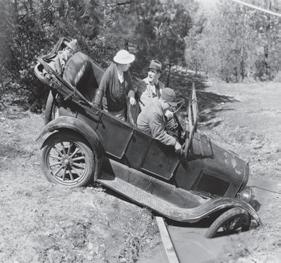
Step 1: talking about vehicles and road infrastructure
Step 2: using prepositions of place and movement
check out: reporting an accident trace your steps
1 Discuss these questions.
a Do you know what a dash cam is? Why do people have them?
b Have you ever witnessed a (car) accident? What happened?
2 Look at the pictures and predict what will (probably / surely / certainly) happen next. Choose one prediction for each picture.
Video 1 lorry

What will happen next?
The dash cam car will probably hit the white car on the right which is trying to join the traffic.
The white car on the right could crash into the lorries parked at the right side of the road.
A moped could cross the road.
My prediction:
Video 2 pedestrians

Video 3

What will happen next?
The white car will certainly crash into the lorry.
The black car on the right will probably try to avoid the pedestrians and will drive into a lamp post.
My prediction:
What will happen next?
Maybe a van will overtake the white car and crash into an oncoming lorry.
The white car will probably slip, roll over and end up in the ditch.
The car with the dash cam may change lanes and hit the white car.
My prediction:
3 Watch the video to check your predictions. watching
1 Watch the video. Connect each accident in the video to the correct descriptions of the eye witnesses. watching
A bus reversed into our office this morning.
A man drove his car into the ditch because an oncoming car came at him as it was overtaking a bus, and he wanted to avoid a head-on collision.
The motorcyclist fell when a car changed lanes at the very last second and cut him off.
The scooter had to brake for a pedestrian at the pedestrian crossing and drove into a bollard.
A car turned left at a junction but did not give way to the motorbike that intended to go straight ahead.
A dad and his son went racing in their ATV, but the dad’s ATV overturned.

The driver of that pick-up truck lost control of the steering wheel and went right through the crash barrier.
The moped drove full throttle into a trailer.
A car slowed down at the junction and drove into a motorbike that was waiting to cross the road.
A lorry started skidding, but the driver steered his truck in between two lampposts and managed to stay on the road anyway.
On the motorway a lorry lost its roof and its load when it was trying to drive under a bridge that was too low.
The bus hit a car as it was leaving the roundabout.











2 Write down all the types of transportation mentioned in exercise 1.












3 Fill in these action verbs (from exercise 1) in the story below. Make sure you use the correct tense or form of the verb. Choose from the list below.
to avoid – to brake – to change lanes – to crash into something – to drift –to drive full throttle – to drop off – to give way – to knock over – to merge into traffic –to go straight ahead – to overtake – to overturn – to reverse – to skid
Once upon a time in the bustling city of Zanyville, there was a driver named Benny who had a knack for turning every car ride into a comedy of errors. Benny's friends always said that getting into a car with him was like strapping into a rollercoaster without a seatbelt
One sunny morning, Benny hopped into his trusty old car, which he lovingly referred to
as ‘The Beast’. The Beast was a clunky, rusted relic that had seen better days, but Benny was determined to take it on an epic adventure.
As Benny pulled out of his driveway, he decided (1) down the narrow suburban streets risking his 15th ticket for speeding that year. The engine roared like an angry bear, and his neighbours watched in disbelief as he sped by. At the crossing he (2) without looking to the left or right. Benny's first challenge of the day was to (3) his pet parrot, Polly, at the local bird spa.
As he approached a roundabout, Benny decided (4) around it just for fun. He spun the steering wheel with all his might, and The Beast started (5). The car spun and twirled like a figure skater on crack, narrowly (6) a collision with a lamppost Benny's heart raced as he (7) on the motorway, which was like a giant, roaring river of cars. He was determined (8) every vehicle in his path. He weaved in and out of lanes, causing other drivers to slam on their brakes and (9).
Benny honked his horn triumphantly as he passed each car.
But Benny's ego got the best of him, and he attempted to (10) without checking his blind spot. As he veered to the right, he (11) a giant inflatable advertising balloon shaped like a chicken, causing it to (12) and roll across the motorway.
Panicking, Benny (13) and hit the gas pedal with all his might. The Beast rocketed backward, narrowly missing a group of confused pedestrians who were waiting at a bus stop. Benny finally managed to get back on the road, but not before (14) a postbox and a traffic cone. When he pulled into the car park, he saw it was pretty full. He didn't bother finding a parking spot; instead, he just stopped abruptly, causing the car behind him (15) suddenly.
With his heart pounding, Benny finally arrived at the bird spa to drop off Polly. He pulled up to the kerb and gave her a quick peck on the beak before she fluttered away to enjoy her spa day.
As Benny drove away, he couldn't help but laugh at the absurdity of his adventure. He realised that maybe it was time to retire The Beast and invest in a safer, more sensible car. But until then, Zanyville would continue to be entertained by Benny and his wild antics on the road.
4 Put the words in bold from exercise 3 in the correct box. Road infrastructure
5 Connect the phrasal verbs from column A to the matching situations, synonyms or types of vehicles in column B.
1to back up
2to buckle up
3to fill your car up
Ato brake or to lower your speed
Bto move into the traffic flow
Cto move out of the traffic flow and stop, to drive the car to the side of the road
4to load something upDto come to a halt, to stop
5to slow down
E to reverse
6to block someone inFto move suddenly in front of another vehicle, leaving little space between the two vehicles
7to pick someone upGto put on your seat belt
8to pull out
9to pull in / over
10to pull up
11to drop off
12to drive off
13to cut in / off
14to break down
15to show off
Hto drive away
Ito put something in a car, van, truck / a lorry
Jto refuel your car at a petrol station
Kto park too close to the car behind or in front of you
Lto let someone out of your car at their desired location
Mto let someone into your vehicle
Nto try to make a big impression
Oto stop working / driving 123456789101112131415
6 Fill in the correct form of these phrasal verbs in the sentences below.
7 Watch the video about bike messenger Cooper Ray in New York. Which dangerous or illegal things did you see the bike messenger do in the video? ignoring red traffic lights riding on the pavement overtaking a bus that indicated it was going to turn left riding on the hard shoulder jumping over the guardrail just missing pedestrians on a zebra crossing closely passing a police vehicle at a junction driving around a roundabout in the wrong direction overtaking cars and buses on the left and right of him in a traffic jam changing lanes to manoeuvre through a traffic jam watching to block someone in – to buckle up – to break down – to cut off – to drive off – to drop off –to fill your car up – to pick up – to pull out – to pull in – to pull over – to pull up – to slow down
1 Come on, everybody. Put on your seat belts!
2 When he arrived at his car, he saw that he was completely : the car in front and the car behind him had both left exactly 10 centimetres to manoeuvre.
3 He at the side of the road and waited for his friend to leave the bank.
4 I need to catch the 8.45 train to London. Can you me at the station on your way to work? And can you me again at 6 tonight?
5 It looked as if he would be stuck in traffic all day, so he and drove back home.
6 She saw the ambulance coming up behind her and 7 ! You’re going way too fast here!
8 The van suddenly changed lanes in front of me, without using his indicator and leaving very little space between him and me. I hate it when cars me like that.
9 He outside his ex’s house every evening and stayed there until the lights went out. Then he started the engine and with screeching tires.
10 If you with diesel instead of petrol, your engine will
8 Link these words to the correct number in the drawing. a bridge – a crash barrier / a guardrail – a ditch – a hard shoulder – a junction – a kerb –a lamppost – a median barrier – a motorway – a pavement – a railway crossing –a road verge – a roundabout – a T-junction – a zebra / pedestrian crossing

9 Write the numbers next to the correct car parts in the list.
bonnet headlight indicator
boot hubcap tyre
brake light
door mirror window
bumper number plate windscreen
door petrol tank windscreen wiper
door handle rearview mirror
body work roof
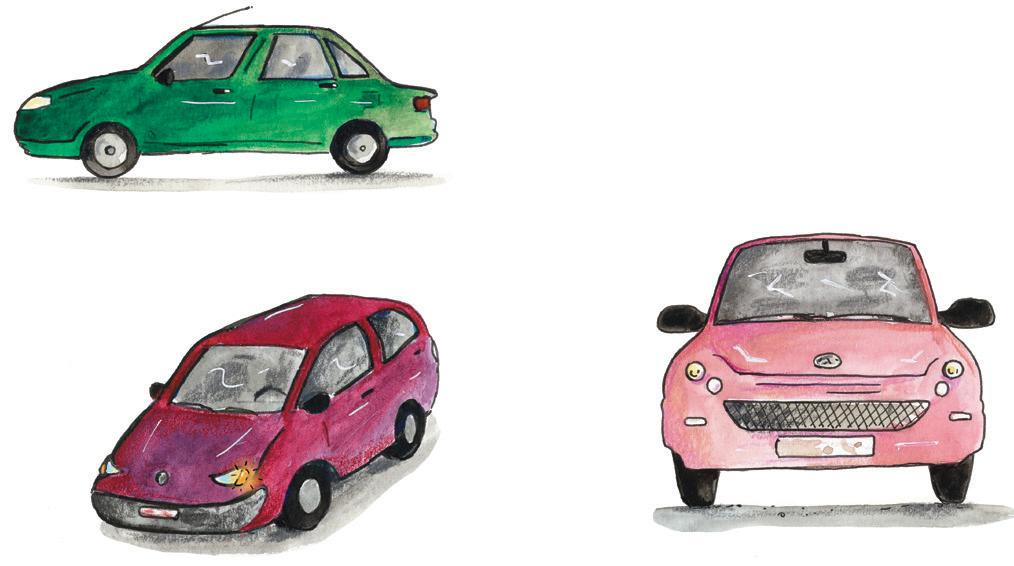

10 There are some differences between British and American English when it comes to car vocabulary. Write the British English words for the
11 Combine adjectives and car parts. Write the combination of adjective and noun under the correct picture. broken – busted – cracked – damaged – dented – deployed – flat – scratched – shattered airbags – body work – bonnet – bumper – car mirror – headlight – tyre – wheels – windscreen




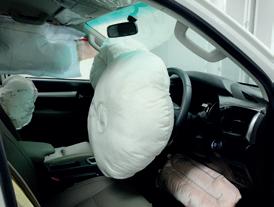




12 Team up with a partner. Think about what your dream car would look like. Name 5 items to describe that car and generate a drawing with the help of a (free) AI image generator. Add items to pimp your car, e.g. spoilers, speakers, and crazy colours, etc. Then let your partner guess what your 5 prompts in AI were.


1 Read the information about If I Stay and discuss these questions.
a Have you read this book or seen the film? If so, what did you think of it?
b If you haven't read the book or seen the film, would you be interested in it? Why (not)?
c What are some of the things that Mia will have to deal with, in your opinion?
If I Stay is a young adult novel by Gayle Forman published in 2009. The story follows 17-year-old Mia Hall as she deals with the aftermath of a car accident involving her family. Mia finds herself in a coma and the book follows her life through a series of flashbacks. In 2014 it was made into a film starring Chloë Grace Moretz as Mia.
Source: en.wikipedia.org
2 Read the beginning of If I Stay by Gayle Forman and answer the questions.

a Mark the part of the text in which the accident is described. Mark the damages in another colour.
b What were the weather conditions like?
c What kind of road are they on?
d What other vehicles were involved in the accident?
e How many victims are there? Who are they?
f Describe what happened in your own words.
g Which sentence best summarises the damages to the car?
There’s a scratch on the bumper. The headlights are busted. The bonnet is dented.
The back of the car is wrecked. The car is total loss / a write-off.
Once the musical selections have been made, we are off. The road has some patches of snow, but mostly it’s just wet. But this is Oregon. The roads are always wet. Mom used to joke that it was when the road was dry that people ran into trouble. “They get cocky, throw caution to the wind, drive like ass**les. The cops have a field day doling out speeding tickets.”
I lean my head against the car window, watching the scenery zip by, a tableau of dark green fir trees dotted with snow, wispy strands of white fog, and heavy gray storm clouds up above. It’s so warm in the car that the windows keep fogging up, and I draw little squiggles in the condensation.
When the news is over, we turn to the classical station. I hear the first few bars of Beethoven’s Cello Sonata no. 3, which was the very piece I was supposed to be working on this afternoon. It feels like some kind of cosmic coincidence. I concentrate on the notes, imagining myself playing, feeling grateful for this chance to practice, happy to be in a warm car with my sonata and my family. I close my eyes.
You wouldn’t expect the radio to work afterward. But it does.
The car is eviscerated. The impact of a four-ton pickup truck going sixty miles an hour plowing straight into the passenger side had the force of an atom bomb. It tore off the doors, sent the front-side passenger seat through the driver’s-side window. It flipped the chassis, bouncing it across the road and ripped the engine apart as if it were no stronger than a spiderweb. It tossed wheels and hubcaps deep into the forest. It ignited bits of the gas tank, so that now tiny flames lap at the wet road.
And there was so much noise. A symphony of grinding, a chorus of popping, an aria of exploding, and finally, the sad clapping of hard metal cutting into soft trees. Then it went quiet, except for this: Beethoven’s Cello Sonata no. 3, still playing. The car radio somehow still is attached to a battery and so Beethoven is broadcasting into the once-again tranquil February morning.
At first I figure everything is fine. For one, I can still hear the Beethoven. Then there’s the fact that I am standing here in a ditch on the side of the road. When I look down, the jean skirt, cardigan sweater, and the black boots I put on this morning all look the same as they did when we left the house.
I climb up the embankment to get a better look at the car. It isn’t even a car anymore. It’s a metal skeleton, without seats, without passengers. Which means the rest of my family must have been thrown from the car like me. I brush off my hands onto my skirt and walk into the road to find them.
I see Dad first. Even from several feet away, I can make out the protrusion of the pipe in his jacket pocket. “Dad,” I call, but as I walk toward him, the pavement grows slick and there are gray chunks of what looks like cauliflower. I know what I’m seeing right away but it somehow does not immediately connect back to my father. What springs into my mind are those news reports about tornadoes or fires, how they’ll ravage one house but leave the one next door intact. Pieces of my father’s brain are on the asphalt. But his pipe is in his left breast pocket.
I find Mom next. There’s almost no blood on her, but her lips are already blue and the whites of her eyes are completely red, like a ghoul from a low-budget monster movie. She seems totally unreal. And it is the sight of her looking like some preposterous zombie that sends a hummingbird of panic ricocheting through me.
I need to find Teddy! Where is he? I spin around, suddenly frantic, like the time I lost him for ten minutes at the grocery store. I’d been convinced he’d been kidnapped. Of course, it had turned out that he’d wandered over to inspect the candy aisle. When I found him, I hadn’t been sure whether to hug him or yell at him.
I run back toward the ditch where I came from and I see a hand sticking out. “Teddy! I’m right here!” I call. “Reach up. I’ll pull you out.” But when I get closer, I see the metal glint of a silver bracelet with tiny cello and guitar charms. Adam gave it to me for my seventeenth birthday. It’s my bracelet. I was wearing it this morning. I look down at my wrist. I’m still wearing it now.
I edge closer and now I know that it’s not Teddy lying there. It’s me. The blood from my chest has seeped through my shirt, skirt, and sweater, and is now pooling like paint drops on the virgin snow. One of my legs is askew, the skin and muscle peeled away so that I can see white streaks of bone. My eyes are closed, and my dark brown hair is wet and rusty with blood.
I spin away. This isn’t right. This cannot be happening. We are a family, going on a drive. This isn’t real. I must have fallen asleep in the car. No! Stop. Please stop. Please wake up! I scream into the chilly air. It’s cold. My breath should smoke. It doesn’t. I stare down at my wrist, the one that looks fine, untouched by blood and gore, and I pinch as hard as I can.
I don’t feel a thing.
I have had nightmares before—falling nightmares, playing-a-cello-recital-withoutknowing-the-music nightmares, breakup-with-Adam nightmares—but I have always been able to command myself to open my eyes, to lift my head from the pillow, to halt the horror movie playing behind my closed lids. I try again. Wake up! I scream. Wake up! Wakeupwakeupwakeup! But I can’t. I don’t.
Then I hear something. It’s the music. I can still hear the music. So I concentrate on that. I finger the notes of Beethoven’s Cello Sonata no. 3 with my hands, as I often do when I listen to pieces I am working on. Adam calls it “air cello.” He’s always asking me if one day we can play a duet, him on air guitar, me on air cello. “When we’re done, we can thrash our air instruments,” he jokes. “You know you want to.”
I play, just focusing on that, until the last bit of life in the car dies, and the music goes with it.
It isn’t long after that the sirens come.
Source: If I Stay, Gayle Forman
askew: not in a straight position embankment: a wall of earth or stone built to prevent a river flooding an area to eviscerate: to remove the contents of something frantic: fast and nervous, disordered to ignite: (cause) to catch fire protrusion: something that bulges out, a bulge or bump
3 After reading this introduction, would you be interested in reading the rest of the novel? Why (not)?
4 Use the information from the extract and your answers to complete the news report about the accident Mia was in.
[write a headline]
A family of 4 this morning when their car
Dennis and Kathleen Hall and their son Theodore (known to them as Teddy) .
Daughter Mia
Police said the accident occurred as .
Police said the Hall car was
Damage to the truck is The driver
5 Listen to these people who describe a car accident they witnessed. Fill in the prepositions you hear.
1 I was driving the suburbs when a taxi overtook me and hit the car me on its left side. Then the taxi drove a lamp post.
2 We were driving town when we noticed a car dangerously overtaking the car us. Then the driver obviously lost control over his vehicle and he ended up going headlong the grass the road.
3 I was driving on a straight two-lane road in the countryside when I noticed that the lorry me started to slowly move the middle the road. Suddenly it was hit a lorry coming the opposite direction. Debris was shattered me, my car started skidding and I ended up a hard shoulder the road.
4 I was driving a quiet neighbourhood our town. There was literally nobody the road, when all of a sudden a blue car came the right. It was obvious that he was going too fast, but I guess I also made a mistake by not giving him rightof-way.
5 I was driving this busy road. I had just driven the bridge and I was waiting the traffic lights of this busy junction when all of a sudden there was this really speedy car coming the left. First it hit another car the oncoming traffic, which ended up the car right me. The speedy car mounted the kerb and hit the car me.
Preposition of place and movement are used to say where things are or where things are going. Check the Summary if you still experience difficulties using these prepositions. See p. 313
6 Read this report about a car crash in London. a Fill in the right preposition in the text. Choose from the following prepositions: along – at – for – in (3x) – into – next to – on (2x) – past – to (2x)
A car ploughed into 3 boys as they were walking a party. Flowers have been lain the scene in West London where the collision happened yesterday evening. The police have arrested a 28-year-old man who was the car. From the scene Olivia Kinsley reports.
a few minutes this afternoon the police closed the road where the crash happened for friends and family to say goodbye to 3 clearly much loved boys. They were said to have been walking a 16th birthday party just a few hundred metres away when the crash happened.
An eyewitness reports: 'Two minutes, that's when the ambulance arrived and the boys started to unload the ambulance: everything that was in there, first aid kits, everything. I was in another car, the passenger seat, and had the window down. A boy was standing me the pavement and he was the phone to – I think it was his mum or his dad – and he was saying ‘Oh, my friends are dead’, he was crying, he was like, he couldn’t even speak because he was so upset.'
The car involved was a black Audi A5. The police arrested a 28-year old man, but say another man was reportedly also the vehicle.
This is a busy fast moving road. The boys were walking a bus stop which is a slight bend. Police markings suggest that the car mounted the kerb, travelled around 60 metres the pavement and then crashed a lamp post and a wall.
A security guard who works nearby told us it’s a dangerous road. ‘I mean, people just drive like lunatics, you know. Bad weather, good weather, they don’t care. They take that 60 mile an hour speed limit to the extreme.’ After releasing the balloons, the crowd held a minute silence. This is a time when they will need one another’s support.
b Watch the report to check your answers. watching
7 Watch the first 5 crashes and mark the damages that seem most likely to you under each picture. Mark the words that indicate how heavily the vehicles are damaged.
1

2

3

4

5

8 Rank
The car doors of the white car have some scratches on the right.
The white car has lost a wheel.
The front of the white car is a total loss / write off.
The left side of the nose of the white car is dented. The right side of the white car is heavily damaged. The car that overturned is total loss.
The white car in front has some minor scratches on the left.
The trunk of the white car is heavily damaged.
The car that caused the accident is a total loss / write off.
The orange lorry has lost its wheels.
The debris of the white and red lorry is scattered all over.
The orange lorry has caught fire and will be completely charred.
The car that flipped over is a write off / total loss. The bonnet of the white car is heavily damaged.
The car with the dash cam is damaged beyond repair.
1
3
I was driving down a quiet street when all of a sudden I saw a group of tourists cross the roads on their Segways.
I was riding my moped and suddenly, right in front of me, a pedestrian crossed the road so I had to dodge him and I fell.
5
7
I was taking a nap on the street when I heard the screeching brakes of a car.
I was crossing a busy road with my bike when a grey hatchback hit me.
I was leaving my friend’s house when I saw my van was on fire.
My friend and I were doing tricks on our quads when the police caught us.
I was driving on the motorway when I fell asleep and ended up with my car in the wasteland next to the road.
I was driving in reverse when a motorcycle hit the side of my car. I honestly hadn’t seen it coming.
I was driving my car down a quiet country road when all of a sudden a deer jumped in front of my wheels, so I lost control of my vehicle. 9






2
4
6
8



2 Look at the sentence below and answer the questions.
a Mark the verb forms in the sentence.
e.g. Terry was parking his brand-new car in front of a noodle shop, when all of a sudden a giant Nike football crashed into his car.
b Which 2 tenses are they?
c Do you remember when to use these 2 tenses? Fill in the grammar box below.
Tense 1:
= (shorter or single) completed actions in the past
e.g. A weird object destroyed Terry's new car.
Keywords:
Tense 2:
= longer actions going on in the past.
e.g. Terry was enjoying all the features of his new car.
Keywords:
Combine the 2 tenses if you want to make clear something happened while you were in the middle of a longer action going on. This longer action was happening
e.g. Terry was parking his car in front of the noodle shop, when a giant Nike football crashed into it.

3 Make sentences describing what went wrong. Use the past simple and past continuous correctly.

Gerry (to wait) for his wife at the car park when all of a sudden a cactus (to fall) on his car.

Deidre (to leave) the car park when she (to turn around) and (to see) her car roll off towards the water.

Mark (to text) his girlfriend when he accidentaly (to drive) into the entrance of a subway station.

Grant (to drive) down a muddy road when suddenly his car (to slip) and he (to end up) upside down in a ditch.

The Larson family (to spot) wildlife from their 4-wheel-drive when an elephant (to attack) them.

Ben and Aaron (to take) a picture when all of a sudden the car they (to work) on (to come) down. 1 2 3 4 5 6
4 Look at the drawings on the European accident forms. What happened and what damage will those cars most likely have?
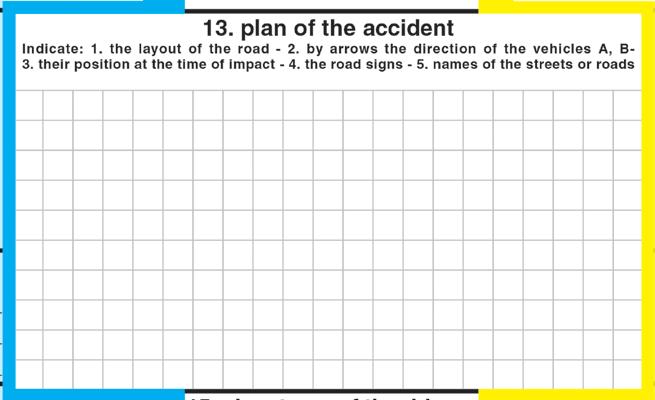
What happened?
Damages

What happened?
Damages

What happened?
Damages
5 Look at the driving licences below. Write the correct number next to each item. How different is this UK licence to the European driving licence?
date from which the licence can be used expiry date
driver and Vehicle Agency, the official agency that delivers the driving licence home address
date of birth (DOB) and place of birth (POB)
first name signature surname licence number licence categories
6 Team up with a classmate. Your teacher will give you an accident form. Try to figure out what happened and describe the accident to each other.
CHECK 3, p. 333
Prepositions of place and movement
1 Prepositions of place USE
To say where things are.













above below under behind in front of next to beside by to the left of on the left to the right of on the right between in inside near on on top of outside among opposite against



To show movement from one place to another. across along down from ... to ... into off onto over out of past through towards up

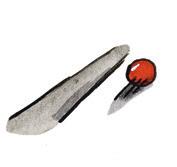











Past simple and past continuous

SubjectPositive (+)*
1st p. sing.
2nd p. sing.
3rd p. sing.
1st p. plur.
2nd p. plur.
3rd p. plur.
Rule:
I crashed You crashed He / She crashed We crashed You crashed They crashed
Subject + base form of the verb + (e)d
Negative (-)
I didn’t crash You didn’t crash He / She didn’t crash We didn’t crash You didn’t crash They didn’t crash
Subject + didn’t / did not + base form of the verb
I was driving down the street when all of a sudden that tree hit my car.
Questions (?)
Did I crash?
Did you crash?
Did he / she crash?
Did we crash?
Did you crash? Did they crash?
Did + subject + base form of the verb?
* Irregular verbs: Mind the irregular verbs in the positive form. You have to learn them by heart (see ).
Keep in mind:
– Mind the spelling of regular verbs like ‘try’ (tried), ‘stop’ (stopped), ‘arrive’ (arrived), ‘travel’ (travelled) in the positive form.
– In the negative, the auxiliary can have a long or short form:
e.g. He didn’t visit = He did not visit.
– 'To be' is a special verb: there is no ‘did (not)’ for negative sentences and questions. e.g. The car wasn't new.
e.g. Were you happy with the service you received?
(Shorter or single) completed actions in the past.
e.g. He crashed his car in January 2017.
SubjectPositive (+)
1st p. sing.
2nd p. sing.
3rd p. sing.
1st p. plur.
2nd p. plur.
3rd p. plur.
I was texting You were texting He was texting We were texting You were texting They were texting
Rule: Subject + was / were + ing-form of the verb
Negative (-)
I wasn’t texting You weren’t texting It wasn’t texting We weren’t texting You weren’t texting They weren’t texting
Subject + wasn’t (was not) / weren’t (were not) + ing-form of the verb
– Longer actions going on in the past.
Questions (?)
Was I texting?
Were you texting?
Was it texting?
Were we texting?
Were you texting?
Were they texting?
Was / were + subject + ing-form of the verb
– When we talk about 2 (past) actions that were happening at the same time.
Keywords:
'while' + past continuous
e.g. Mark was driving while his girlfriend was reading a book in the backseat.
'when' + past simple
e.g. Mark was checking his messages when a deer hit the car.
Combine the 2 tenses when an action that takes longer (past continuous) is interrupted by another action (past simple).
e.g. I was driving down the street when all of a sudden that tree hit my car. was driving past continuous hit past simple
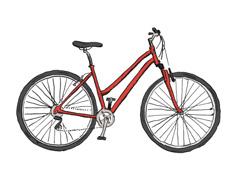
































driver
driving
passenger
pedestrian
public
traffic
Word Translation Your notes ACTIONS
to back up achteruitrijden to brake remmen to break down kapotgaan, in panne vallen to block someone iniemand insluiten to buckle up je gordel vastklikken to change lanes van rijvak veranderen to crash into somethingergens tegen rijden to cut in / off iemand de pas afsnijden to dodge uitwijken to drift opzettelijk slippen to drive full throttlevolle gas geven to drive off wegrijden to drop off iemand ergens heen brengen to fill your car up tanken to give way voorrang geven to go straight aheadrechtdoor rijden to hit something / someone tegen iets / iemand botsen to join the traffic invoegen in het verkeer to knock over omverrijden to load something upiets opladen to merge into trafficinvoegen in het verkeer to overtake voorbijsteken to overturn overkop gaan to park your car parkeren to pick someone upiemand oppikken to pull in / over aan de kant gaan staan to pull out je in het verkeer begeven to pull up halt houden to reverse achteruitrijden to show off somethingpronken met to skid slippen to slow down vertragen to steer sturen to veer to uitwijken
ACCIDENTS AND DAMAGES to avoid a collision een botsing voorkomen
Word Translation Your notes blind spot blinde hoek
to be broken stuk zijn
busted kapot, stuk to catch fire vuur vatten
to be charred verbrand zijn
a collision botsing, aanrijding a head-on collisionfrontale botsing a side collision zijaanrijding
a rear-end collisionachteraanrijding to be cracked gebarsten zijn a crack barst
to be (heavily) damaged(ernstig) beschadigd zijn
to be damaged beyond repair niet meer te repareren zijn
to be dented ingedeukt zijn
a dent deuk
deployed airbags opengeklapte airbags
a flat tyre een lekke band
to lose a wheel een wiel verliezen to be scratched bekrast zijn a scratch kras
minor scratches kleine krasjes
a shattered windscreen / window / rear window een verbrijzelde voorruit / ruit / achterruit
to be total loss niet meer te repareren zijn
DRIVING AND DRIVING LICENCE
date of birth (DOB)geboortedatum
first name voornaam
home address adres
licence number nummer van je rijbewijs
licence plate nummerplaat
place of birth (POB)geboorteplaats
signature handtekening
surname familienaam
Check 1 Talking about vehicles and road infrastructure
1 Check your car and road vocabulary.
a Look at these pimped vehicles and describe what you see. 1 2 4 3 5 6






an invisible
b Draw a map of your neighbourhood. Be as detailed as you can and label at least 5 items that specifically refer to the road infrastructure.
2








c Fill in the correct word.
1 Stevie a lamppost when he was (driving backwards).
2 He to avoid a with the car in front of him.
3 The road was slippery and he started to and a pedestrian.
3 Check your phrasal verbs.
a Fill in the correct phrasal verb. Yesterday was not my lucky day! I was on my way to work, when I noticed I was running out of petrol. So I (1) at the petrol station to (2) my car, but I accidently put the wrong fuel in my tank, so my car (3) and I had to ask my neighbour if she could come to me (4).
When she me (5) at work, I stumbled and lost my shoe down the drain.
b Write sentences using a correct phrasal verb. Look at the actions in the pictures. Say under which circumstances they could be dangerous / irritating / annoying.




Score < 7 ≥ 7
Next exercise ex. 4 ex. 5
4 Practise road vocabulary and phrasal verbs.
a Match each phrasal verb with its opposite / antonym. There are several possible combinations.
1give way
Adrive full throttle
2brake Bpick up
3slow down
Ccut someone off
4go straight aheadDchange lanes
5drop off E reverse
b Fill in the most common driving mistakes in the text below. Choose from the words below. Conjugate the verbs if necessary.
to brake – to change lanes – to cut off – to drift – to drive full throttle – to give way –to overtake – to slow down – to show off – to skid
Did you know that 99% of all road accidents are caused by human error? The sad truth is that most drivers continue to make the same driving mistakes on the road, oblivious to their faulty driving habits.
Here are some of the most common driving mistakes.
1 Staying in the left lane after (1a)
There’s just something about the lane to the far left that has a magnetic hold on some drivers. Not only do they forget that the lane is specifically for passing and that they must soon move into the travel lane to the right to allow someone else to pass, but they also appear indifferent to the traffic they are blocking behind them. The rule is simple – the lane to the far left is NOT a fast lane, it is the (1b) lane.
2 Stopping abruptly without warning (2) in moving traffic for no obvious reason, is one of the leading causes of accidents on roads and highways. An abrupt decision to stop without forethought or indication is bound to have consequences. You should always be aware of the cars behind you, stopping slowly and carefully, giving other drivers time to react and adjust.
3 Forgetting to use the indicator signals
Using the indicator when (3) or turning a corner is not just driving etiquette – it’s a critical safety feature that informs other motorists of our intentions. (4) other drivers is a recipe for disaster. When drivers beside or behind us are unaware of the changes we are making en route, they are forced to react to our actions without warning, and this is a recipe for accidents. Once you’ve indicated your move and made it, remember to turn off the indicator or else you will be misguiding (and annoying) drivers behind you for an extended period of time.
4 Speeding through an amber light
Some drivers seem to think that an amber light means ‘speed up’, not ‘ ’ (5) and decide to (6) through an amber light. Nearly every collision at an intersection is because someone was speeding through a yellow light or worse still, jumping a red light. Is saving those 90 seconds worth risking your life and those of others?
5 Not stopping at pedestrian / zebra crossings
In many countries drivers risk high fines if they don’t (7) to pedestrians at designated crossings. If there is traffic behind you, turn on your hazard lights to warn them that you have stopped. And if you are approaching a busy intersection, be prepared to have to stop either for the pedestrians or for the cars that have stopped for them.
6 Unnecessary dangerous behaviour
Some drivers are so proud they finally managed to buy the car of their dreams, that they feel the need to constantly (8) just how great that new car is. They like (9) in a parking lot or (10) on slippery patches.
Source: bridgestone-mea.com
Score < 12 ≥ 12
Next exercise
Check 2, p. 328
5 Watch this review of the 2023 Mini Convertible and answer the questions.
a Decide if these statements are true. Correct the false statements.
Statement
1 The Mini Convertible is the best-selling convertible in the world.
2 The presenter says the car is fun to drive.
3 The John Cooper Works (the JCW) can cost up to £38,000.
4 The interior look of the Mini Convertible is super modern.
5 The leg room in the back feels really spacious.
6 The sound is the most exciting part of the car.
7 The JCW Convertible is very soft on bumpy roads. watching
b Write down 3 positives and 2 negatives of this Mini convertible.
c Would you be tempted to buy a Mini convertible if you had the money? Why (not)? Explain your opinion (about 50 words) by referring to the features of the car and your list in exercise b. Check your text when you are done writing.
Checklist: giving your opinion about a car Yes I think soNo
1 Content and structure
• I wrote my opinion in a paragraph of about 50 words.
• I referred to the car's features and the positives and negatives list.
2 Language
• I used the correct vocabulary.
• My sentences were grammatically correct.
• I used correct spelling and punctuation.
Feedback
Score < 17 ≥ 17
Next exercise ex. 4
Check 2, p. 328
Check 2 Using prepositions of place and movement
1 Write a report about your very own pimped car for your car blog!
a Preparation: look at your gorgeous pimped ride! Locate the following items: desk lamp – eyelashes – flag – flowers – flowerpot – polka dot curtains – red heart –Union Jack

b Action: write a blog post in which you describe where the special features of your pimped car are. Write 75 - 100 words. Write at least 1 sentence for every feature mentioned in exercise a, and find 3 other features yourself. Use correct prepositions.
Hello crazy car lovers, Would you like to see my newly pimped ride?
c Reflect on your writing by filling in the checklist.
1 Content
• I wrote 75 - 100 words.
• I described the changes accurately.
2 Language
• I used the correct prepositions.
• I used the correct words.
• My sentences are grammatically correct.
• I used correct spelling and punctuation.
Feedback
2 Read the following sentences about the new Mini Cooper S Convertible Seaside Edition. Choose the correct preposition. Then watch the video to check your answers.
1 If we take a look at the front, we see the logo in / into /around / on the bumper.
2 Another unique feature is the white trim on / around / over the headlights.
3 Inside it has unique badging in / on /over the seat, union jack buttons onto / over / in the rear (…) and the steering wheel with / around / into the Seaside badging.
4 There is a touch screen above / under / with navigation (…) and on / over / in the centre armrest there is a wireless charger.
5 Let’s take a look in / on / over the boot. It has a wind deflector on / over / in its own case. That’s a really nice option. Definitely comes in handy. You just place that above / across / under the rear on / between / behind the driver and passenger’s seat. It certainly cuts down on the amount of wind noise when you’re cruising down the freeway on / with / around the top down.
3 Look at the picture and complete the sentences with the correct prepositions.
1 The thief is coming the shop, the front door.
2 The police motorcycle is the taxi.
3 The taxi is right the policemen.
4 Sanjee is his moped; he’s riding the pavement.
5 Danielle is sitting the taxi driver.
6 Ludo has been hit by the police motorcycle and has bumped his head the lamp post.
7 Little Malik is sitting the pram.
8 The cat is the pavement.
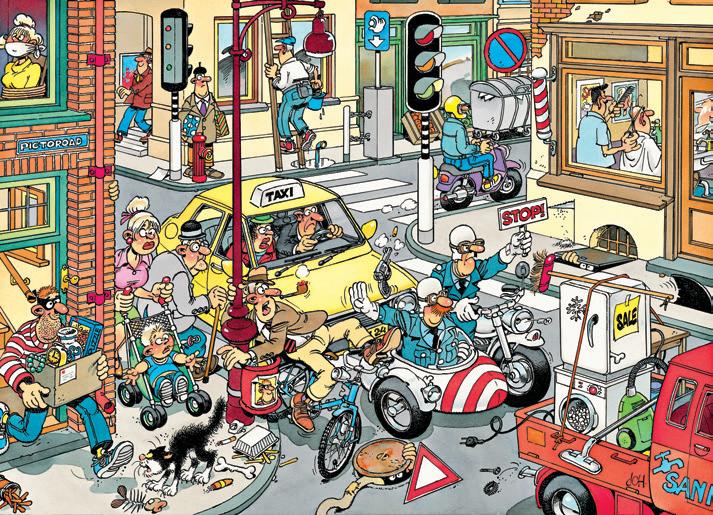
4 Watch the video Human Snake and describe what happens. a Write 10 sentences; 4 have already been done for you.
1 A man’s breakfast tells him to go. 2 He stands up and leaves his flat.

5 Watch the videos about these car sharing services and compare them. Follow this procedure.
a Watch the video about ZipCar.
• Fill in the correct prepositions in the sentences.
A The keys are the dash the steering wheel. They stay the car.

B Walk the car to check for damage.
C Check the mirrors, seat belt and displays before you drive.
D Hold your Zip card the card reader the corner of the windshield.
E Look the car park and find the car you reserved.
• Read the sentences and put them in the right order.
b Watch the video about Drive Now. Answer the questions.
• Where does it operate?
• What is its slogan?
c Compare how ZipCar works with the way Drive Now works.
• Explain both procedures and say which one you prefer and why.
• Make sure that you use prepositions correctly.
• Write 75 – 100 words.
d Reflection: check your comparison by filling in this checklist.
Checklist: comparison ZipCar and Drive Now
1 Content and structure
• I explained how both the Zip Car and Drive Now work.
• Someone who didn’t see the videos will understand how both work.
• I explained which method I prefer and why.
• I wrote 75-100 words.
2 Language
• I used the correct prepositions.
• I used the correct vocabulary.
• My sentences were grammatically correct.
• I used correct spelling and punctuation.
Feedback Score
Next exercise ex. 4 Check 3, p. 333
Check 3 Describing what happened using past tenses
1 Describe the accidents as if you were the passenger of the dash cam car. a Preparation: watch the accidents in the video. Make a few notes about each accident.
Accident 1:
Accident 2: watching
Accident 3:
b Choose one of the 3 accidents and describe what happened in about 50 words. Use the past simple and the past continuous correctly. You can use these words and / or expressions. to bump into – to crash – to drive – fast lane – to flip over – to hit – to land on the roof – to race – to speed – to start braking – to swerve – traffic jam
c Make a drawing of the situation on the accident statement form below.
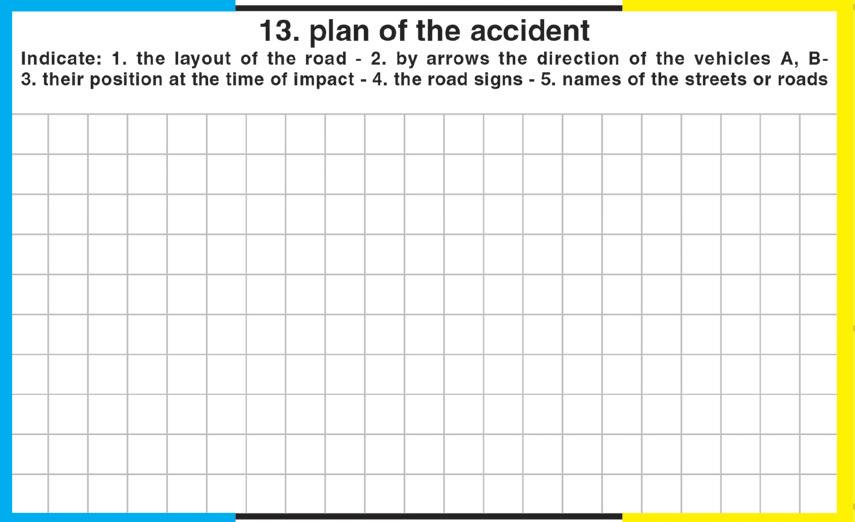
d Reflection: check your writing by filling in the checklist.
Checklist: describing an accident Yes I think soNo
1 Content and structure
• I wrote 1 paragraph of about 50 words.
• I described the accident accurately.
• Whoever reads my text can understand what I wrote and can imagine what the accident was like.
• My drawing represents the situation accurately.
2 Language
• I used the correct vocabulary.
• I used all the words at least once.
• I used the past simple and continuous correctly.
• I used correct spelling and punctuation.
Feedback
2 Fill in the verbs in the past simple or continuous.



I was doing 80 mph when I suddenly (to brake) because some ducks (to cross) the road. The Mercedes behind me obviously (not to see) that in time, so he literally (to run) over me. 1 2 3 4

Gerry (to walk) around the car park when all of a sudden he (to notice) one of the cars was parked upside down.
We (to drive) on the motorway when all of a sudden the lorry in front of us (to slip) and it (to roll) over on its side.
Rachel (to leave) the house when she (to turn around) and (to see) an old pickup truck that (to hang) in a tree. She’s still wondering how the truck (to end up) there.


Mark (to text) his girlfriend when he accidentaly (to drive) through a wall and (to end up) in the entrance of a subway station.
Ambrose (to overtake) a white minivan, when all of a sudden he (to lose) control of his vehicle and (to drive) up the crash barrier.
3 There was an accident, but the driver who had to explain the situation to the police doesn't speak English. This is literally what he said. Make good sentences with each set of words.
1 I / to drive / on the motorway / to see / a beautiful girl / to wave at me
2 I / to stop / my lorry / to ask / why / she / to wave
3 She / to run / into the bushes / and / I / to be puzzled / but / I / to decide / to drive on
4 I / to think / still / about the girl / when / the car in front of me / suddenly / to stop
5 I / not / to notice / in time / there / to be / a traffic jam / so / I / to hit / the back of the car
6 When / I / to try / to get out of the lorry / I / to see / that beautiful girl / again
Score < 12 ≥ 12
Next exercise All done!
4 Mental dictation: listen to a man who describes an accident.
a Try to imagine what the situation is like.
b Then watch the video to check if what you thought was right. How right were you on a scale of 5?
Score < 3
≥ 3
Next exercise All done!
5 Choose your favourite road safety video and explain it to a partner.
a Preparation: work with a partner. There are 2 sets of ads. Who will watch which set?
• Make a few notes about the different ads you see: My notes:
• Decide which of the ads you like the best and why.
b Action: describe your favourite ad to your partner. Then, show your favourite ad to your partner. Did he / she think you described the action accurately?
c Finally reflect on your speaking task by filling in this checklist.
Checklist: talking about your favourite ad Yes I think soNo
1 Content and structure
• I made good notes so I knew what to say.
• I chose my favourite ad from the set.
• I described my ad accurately.
• My partner understood what I said and could imagine what the ad was like.
2 Language
• I used the correct vocabulary.
• I used correct grammar.
• I paid attention to my pronunciation.
done!
6 Watch the video about self-driving cars and answer the questions.
a Name 3 disadvantages of the self-driving cars. watching
b What about you? Would you be interested in a driverless car? Explain your opinion (about 50 words). Refer to the advantages and disadvantages in your text.
c Reflect on your task by filling in the checklist.
Checklist: opinion about driverless cars
1 Content and structure
• I wrote about 50 words.
• My opinion about self-driving cars is clear.
• I referred to the advantages and disadvantages from the video.
2 Language
• I used the correct vocabulary.
• I used correct grammar.
• I used correct spelling and punctuation.
Feedback
Score < 13 ≥ 13
Next exercise ex. 4 All done!
You will watch a video about a car accident and report the accident using the special European accident statement form.
1 Team up with a classmate. Decide who is student A and who is student B.
– Student A watches video 1: in this video car A is the white Nissan, car B is the parked Audi. You are the driver of the Audi.
– Student B watches video 2: in this video car A is the black car, car B is the white van. You are the driver of the black car.
2 Use your own data or invent data to fill in the driving licence.
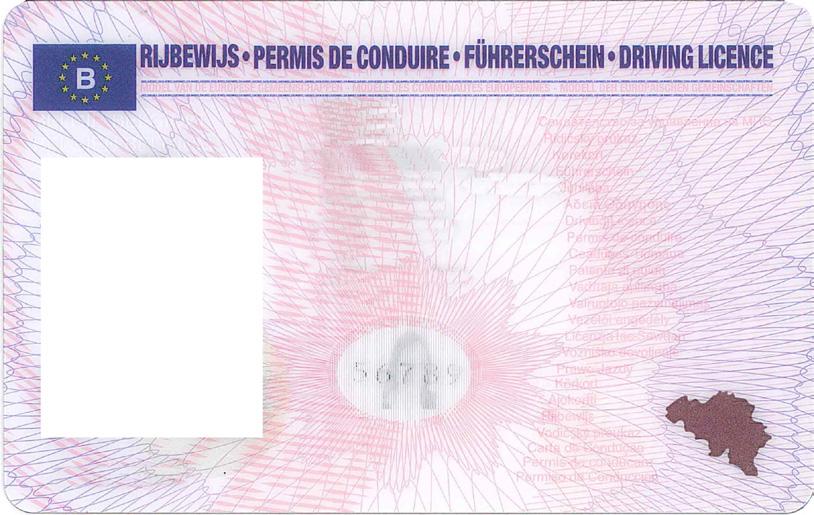
3 Watch the accident in the video and make a few notes about what happened. Use past tenses correctly. watching
Action
4 Fill out the accident statement form you will get from your teacher. 5 Explain what happened.
a Student A explains to student B what happened. In this situation, student A is the driver who was in an accident and student B is a police officer.
b As the police officer, you have to go through the following questions:
What happened exactly? (You need detailed information.)
Who was involved in the accident?
What was the situation before the accident?
What happened then?
What is the result?
c If you are the police officer, make sure that you ask the driver follow-up questions. Ask for relevant details. Ask for further explanation if the situation isn’t totally clear to you. Start and finish the conversation appropriately.
d Switch roles afterwards.
6 Reflect on your task by filling in this checklist.
Checklist: reporting an accident Yes I think soNo
1 Preparation
• I watched the video and made accurate notes.
2 Content and structure
• I filled in the accident statement form accurately.
• My drawing was accurate.
• I described the accident accurately.
• I started and ended the conversation appropriately.
• I asked and answered all questions.
• I asked relevant follow-up questions (as a police officer).
3 Language
• I described the accident accurately.
• I used the correct words.
• I used correct prepositions.
• I used the past simple and past continuous correctly.
• I paid attention to my pronunciation.
Feedback
Trace your steps on diddit.